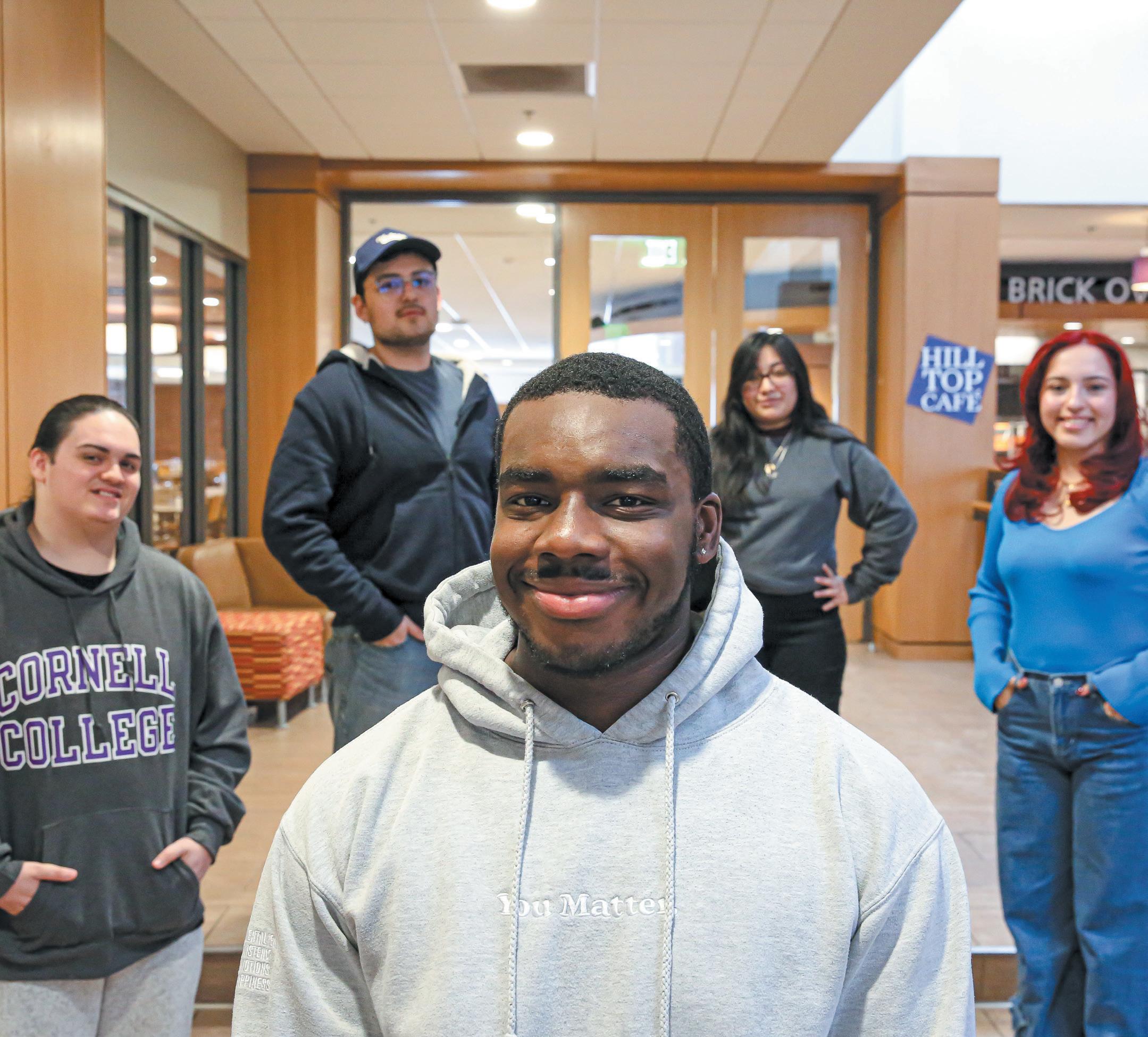
“We’re not here for ourselves. We’re a Posse.”
No. 2 Volume 47 / SPRING 2024
Cornell Report
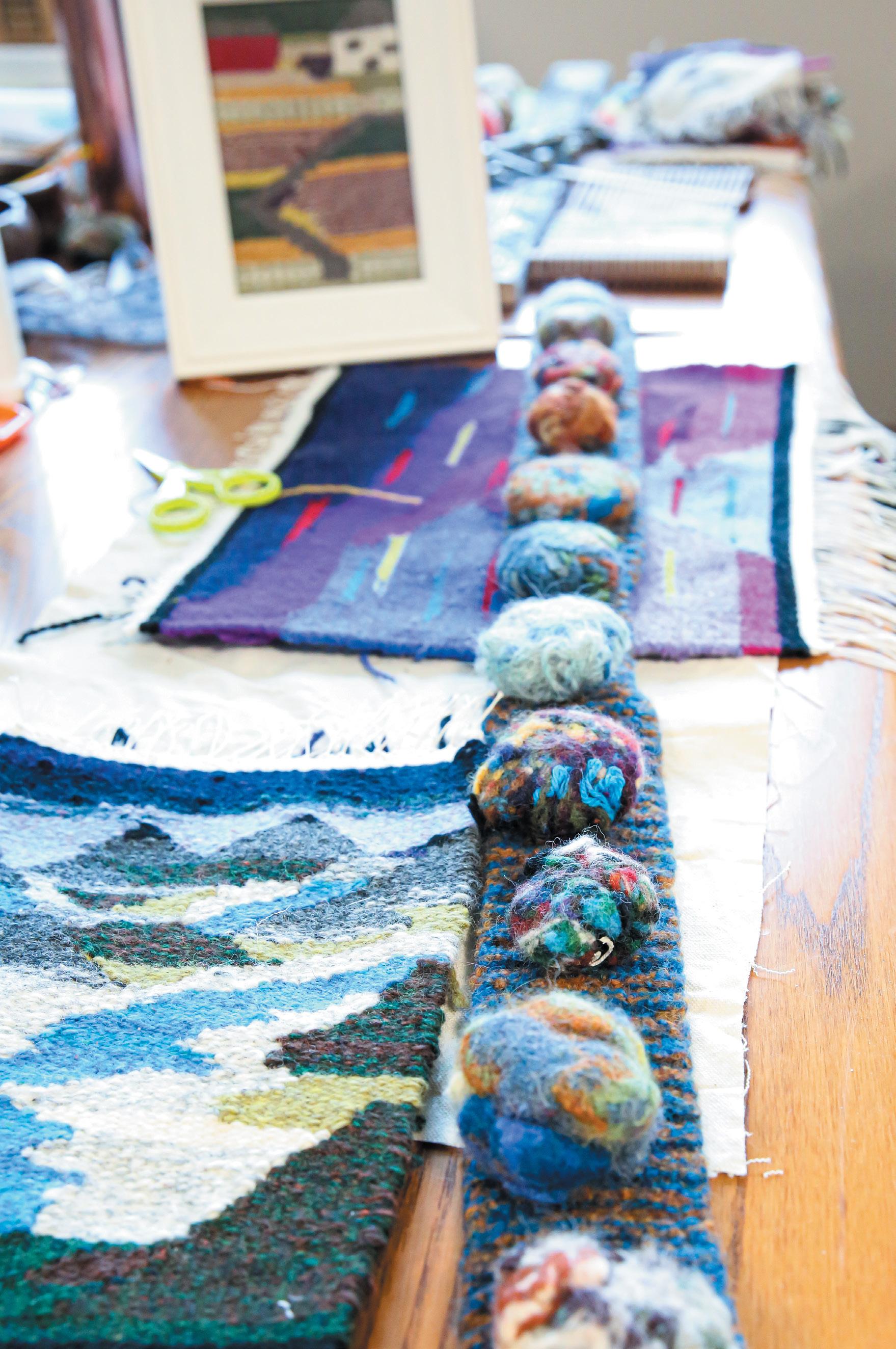
LIFE AFTER CORNELL
Chris Carlson, professor emeritus of sociology and former dean of the college and special assistant to the president, has many new titles in retirement, including textile artist.
“The weavings on the table and the framed weaving are completed tapestry pieces. I often weave several versions of tapestry before I get one I think is frame-worthy,” he says. “The felted disks on the table I made from scrap yarn left over from various projects. I pasted them onto a woven, then felted, strip to make a wall hanging.” (See pages 40–41.)
ON THE COVER: Bryce Stevens ’26 (center) is seen with members of his Posse—a group selected by the Posse Foundation and Cornell College that completed seven months of pre-collegiate training and bonding before they arrived on campus. “We’re not here for ourselves,” he says. “We’re a Posse.”
From left: Luis Ubilla ’26, Gabriel Muñoz ’26, Stevens, Nikauly Rios ’26, and Evelyn Benavides ’26. Photo by Megan Amr.
MEGAN AMR
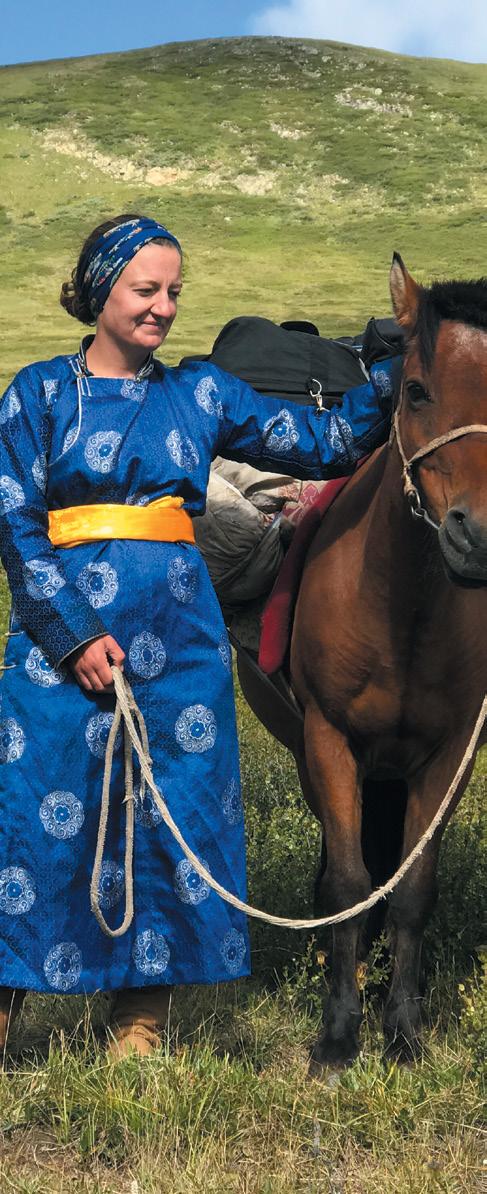
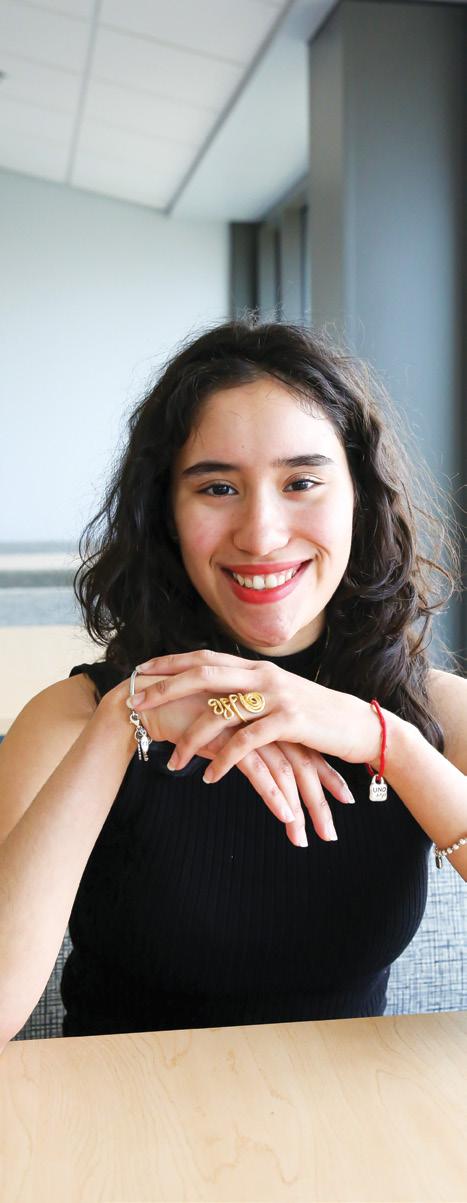
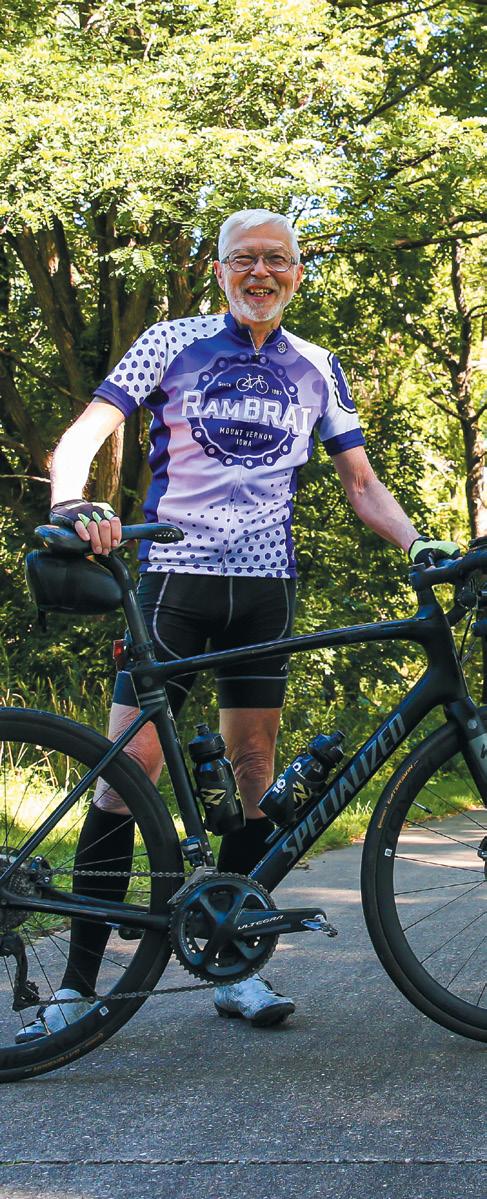
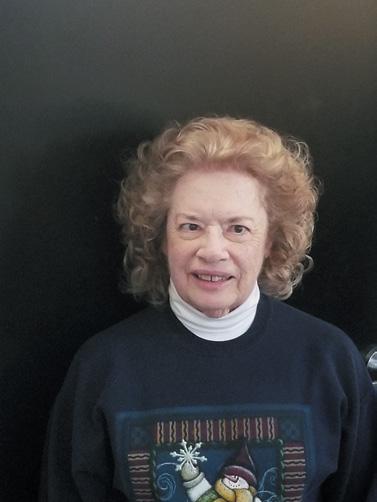
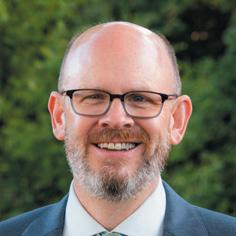
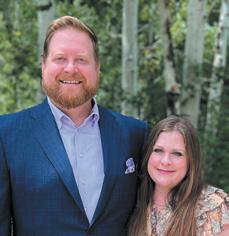
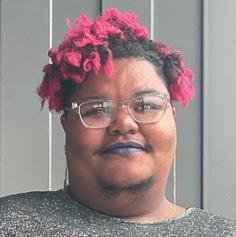
CONTENTS CORNELL REPORT | SPRING 2024 The Posse impact From urban areas to campus leaders 23 54 Losses 56 Last Word 2 You Said 4 Around the Block D E P A R T M E N T S L I F E A F T E R CO R N E L L Kirk Smothers ’91 Leadership in learning differently 22 Trudy Hoag ’70 Making history in 2 careers 10 Lucas Haldeman ’99 & Sarah Roudybush ’99 Pioneers in smart technology 32 1 Jayden Epps ’16 Theatre provided people skills 44 11 Ram Report 45 Alumni News 13 Across the continents Alums who’ve (literally) gone far 33 Life after Cornell— emeritus style Catch up with 5 former professors
You Said
‘18 THINGS’ PROVIDED UNDERSTANDING
Thank you for the understanding and scope provided by your collection of block course descriptions in the article “18 things we did in 18 days.” It was both an interesting and an important article for me to read as an alum coming from the days of the semester system at Cornell. I really enjoyed reading about the kinds of studies students are involved in at Cornell today!
Carol Parish Compton ’61
Madison, Wisconsin
BLOCK PLAN CAME ALIVE
Reading the Cornell Report about what was learned and experienced in 18 days was exciting, fascinating, and made me want to go back to Cornell to try it out! Fifty years ago when I attended, it wasn’t possible. Thanks for bringing this alive for me.
I was also so touched and impressed by the “I See You” issue in 2021.
Pam Rechel ’72
Portland,
Oregon
MORE THAN A JOB
The article “More than a job” in the fall 2023 Cornell Report brought back wonderful memories about how my Cornell work-study job changed my direction in life, even if my major in biology remained the same.
I recently retired from a truly rewarding career at the University of Iowa as the assistant provost and director of student financial aid. I cannot imagine a better career than one in which I was able to help others reach their educational goals as Cornell did for me. I entered Cornell in the fall of 1977 intending to become a medical technologist. Through my job in Admissions, I discovered a world of career options in higher education. I loved the opportunity to share my amazing experience at Cornell with prospective students and their parents. My time at Cornell was made possible through generous grants and scholarships from the college and federal financial aid programs. Through my work-study job and my time in the classroom, I honed my written and verbal communication skills, developed the skills to research and analyze information, and to think critically. Having a job provided me with another community on campus and a way to fit in. Coming from northwest Iowa and a small high school, along with being a first-generation student, Cornell felt a long way from home for me and my job helped ease that transition.
Your article was right on the mark; employment is so much more than a paycheck. Thank you for highlighting the wonderful benefits of student employment.
Cindy Timmerman Seyfer ’81 Iowa City, Iowa
We are delighted to publish letters and social media mentions. Tag @cornellcollege to be considered on social media. Send letters to cornellreport@cornellcollege.edu or Cornell Report, Box 1648, 600 First St. SW, Mount Vernon, IA 52314-1098. Submissions are edited for style, length, and clarity.
BE PART OF THE CONVERSATION
EDITOR Dee Ann Rexroat ’82 drexroat@cornellcollege.edu
ASSISTANT EDITOR Jill Hawk DESIGN Amy Belice Graphic Design CLASS NEWS CONTRIBUTORS Maxwell Love Rachel Weber The Cornell Report is published fall and spring for alumni, parents, faculty, staff, and friends of the college by the Office of Marketing and Communications, Box 1648, Cornell College, 600 First Street SW, Mount Vernon, IA 52314-1098 Contact Us GIFTS TO CORNELL ADDRESS CHANGE 877.MVERNON (683.7666) giving@cornellcollege.edu ALUMNI ENGAGEMENT OFFICE 319.895.4204 alumni@cornellcollege.edu REGISTRAR
registrar@cornellcollege.edu ATHLETICS
athletics@cornellcollege.edu ADMISSION
admission@cornellcollege.edu cornellcollege.edu/cornell-report ONLINE-ONLY OPTION To opt out of the printed magazine and be notified by email when each issue is online, contact the editor at cornellreport@cornellcollege.edu Volume 47 / SPRING 2024 Cornell Report No. 2
319.895.4241
319.895.4372
319.895.4230
800.747.1112
2
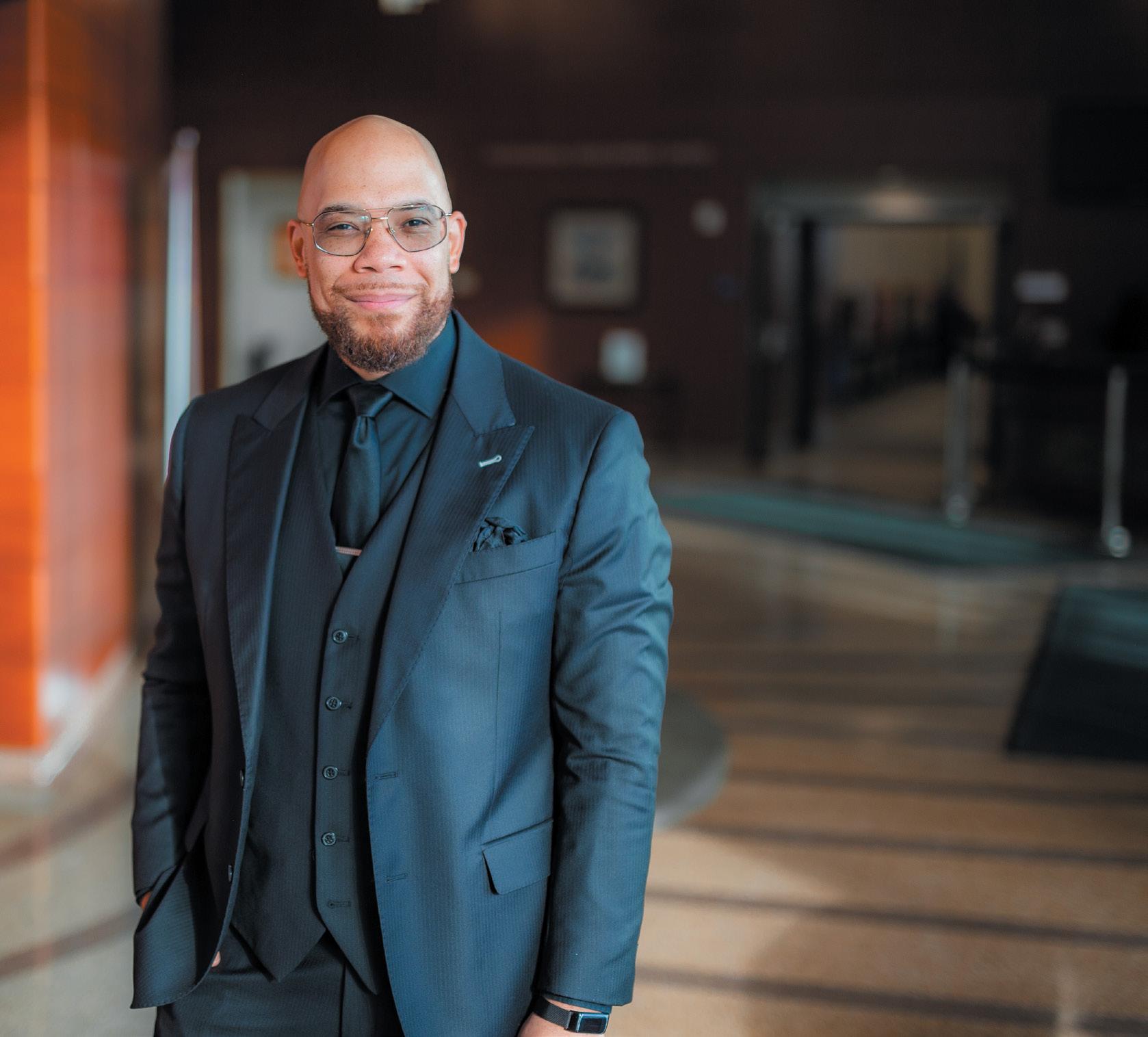
ROOTED IN THE HUMANITIES
At root, the humanities are all about the study of knowledge and its structures, the ways in which knowledge is transferred between generations, and how that knowledge both reflects and shapes us as human beings. As alumni of Cornell College’s broad liberal arts approach to holistic learning, we are grateful that the college has always nurtured diverse perspectives rooted in the humanities. By our count, almost 40% of the courses featured in the “18 things we did in 18 days” article in the fall 2023 Cornell Report are humanities courses—and many of the non-humanities courses had strong humanities components to them.
No single discipline or even single approach to thought has wisdom enough to address the complex problems of the contemporary world. And so, during a time when we are grappling with the consequences of social media, artificial intelligence, and toxic political division, we only need look at how leaders in these fields are struggling to address the ill effects
Well Said
“Identify someone who can be your coach who is not connected to your business. Everyone needs a coach they can call anytime.”
Darius Ballard ’07, chief human resource officer, Cedar Rapids Community School District, speaking at a Berry Career Institute Community Leadership Panel on campus
of what they produce to grasp the perils of ignoring the humanities. An in-depth study of Gutenberg and the power of communication tools to upend and transform society; of Prometheus and the various ways that technologies can both serve and undermine humanity; and of Machiavelli, Sun Tzu, and how political strategies can bring down kingdoms, are just a start toward understanding what is truly at stake for humanity’s future.
Yet the media is full of stories about colleges and universities abandoning their humanities curriculums. Even putting aside studies that suggest that humanities majors make more money over the course of their lives than their STEM counterparts because they tend to possess the people skills to go into management, we are encouraged to know that the humanities are alive and well at Cornell College.
Anthony Vaver ’88 Westborough, Massachusetts
David Syring ’89 Duluth, Minnesota
WHERE’S MILHAUSER WHEN YOU NEED HIM?
I’m reading the article about historic buildings and find this: “From 1976–1989 Pauley was the Women’s Academic Residence, a counterpart to the Men’s Academic Residence in Altoona Hall (which moved to Rorem in 1984).”
When I was there from 1980–1984, Altoona was a vacant building and I’m quite sure Rorem was already the academic residence. Where’s Milhauser when you need him?
Bart Schaefer ’84 Novato, California
EDITOR’S NOTE: You are correct, Bart, and I should have consulted the late Registrar and Professor Emeritus of Classics Charles Milhauser’s old catalogs as they hold the answer: From 1977 to 1984 Rorem was the Men’s Academic Residence. In 1984 it became a coeducational residence hall and in 1996 returned to its original status as a men’s hall.
Rorem now houses first-year students.
ALISABETH VON PRESLEY

Around the Block
4
History and secondary education major Quinn Wilcoxen ’25, aka Kwin the Musician, entertained the Cornell student body at The Big Event in January as the opening act for rapper Waka Flocka Flame. The Big Event is made possible each year through The Richard and Marlene Williams Fund and Student Senate.
SMRITI
NEUPANE ’26
COURSE One
INTERNATIONAL RELATIONS IN THE MODERN WEST
Assistant Professor of History
Jonathon Dreeze takes his students on a rigorous exploration of international history to delve into how the world became what it is today in his International Relations in the Modern West course.
“Sometimes reality can feel a little bit like a dream, in the sense that in the dream you don’t know how you ended up at a place–you just kind of appear there. I think history, and especially this class, helps to explain that by explaining the norms of society and the reasons why the world functions the way it does today,” Dreeze says.
WHAT THEY LEARN
The course examines the political, economic, and military relations between the major powers of the world from the early 20th century to the breakup of the Soviet Union in the ’90s. The 300-level class is required for the history major and is often also required for international relations majors.
Students discuss the major conflicts and seek to understand why the U.S. got involved in WWI and WWII, and the rationale behind the Korean and Vietnam wars. They also study how domestic policies interact with international policies, including culture, military matters, and ideology.
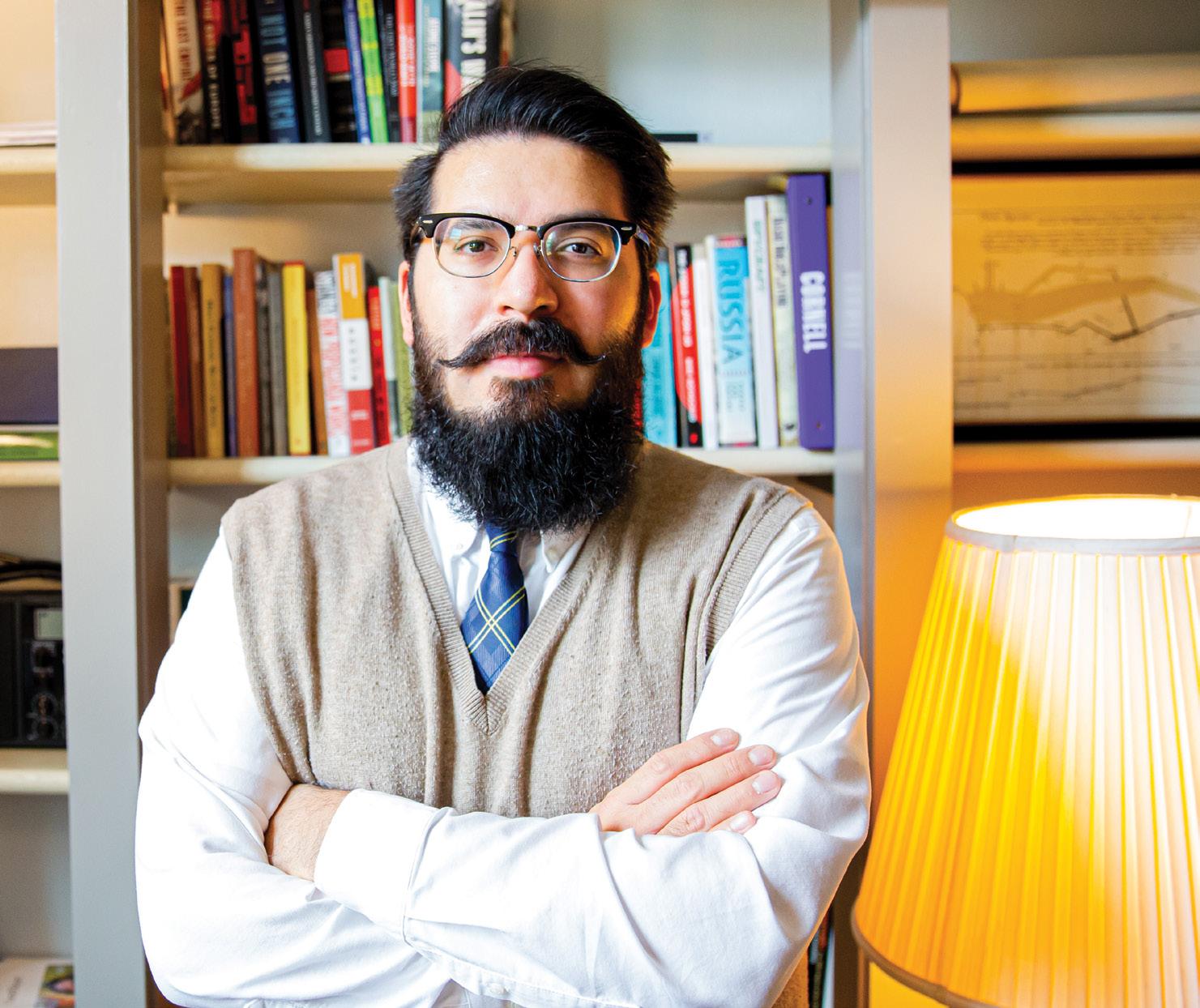
Dreeze says the intensity of this course taught on the block plan helps prepare students for graduate-level history courses.
HOW THEY LEARN
Students read up to 100 pages a night. Dreeze uses a variety of teaching methods, including lectures, extended group class discussions, and role-playing scenarios. Students team up to act out their version of what happened in the Munich Agreement and the Cuban Missile Crisis.
“I encourage them to be a little bit over the top and flamboyant about it,” Dreeze says. “That extra space where they can be a little bit silly but also where it’s grounded in historical reality allows them to enjoy these simulation assignments.”
Meredith Sconce ’26, a secondary education history major, says she enjoyed the open discussions and debates that are frequently part of the class.
“Dr. Dreeze often spends time with us in a Socratic seminar style, where he poses open-ended questions for us. This is the highest-level history class offered at Cornell, which means it is predominantly juniors and seniors, most of whom are majoring in history or international relations. As such, there is wonderful class engagement, peer interaction, and high-quality conversation and debate, which is very enriching.”
SELECTED READINGS
“Darkness at Noon”
by Arthur Koestler
“Prompt and Utter Destruction”
by J. Samuel Walker
“The Origins of the Vietnam War”
by
Fredrik Logevall
Jonathon Dreeze has taught history at Cornell since 2020.
MEGAN AMR
5 CORNELL REPORT | SPRING 2024
Hilltop hot sheet
Choirs have something to sing about
Last fall American composer Elaine Hagenberg was in residence on the Hilltop helping prepare the Cornell choirs for a performance of her masterwork “Illuminare.”
Then in February composer and conductor Z. Randall Stroope spent three days with the choirs for a concert of his works.
A third residency is scheduled at the end of April with the director of The Ambassadors of Harmony, a five-time Barbershop Harmony Society International Chorus Champion.
Students seek Life Design
The Berry Career Institute has worked for years to incorporate career and professional development education into class curriculum by visiting classes to teach skills. In 2023 its staff offered Life Design as an adjunct course during Blocks 5–7. The course began with a waitlist and was so popular it is being offered again this spring.
Among the comments from the 100% positive course evaluations: “This class has given me so much knowledge on how my major and connections matter”; “It helped me feel more confident in myself and my future”; and “I learned about myself, failure immunity, and various skills to use for future employment and personal endeavors and challenges.”
Old fire station gets new life as brewery
Things are brewing at the former fire station in uptown Mount Vernon.
The building, empty since 2012, is set to open in spring 2025 as The Old Fire Station Brewery.
Renovations received a major boost with a $100,000 challenge grant from Main Street Iowa made possible by the Mount Vernon-Lisbon Community Development Group. The planned six-tank brewery with roughly 4,500 square feet is owned by a three-person partnership, headed by local entrepreneur Meridith Hoffman. “We hope it becomes a fixture on Mount Vernon’s main street as a large gathering space to complement the businesses that are already there,” she said.
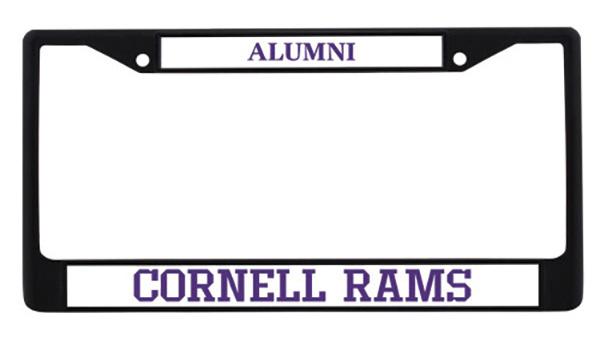
Roll with Cornell wherever you go
Now you can show your Cornell pride from behind the wheel with a license plate frame. Choose how you roll with an Alumni, Mom, or Dad version. Purchase one at crnl. co/spiritstore

White Privilege Conference marks 25 years
Eddie Moore Jr. ’89 realized a dream when he founded The White Privilege Conference (WPC) at Cornell College. The year was 1999 and Moore was director of intercultural life at the college. In its second year the philosopher, theologian, and political activist Cornel West spoke from the King Chapel stage as WPC’s keynote speaker. Over 25 years the WPC has moved to many locations and is still headed by Moore. The conference addresses issues of privilege and oppression and advances social and economic justice.
25 6 AROUND THE BLOCK
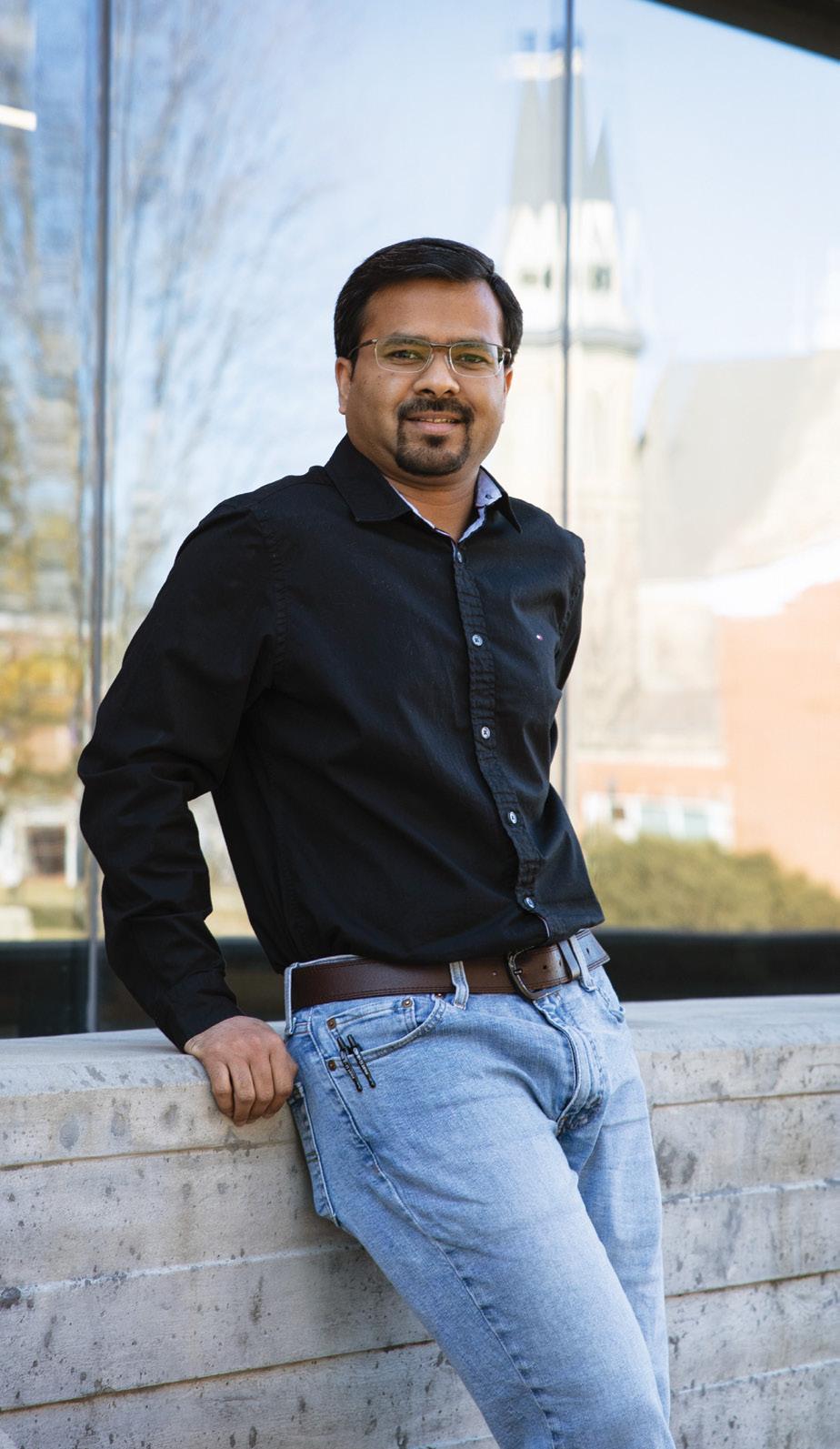

Ask the Expert What is big data?
By Assistant Professor
of Computer Science
Ajit Chavan
Records show that 720,000 hours of videos are uploaded every day to YouTube, Google answers over 8.5 billion questions per day, and Instagram Stories has 500 million active users daily. All these applications generate and access huge amounts of data (big data) every minute in today’s social media and e-commerce era.
Simply put, datasets that are so big they cannot be stored and processed on a single machine using traditional software are considered big data.
To effectively store, process, and access such data, we need to use a collection of computers (also known as clusters) housed in large data centers (there is one near Altoona, Iowa, run by Meta) equipped with specialized software (big data technologies).
Big data is generally characterized by four Vs: volume, velocity, variety, and veracity. Volume refers to the amount of data generated. For example, Facebook generated 4 Petabytes (1 PB = 1 million GB) of data daily in 2020. Along with volume, velocity is also an important aspect of big data. The Google Search engine gets 99,000 search requests every second. They must process this data in a fraction of a second to return search results to the users.
The variety refers to the different types and formats in which the data is generated and processed. As an example, users post stories, pictures, and videos on Instagram, react to posts, and comment on them. Storing such different types of data (text, images, audio, video, etc.) and retrieving them quickly to provide a unified user experience requires massive clusters of computers with fine-tuned software systems. The collected data is also used to gain insights into user preferences, such as the most popular products on Amazon or suggesting the most relevant products based on your previous product search and purchases. In these cases the fourth V (veracity) is essential since it refers to data quality, accuracy, and credibility. The collected data could have missing pieces or be inaccurate, impacting the quality of outcomes and insights. Finding such inconsistencies and addressing them can be challenging when collected data has hundreds of millions of records.
In summary, big data refers to a rapidly growing, voluminous dataset consisting of many data formats and/or structures, making it impossible for traditional software systems running on a single machine to store, access, and process them effectively.
ENVISAGE STUDIOS
Ajit Chavan
7
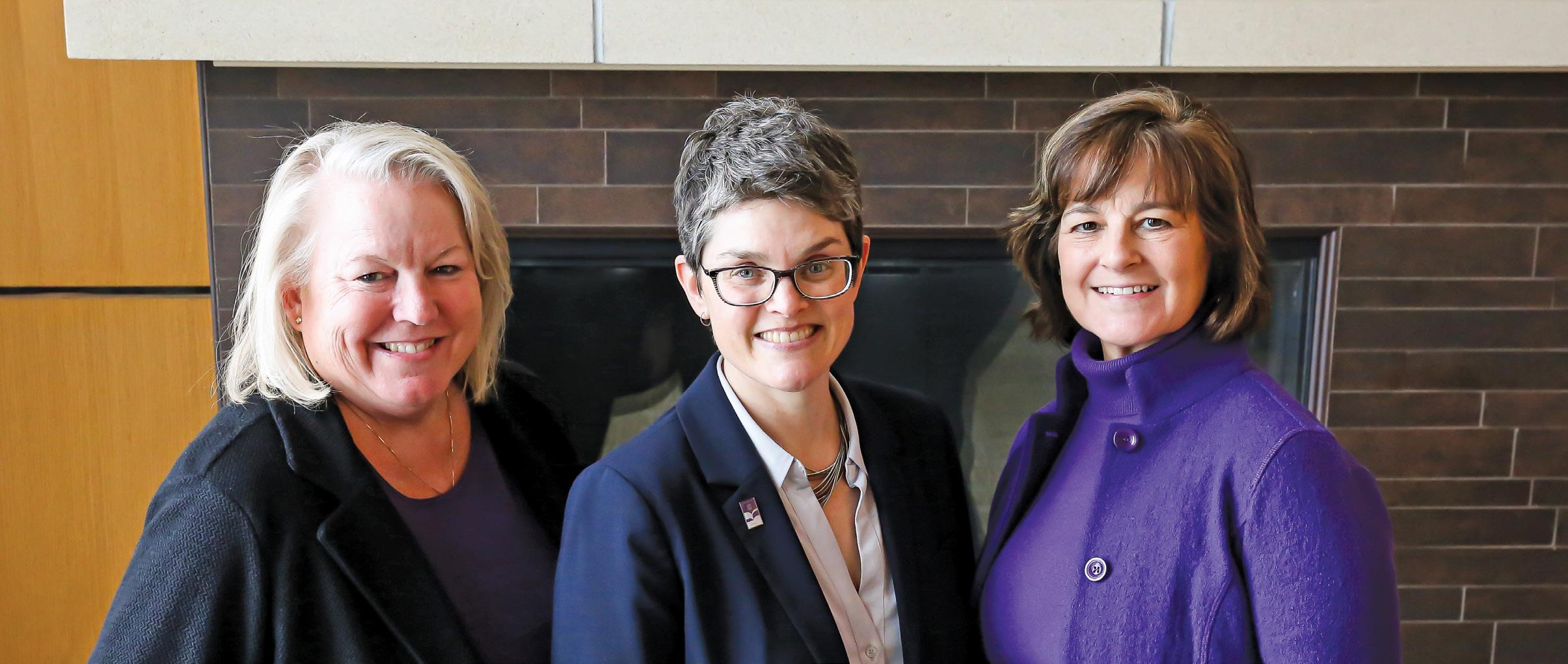
Cornell’s majority female executive team emphasizes unity over competition
As Iowa’s first coeducational college and one of the first coed colleges in the nation, Cornell was a pioneer in empowering women. Now, for the first time, we also have a majority female executive team.
Cornell’s leadership team is led by President Jonathan Brand and includes four vice presidents:
PROVOST AND VICE PRESIDENT for Academic Affairs Ilene Crawford ’92
VICE PRESIDENT for Enrollment Management
Wendy Beckemeyer
VICE PRESIDENT and Chief Operating and Chief Financial Officer Kelly Flege
INTERIM VICE PRESIDENT for Student Affairs and Special Assistant to the President John Harp
This discussion (condensed for the Cornell Report) among the women VPs about Cornell’s leadership style is one example of their impact on campus and communications.
WB—There aren’t a lot of institutions where the president is very open to the agenda being created by the people who are attending the meeting, where he then helps write the minutes. He’s very much a working president. The dynamic is different from other campuses where the structure feels very formal.
KF—And just as Wendy described Jonathan as a working president, I would describe that across the board to the whole executive team.
WB—We are committed to supporting each other. One of the things I haven’t always seen in higher ed or corporations is the energy to support everyone on the team, as opposed to it being a competition. I think that is a compliment to the level of confidence in our own abilities and in each other.
IC— I would agree with that. We work as an executive team in ways that are about the gains of the institution as a whole, and model across divisions what healthy relationships look like, and that it need not be competitive. In fact, it’s important that it’s not competitive in order for us to continue to advance as an institution. It’s very common in times of uncertainty for vice presidents to retract and carve out what their territory and resources are and fiercely protect those from each other. We haven’t done that. We have the ability to transmit our energy to our teams and then have that flow out across the institution; that matters and makes a difference.
KF— In order for Cornell to be successful, the five of us need to model the right behavior as we lead the institution. We’re going to lunch together, and our
interaction is any day and every day and not bound by the times we’re formally meeting.
WB—There’s a humanistic element to our interaction as a group. It is a trust that we have in each other to be ourselves. That is part of the magic of the group. Less shielding and more openness and trust. It’s just how we feel when we’re together. I would definitely say I’ve been more casual and open with this group than with any other team. Women have struggled with both the confidence and the invitation to be themselves for fear of being seen as too emotional or too controlling, and in this group—because there is appreciation around the table and in our lives for one another—we’re able to be more open and more warm. It allows us to be our true selves and perform at our highest ability level.
MEGAN AMR
8
Wendy Beckemeyer, Ilene Crawford ’92, and Kelly Flege (from left) make up the majority female executive team at Cornell.
APPROXIMATE NUMBER OF ROOM RESERVATIONS MADE IN THE THOMAS COMMONS EVERY YEAR
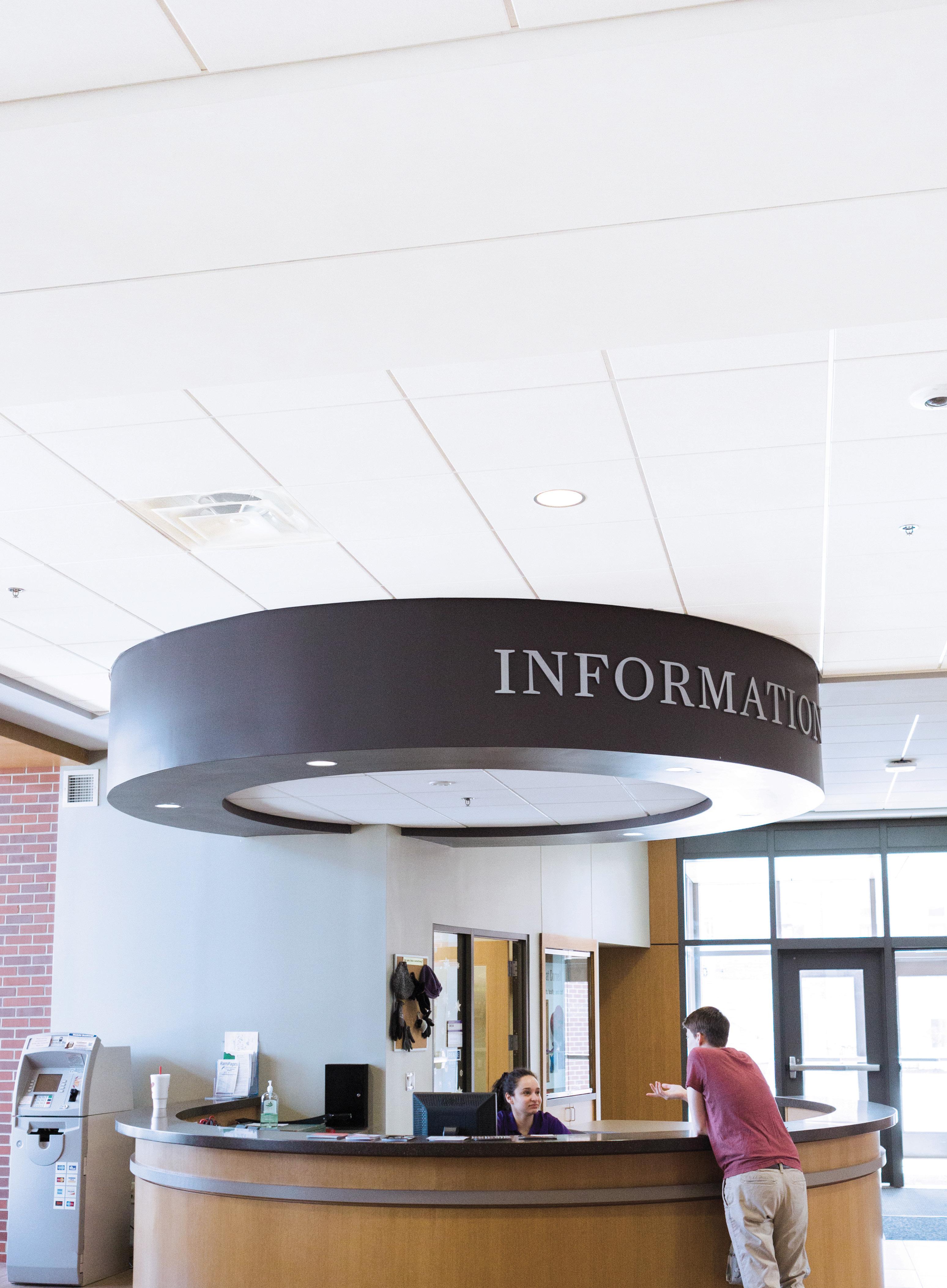
APPROXIMATE NUMBER OF THINGS CHECKED OUT BY STUDENTS, STAFF, AND FACULTY PER YEAR (INCLUDES FRISBEE GOLF DISCS, BIKES, POSTER PAINTS, TOOLS,
27
Info Desk Fun Facts 47 NUMBER OF BUILDING KEYS TO KEEP TRACK OF
NUMBER OF RESERVABLE SPACES IN THE THOMAS COMMONS 4,140
34,852
NUMBER OF HOURS THOSE 4,140 RESERVATIONS REPRESENT (WHICH IS NEARLY 4 YEARS) 1,500
RACQUETBALL
102 NUMBER OF HOURS THE INFO DESK IS OPEN EACH WEEK 17 NUMBER OF STUDENT STAFF 1 NUMBER OF STAFF 20 NUMBER OF ORANGE CARPET POSTER SPACES MONITORED BY THE INFO DESK 40 NUMBER OF DEPARTMENTS ON SPEED DIAL 60 NUMBER OF ITEMS IN THE LOST AND FOUND AT ALMOST ANY GIVEN TIME
VOLLEYBALLS,
EQUIPMENT)
ROBYN SCHWAB AARON ’07
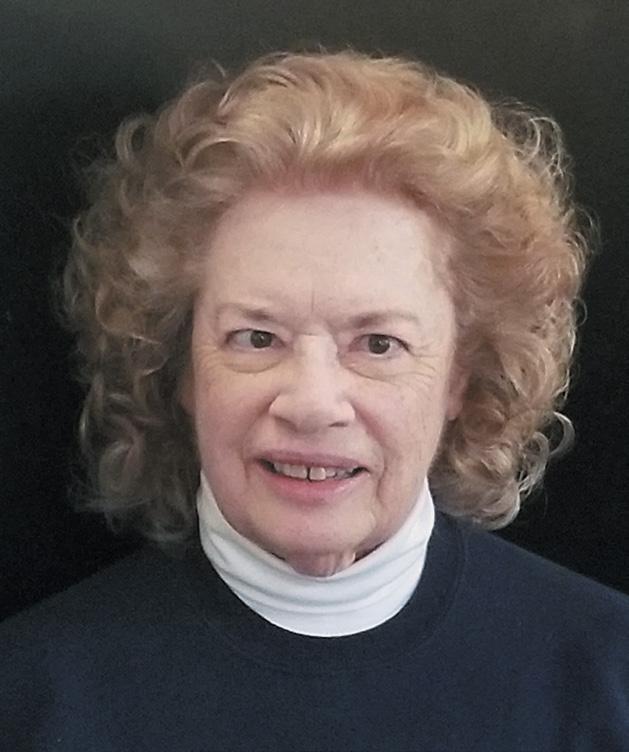
TRUDY HOAG ’70
Making history in 2 careers
Trudy Hoag ’70, a theater and English major, became an officer in the Navy the day after she graduated from Cornell. Impelled by a strong sense of duty and the prospect of eventual funding for graduate school, she signed up as a junior for a special program for women, who were barred from entering the Naval Academy or ROTC. Her training began that summer.
She was the only graduating senior to make this career move, and she did it at a time when college students everywhere, including at Cornell, were protesting the war in Vietnam.
She was not sent to Vietnam.
“Massive change was underway. It wasn’t easy. The hardest part was dealing with men who thought women couldn’t do the job. But we knew that every time we succeeded we opened doors for others.”
Instead, she followed an administrative track. Assignments included handling top secret documents at the Pentagon, supervising motion picture productions in Los Angeles, inspecting communications and living conditions on ships, and managing staff at training centers in San Antonio and San Diego. At least four times in her 20-year career she assumed leadership positions that had never been held by a woman. She was, for example, the first woman to command the 1,000-person Second Regiment of the Service Schools Command in San Diego.
“We became groundbreakers for the modern Navy,” Hoag said, describing all women officers at the time. “Massive change was underway. It wasn’t easy. The hardest part was dealing with men who thought women couldn’t do the job. But we knew that every time we
succeeded we opened doors for others. I was constantly learning; you simply had to keep learning.”
Along the way, thanks in part to night classes, she earned her master’s degree in English and American literature at the University of California San Diego.
Her final position was as an associate professor at the University of Minnesota, where she taught leadership and management courses to men and women in ROTC—the very organization that had no place for women when she was a student. Hoag retired in 1991 with the rank of commander (equivalent to an Army lieutenant colonel).
“Serving in the Navy was one of the best things I’ve ever done,” she said. “I still feel bound by my oath.”
Following her Navy days, Hoag settled in a Minneapolis suburb and started a second career as an actor and musician (she sings and plays the violin and English handbells). This led to jobs totaling more than 20 years in historic interpretation at four living history sites. She planned events, trained staff members, and portrayed both historical and fictional characters—“laundresses, cooks, school teachers, storekeepers, dressmakers, immigrants, farm wives, leather workers, you name it,” she said. All had to be represented accurately, requiring extensive study.
Hoag has become more connected with Cornell in recent years, helping plan her class’s 50th reunion. She credits her grounding in the humanities with providing the basic skills she used daily in the Navy and in her theatrical career.
“I entered Cornell an over-protected only child from Waterloo, Iowa, and left it as a naval officer ready to learn more about the wider world.”
—DAN KELLAMS ’58
10 LIFE AFTER CORNELL
DENNIS YELKIN
Ram Report
Senior lands NCAA leadership role
By Jill Hawk
When Jack Langan ’24 isn’t in the kinesiology classroom or behind home plate catching for the Rams, you might find him in an airport preparing to lead a national meeting.
Langan is representing his peers at the national level as chair of the NCAA Division III Student-Athlete Advisory Committee (SAAC). This year he’s flown to Indianapolis and Phoenix for meetings. It’s something he’s proud of.
“I’m a college student, I’m 22, and I’m able to travel by myself, go to business meetings, and understand how to dress,” Langan said. “I would never have expected that I’d be speaking in front of college presidents and chancellors, or high-level administrators. I’m using my voice and speaking in a way that’s impactful and meaningful.”
The kinesiology major also holds the same top position on Cornell’s SAAC and the Midwest Conference (MWC) SAAC. That means he’s involved in decision-making and policy-setting meetings at the local, conference, and national levels.
level. We are grateful for all of the time and effort he puts in and the impact that he has made.”
Langan’s passion
SAAC is an organization where students demonstrate their leadership and speak up about issues that matter most to them.
“Nationally, we have a lot of initiatives we push. We have diversity, equity, and inclusion, we have LGBTQ, and we have mental health–that’s at the forefront of everything we do.”
“I would never have expected that I’d be speaking in front of college presidents and chancellors, or high-level administrators. I’m using my voice and speaking in a way that’s impactful and meaningful.”
JACK LANGAN
CHAIR, NCAA DIVISION III STUDENTATHLETE ADVISORY COMMITTEE
“We are really fortunate to have Jack represent Cornell at the highest level of NCAA student-athlete leadership,” said Director of Athletics Jeff Meeker. “He has found a passion for helping shape the student-athlete experience here at Cornell, within the Midwest Conference, and at the NCAA
Langan has been heavily involved in the creation of a mental health waiver. He’s passionate about providing mental health support for athletes.
“The idea behind the waiver is if you experience a mental health crisis severe enough that you cannot complete your season, we’ll save your season because mental health is just as important as physical health,” Langan said. “We want to focus on that, and break the stigma, especially in athletics.”
At Cornell Langan is pushing for a more cohesive campus community, eliminating separation between athletes and nonathletes. SAAC is working with the Performing Arts and Activities Council (the group that organizes events on campus) and Student Senate to
11
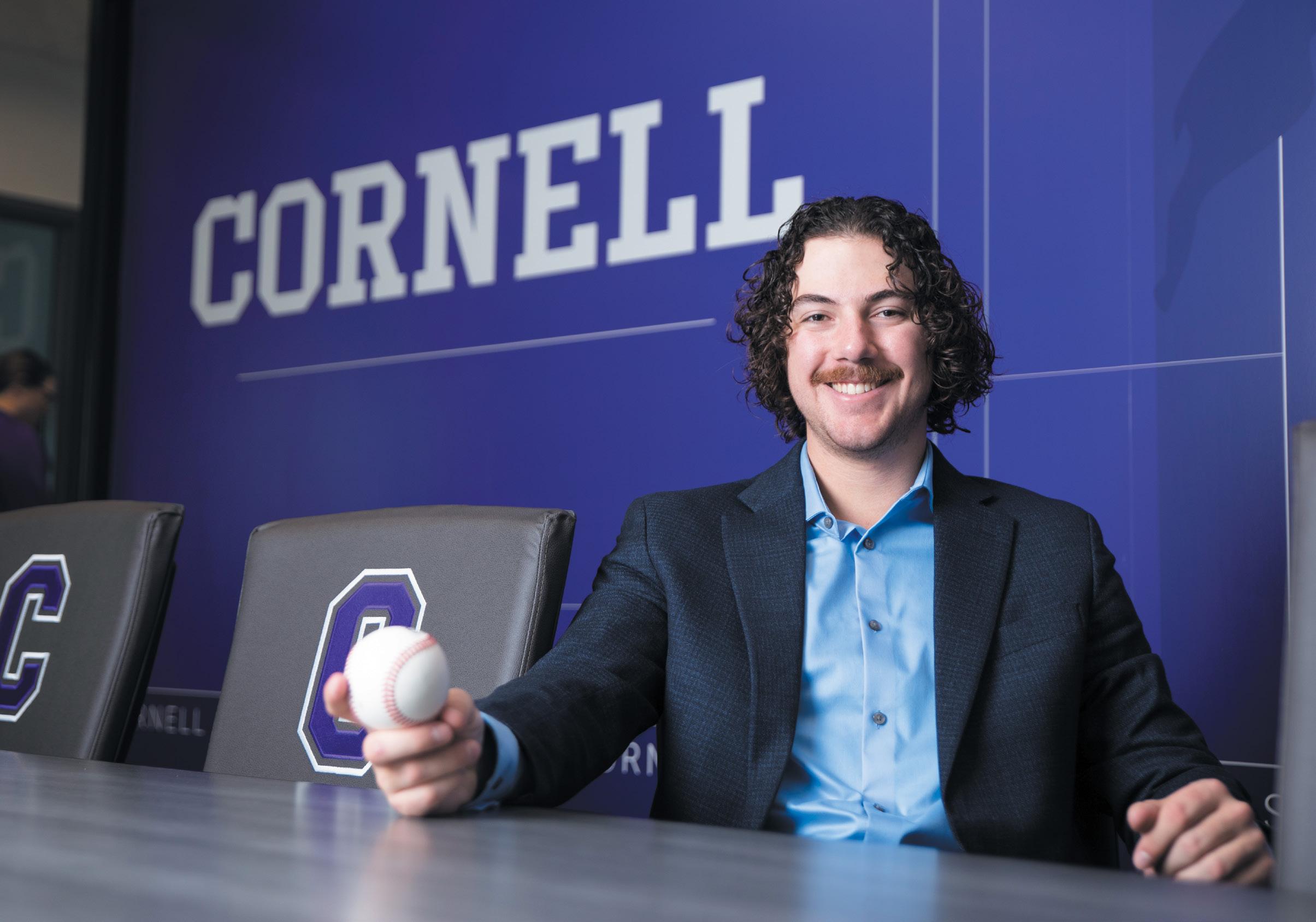
make sure athletes are at nonathletic events and nonathletes are at athletics events.“I’m really blessed and happy to be here. The amazing opportunities I’ve had off the baseball field are world-class and second to none, and I’m just trying to leave Cornell better than when I came here.”
Special Olympics
Special Olympics is a big part of SAAC, and it’s a bigger part of Langan’s life. In fact, he wrote about Special Olympics in his letter to the NCAA when he was applying to be involved in the national SAAC.
“I wrote about my experience with my little sister who has Down syndrome,” Langan said. “I wrote about coaching her in Special Olympics and how important that has been for her growth and development.”
Langan was excited because the NCAA Division III SAAC Annual Conference was held in Arizona this year, his home state, so his sister participated in the Special Olympics activities while he was there. “I was excited to see her there and see her shine.”
Langan’s future
This baseball player says he enjoys the block plan because he can schedule his day to the hour or the minute. He knows when classes are scheduled, when he can squeeze in a workout, when he needs to be at practice, and when he can work on his SAAC responsibilities.
Like his daily plan, he’s mapping out his future. He wants to get a master’s degree in sports administration and return to the NCAA with the hopes of getting a prestigious postgraduate internship. Then, he plans to go to law school. Eventually, he’d like to use his law degree to work at the NCAA where he’d continue to support student-athletes.
“Leading SAAC has been one of the best professional development opportunities I’ve ever done because it’s in a place I want to work, and it’s in the field I want to work,” Langan said. “I’m a student-athlete, and I love it. My chosen career path doesn’t exist without student-athletes, and I am grateful for what I’ve been able to do with the NCAA.”
When Cornell baseball player Jack Langan is not traveling to lead an NCAA Student-Athlete Advisory Committee meeting, he sometimes uses the Ellen Whale Conference Room in the Richard and Norma Small Athletic and Wellness Center to hold online meetings with peers from around the country.
12
ENVISAGE STUDIOS
Across the continents
Alums who’ve (literally) gone far
You can go far with a Cornell degree—literally. We asked eight of our most adventurous and far-flung alumni to tell us how and why they settled on another continent, what they’ve learned along the way, and their advice for today’s students. Follow along on these Cornellians’ global journeys.


CORNELL REPORT | SPRING 2024
“There are days I’m getting to do some amazing archaeology while riding across the Mongolian tundra and taiga on horseback, leading an international team of curious students, really talented scientists, and local guides, and I am filled with joy and pride.”
Julia Clark ’06
Hometown: Twin Bridges, Montana
Current location: I split my time between Mongolia, Montana, and Arizona.
Why Mongolia: After Cornell I knew I wanted to be an archaeologist but didn’t know where, so I tried archaeology in lots of places (Bahamas, Panama, China, Kazakhstan, U.S. Southwest, Missouri, Iowa, Wyoming, Utah) until I found something that really fit. From my first trip I loved the adventure, people, and research in Mongolia.
Career: I’m the founding director of NOMAD Science Mongolia, Inc. I lead international interdisciplinary research projects to Mongolia, where we focus on the cultural preservation of threatened (looting, climate change,
ple to Mongolia, where we partner with a similar Mongolian team to rescue and conserve archaeological artifacts that would otherwise be lost.
Cornell impact: My archaeology professor (Dr. Doershuk) was a pivotal mentor in getting me set up in archaeology. He and Dr. Garvin made sure that I had independent study options when I ran out of regularly offered classes to further my training. I also still use the three- to fourweek schedule for the courses I offer in Mongolia. My first international experience was my trip to the Gerace Research Center in the Bahamas with my Cornell anthropology class!
Benefits of living in a different culture: I love getting to travel, sharing my new home with students every year, and making strong connections with local families in the really remote areas where I work. I feel lucky to call Mongolia my second home and am as comfortable there as I am in the U.S. There are days I’m getting to do some amazing archaeology while riding across the Mongolian tundra and taiga on horseback, leading an international team of curious students, really talented scientists, and local guides, and I am filled with joy and pride. I’ve learned to make several Mongolian dishes, enjoy speaking Mongolian, and have been completely convinced of the utility of the Mongolian deel (traditional robes and coats).
What would you tell students: There are going to be a lot of challenges, but it is so worth it. Open your mind and lean into the adventure!

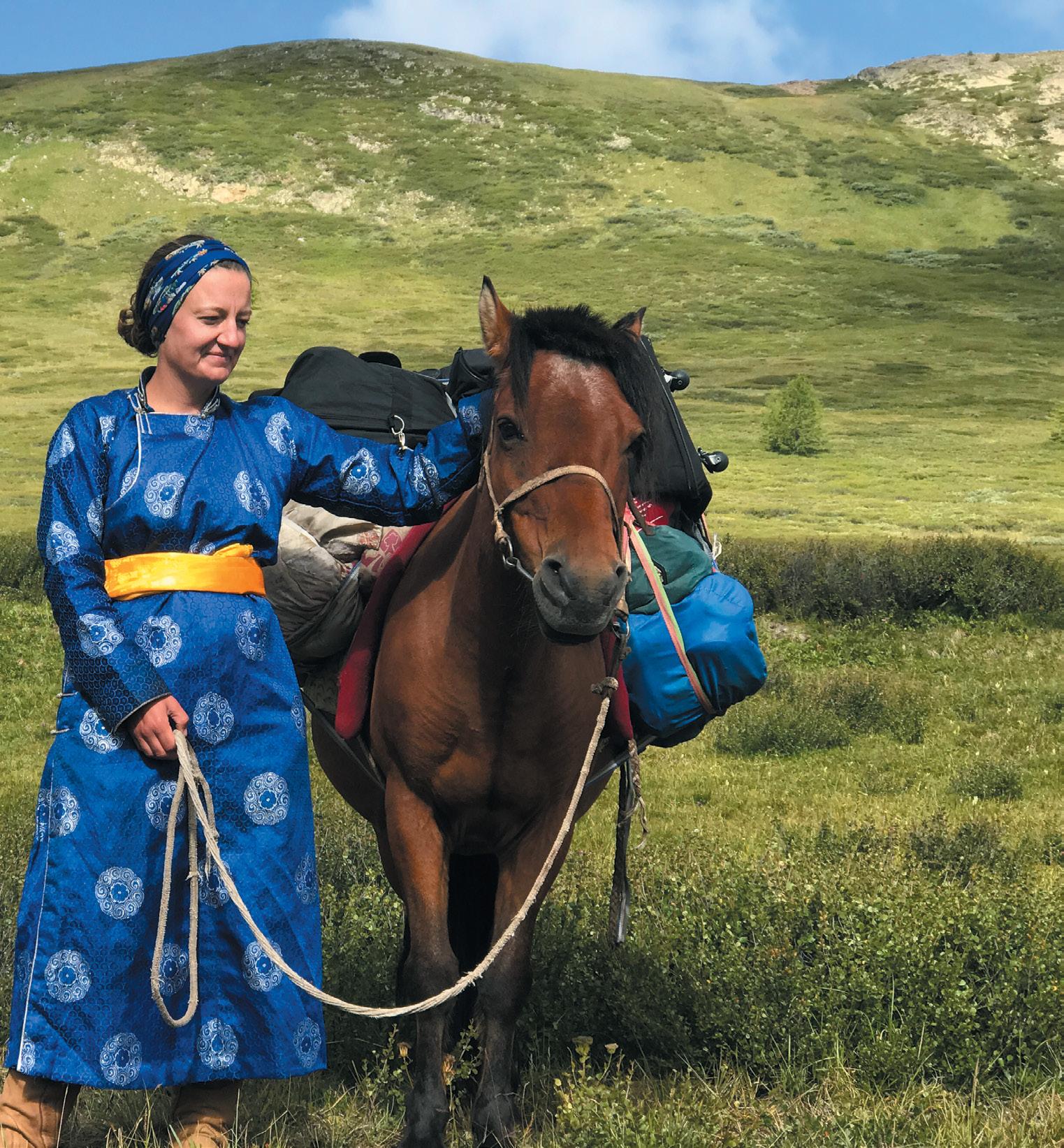 Julia Clark ’06 is the founding director of NOMAD Science Mongolia Inc., leading cultural preservation research projects to Mongolia.
PHOTO COURTESY OF JULIA CLARK ’06
Julia Clark ’06 is the founding director of NOMAD Science Mongolia Inc., leading cultural preservation research projects to Mongolia.
PHOTO COURTESY OF JULIA CLARK ’06
Mongolia Mo 14
Emily Barbuto ’00
Turkmenistan
Hometown: That’s complicated. I’ve always been transient. My four years at Cornell were the most stable years of my life.
Current location: Ashgabat, Turkmenistan (previously Kazakhstan, Democratic Republic of the Congo, Myanmar, South Korea, Israel, United Arab Emirates, and Egypt).
Career: I’m the principal at Ashgabat International School. I’ve been with Quality Schools International since 2016. As a QSI teacher, I completed my master’s degree in educational leadership online through a partnership with QSI Graduate Studies and the State University of New York at Buffalo. I switched from teaching to administration in 2021.
Cornell impact: Cornell prepared me for a career as an educator, but it was Cornell’s proximity to the University of Northern Iowa’s overseas recruitment fair for educators, while I was student teaching in Mount Vernon, that gave me my first teaching position in Egypt right after graduation.
Benefits of living in a different culture: In most of the countries I’ve lived in, it is a social obligation to hire people to work in your home, so I have become accustomed to having a housekeeper, cook, and driver. Traveling during school breaks is part of the expat culture. My favorite thing about Turkmen culture is the concept of Hudayyoly, which means Personal Thanksgiving and can occur any day of the year and the person having Hudayyoly doesn’t have to say why. I have been invited to many amazing Turkmen family Hudayyoly celebrations, and Turkmen staff members often bring Hudayyoly treats to share at school.
What would you tell students: Living and working abroad is not for every-
“My favorite thing about Turkmen culture is the concept of Hudayyoly, which means Personal Thanksgiving and can occur any day of the year and the person having Hudayyoly doesn’t have to say why.”
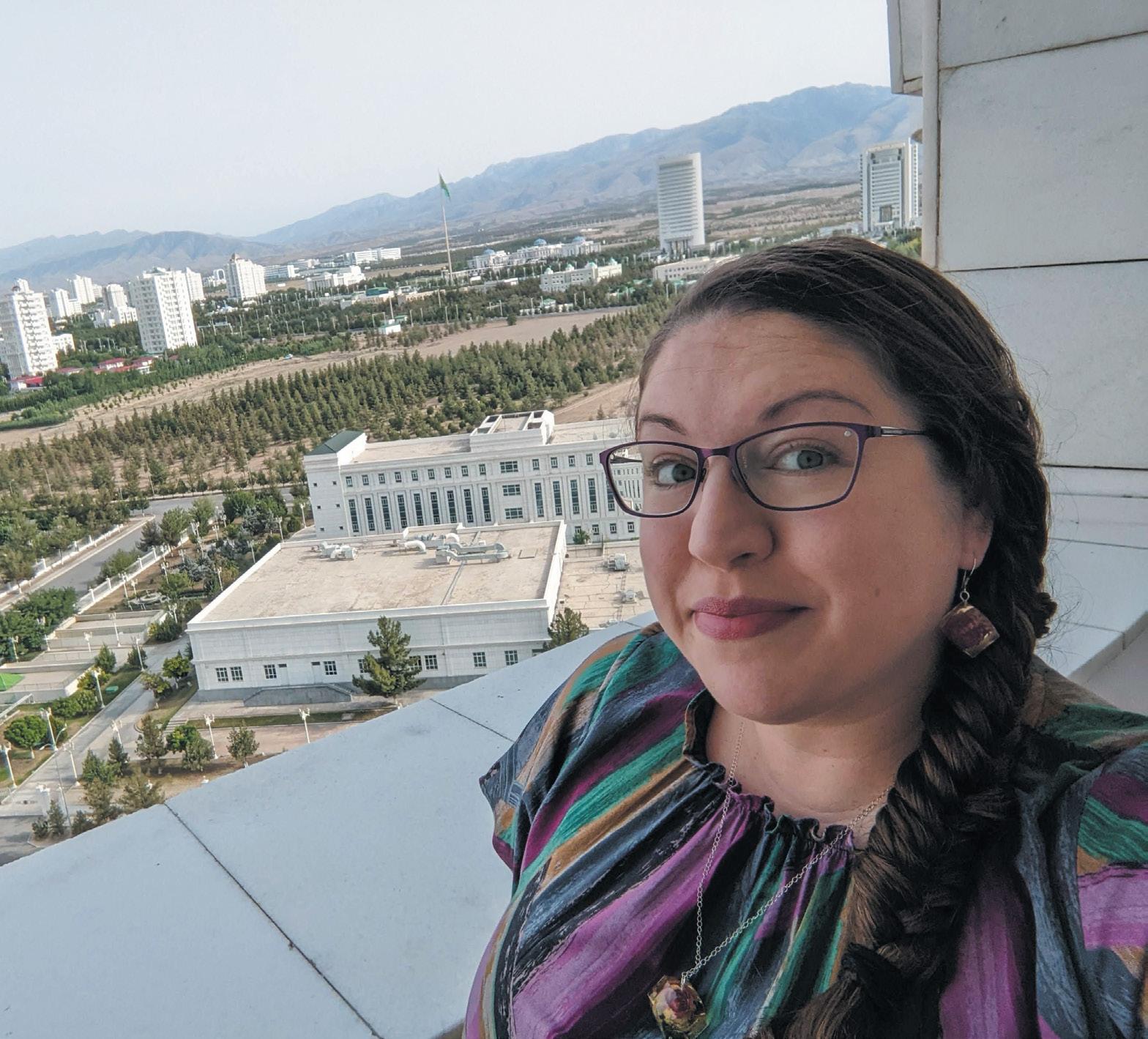

OC U R T E S Y O F E M I L Y B ARBUTO ’00 CORNELL REPORT | SPRING 2024
Emily Barbuto ’00 stands on the balcony of her apartment. Behind her are the Kopet Dag Mountains bordering Iran.
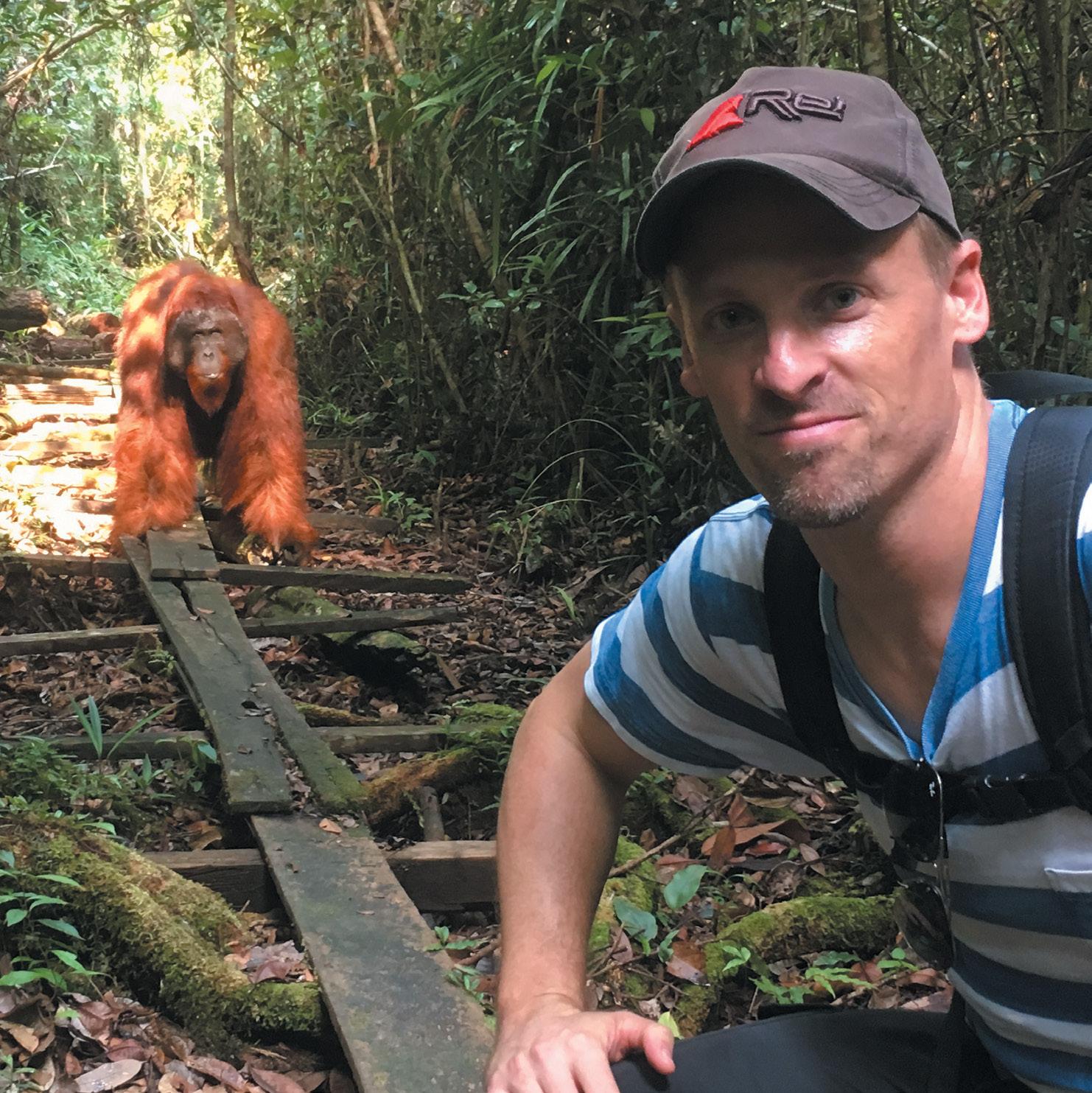
Hometown: Coon Rapids, Minnesota.
Current location: Bangkok, Thailand, since 2023. I’ve lived in Asia since 1996, including Tianjin and Shanghai, China; Singapore; and Jakarta, Indonesia.
Career: I am the chief commercial officer of Rhenus Logistics Air & Ocean, responsible for 600 salespeople in over 55 countries. From 2003–2018 I worked for the logistics firm JAS Worldwide. From 1998–2003 I was a China tour operator and travel agent, and from 1996–1998 I taught English in Tianjin, China.
Cornell impact: As a child, my family traveled frequently around the U.S. While at Cornell, I spent three blocks during my junior year in Europe. These experiences helped me learn that the world is a small and beautiful place. Cornell was more racially and
politically diverse than my hometown and exposed me to different ideas. This helped me to experience new countries with an open mind. The block plan made studying abroad more flexible and my college degree gave me access to jobs and opportunities in other countries that I would not have had. After graduation in 1996 I planned to spend one year in a country as different from the U.S. as possible. China was looking for English teachers and this became an easy opportunity to experience life in another country. Professional opportunities were numerous and opened doors for me to live, travel, and work all over Asia.
Benefits of living in a different culture: Finding experiences that are dramatically different from how I grew up is exhilarating. Expecting differences
“Expecting differences and embracing them makes life both easier and more enjoyable. Regardless of where I have lived, I have found ways to help those around me.”

Scott Smiley ’96 Thailand
and embracing them makes life both easier and more enjoyable. Regardless of where I have lived, I have found ways to help those around me. Many countries around the world, including the U.S., need to do more to support refugees. In Indonesia, I have had the opportunity to support the Afghan migrant community, and in Thailand I have supported children displaced by unrest in Myanmar.
What would you tell students: American passport holders are fortunate as we can travel much easier than many of our fellow humans. Take advantage of this to both learn about the world and teach people about America. Remember this and welcome migrants from elsewhere in the world who need a home in the U.S.
Scott Smiley ’96 came across this orangutan while visiting Indonesia’s Tanjung Puting National Park and its orangutan preserve.
PHOTO COURTESY OF SCOTT SMILEY ’96
16
Dana Dahl Touzelet ’81 Switzerland
Hometown: Lake Forest, Illinois (though we lived all over the U.S. when I was growing up).
Current location: For 16 years in the commune of Châtel-Saint-Denis in Canton Fribourg, Switzerland.
Why Switzerland: I met my French husband on a business trip to London in the late 1990s and we married in 2000. We moved back to the States the following year, but a great job opportunity brought him to Switzerland in early spring 2007, and I followed.
Career: I retired in 2022 after 14+ years of service from Edwards Lifesciences (an American medical device manufacturer) as the vice president of global ethics and compliance. I was responsible for Europe, the Middle East, Africa, Canada, and Latin America. I provided near-daily strategic and instructional guidance to ensure the program operated in accordance with ethical business practices, company policies, and legal and regulatory requirements.
Cornell impact: Cornell taught me to welcome surprises and embrace change (the block plan was instituted at the start of my sophomore year). Also, the experience of spending the better part of a month in England with Professors Stephen Lacey and Liz Isaacs in January 1981 triggered a huge curiosity about exploring other countries and cultures. I went on to do graduate legal studies at the London School of Economics after finishing law school at Drake University, to live in France for 15 months, and am now firmly rooted in Switzerland!
Benefits of living in a different culture: The gifts it has bestowed upon me are broadened horizons, adaptability, and elimina tion of prejudice or fear of others who aren’t like you. I’ve learned to be flexible and willing to accept that I might not always be right or have the best ideas about how to do certain things.
What would you tell students: Do not be afraid to step out of your comfort zone. Fear is an intractable thing that holds so many people back—not only from reaching their professional potential but also from being willing to explore and experience new and different things. It’s a great, big world. Banish fear and embrace adventure and learning—in my opin ion, you risk missing out on an awful lot if you don’t.
“I’ve learned to be flexible and willing to accept that I might not always be right or have the best ideas about how to do certain things.”
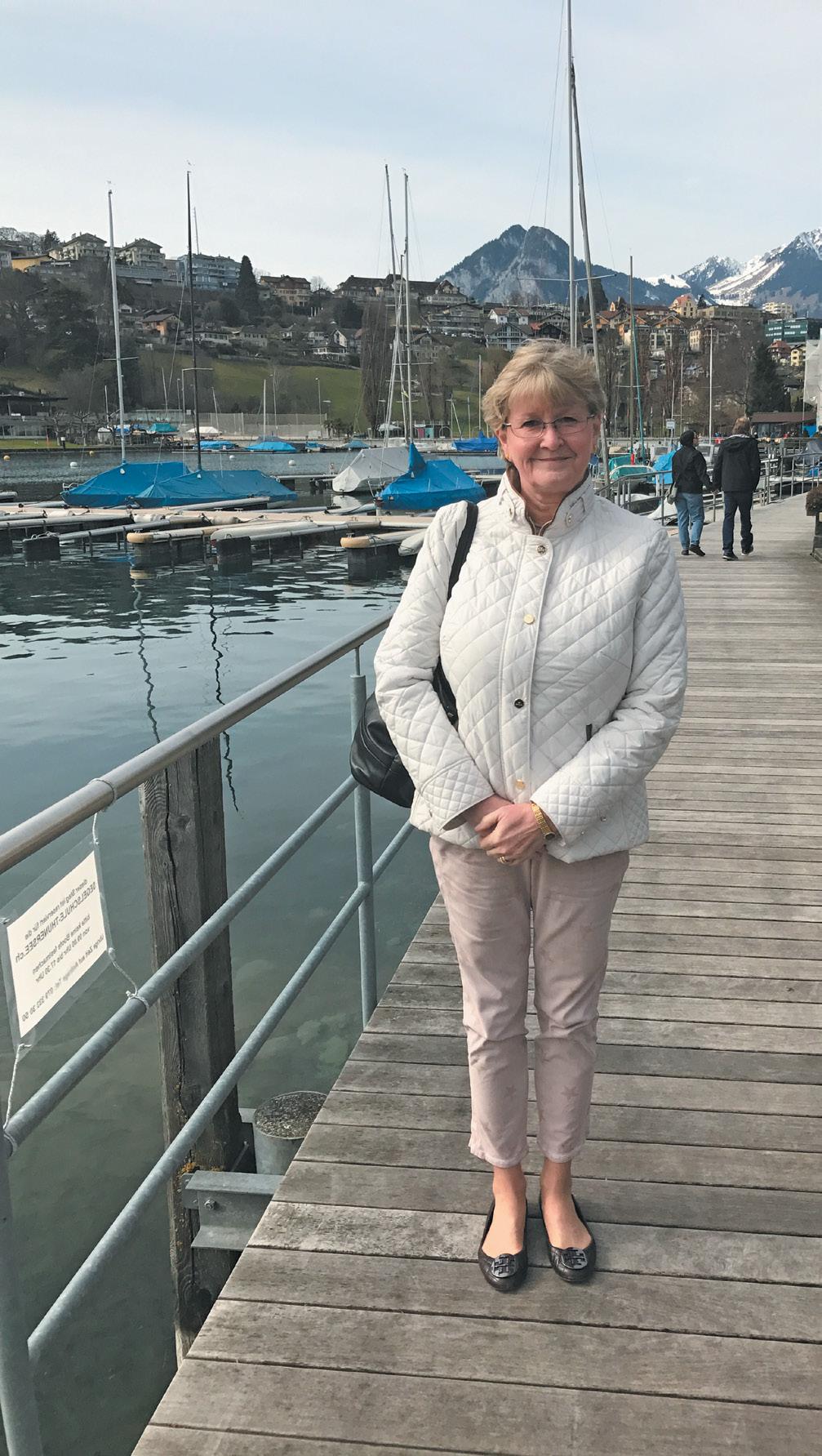

17 CORNELL REPORT | SPRING 2024
Dana Dahl Touzelet ’81 in Spiez, Switzerland.
COURTESYOFDANADAHLTOUZELET’81
Laurie
Lemmlie-Leung ’78
Panama
“People need to get out of their bubble, and travel is a great way to do that. Embrace the opportunity to encounter diverse cultures, connect with new faces, and temporarily set aside judgment.”
Hometown: I was raised in Las Vegas, Nevada; Sacramento, California; and Columbus, Nebraska.
Current location: Volcan, Panama. Lived in the Philippines for 10 years and Hong Kong for over 30.
Career: I joined the Peace Corps and was assigned to the island of Masbate in the Philippines. After the Peace Corps I was hired by Judith Gintzler Kocher ’72 to work in the U.S. Refugee Program. For seven years I worked in the office in Manila and the refugee

my Peace Corps years) move to Hong
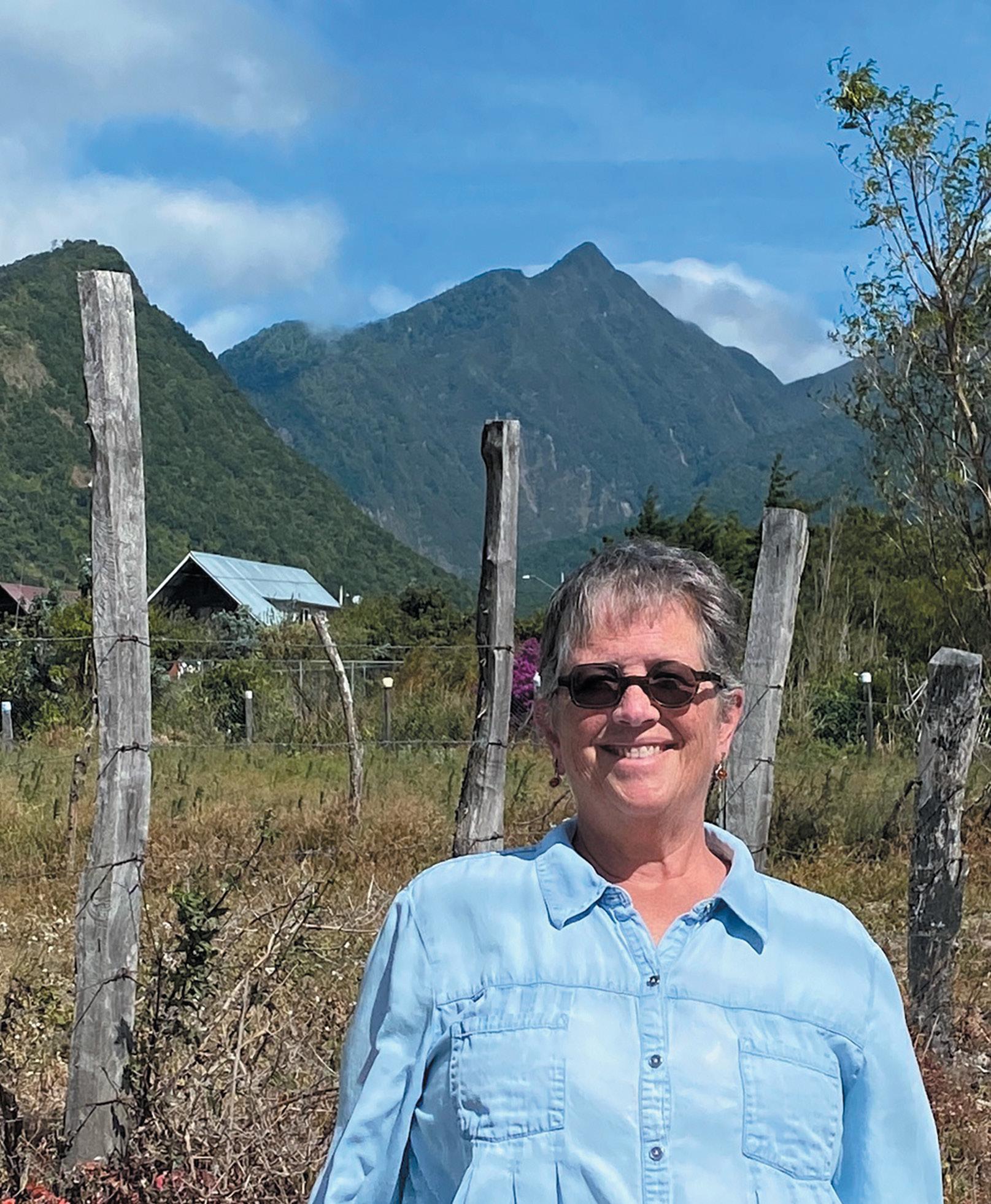
I was also hired by a Cornellian at my first job in Hong Kong, preparing tax returns for U.S. expats. After three years I left to join my husband in his family business, and we spent the next 30 years building our company. In 2008 we opened a small factory in China, producing textile products for U.S. and European name brands. Our factory was certified for organic cotton production, so making sure we met all the requirements was a big part of my work. In 2019 as Hong Kong became mired in protests, our factory became a casualty of the trade war. As we closed it down we pondered our next step and decided to move to Panama.
Cornell impact: My history advisor, Professor Jeffrey Brooks, encouraged me to travel abroad. After much consideration, I chose Ghana and loved it.
Benefits of living in a different culture: I enjoy learning about different beliefs, attitudes, and ways of doing and being. Not necessarily better or worse, just different.
What would you tell students: The modern world is so interconnected, but social media often puts us in an echo chamber reinforcing ideas we already agree with. People need to get out of their bubble, and travel is a great way to do that. Embrace the opportunity to encounter diverse cultures, connect with new faces, and temporarily set aside judgment. Keep an open mind, embrace humor, and be ready to laugh at yourself—it’s essential for survival.
Laurie Lemmlie-Leung ’78 at Volcan Baru, Panama.
LEMMLIE
18
COURTESYOFLAURIE
LEUNG
’78
Kevin Rosser ’92
Hometown: Denver, Colorado.
Current location: I’ve lived in The Hague in the Netherlands since 2008. Before that I lived in the U.K. for 10 years, and between 1992–94 I lived in Aleppo (Syria), Cairo (Egypt), and Sanaa (Yemen).
Career: I’m a sustainable finance project manager for a multinational energy company. I lead the company’s effort to comply with financial market regulations on disclosure of environmental, social, and governance information.
Why the Netherlands: A series of happy accidents. I set out expecting to become a journalist or an academic specializing in the Middle East. During graduate school I became interested in how natural resources shape the politics and economics of resourcerich countries. That led to a job with a research institute specializing in energy economics and, after a stint in consulting, a move into the industry. I never planned to settle abroad, but one opportunity led to another.
Cornell impact: My life changed on my first day at Cornell, when I made a spontaneous decision to enroll in a course on the Islamic Revolution in Iran. I became fascinated with the Middle East and continued pursuing my interest even after the visiting professor who taught that course
moved on. Two weeks after graduating, I was taking my first Arabic lesson in Aleppo. From there, I moved on to Egypt, Yemen, and eventually St. Antony’s College in Oxford to pursue a master’s degree. I still remember exactly where I sat in South Hall on that first day of class. Whenever I return to Cornell, I visit that classroom and reflect on the gift of my liberal arts education.
Benefits of living in a different culture: If there’s one thing I’d love everyone to experience, it’s the sheer pleasure of riding a bicycle in the Netherlands. The Dutch are passionate cyclists and lead the world in designing transportation systems that encourage cycling as a safe and sustainable option. I’ve traveled all over Europe on a bike, but my favorite route is in my backyard: following the North Sea coastline from The Hague to the Hook of Holland, up to the industrial port of Rotterdam, and returning through the farmlands around Delft. You can sample three great Dutch landscapes in one day.
What would you tell students: Meet the world with humility and curiosity. Everyone has something to teach you, from the market trader to the diplomat.
“Meet the world with humility and curiosity. Everyone has something to teach you, from the market trader to the diplomat.”

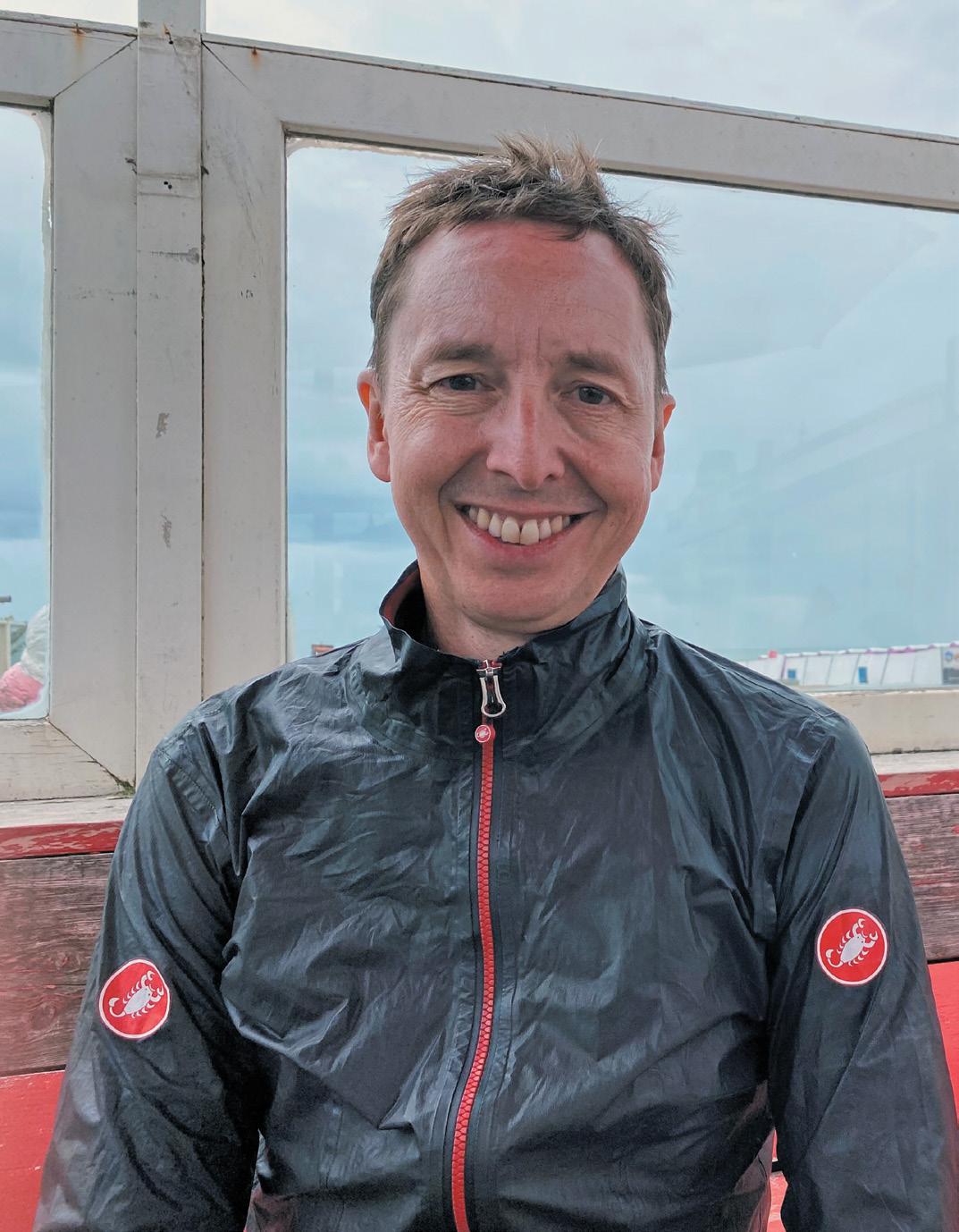
Netherlands
Rosser ’92 takes a break from cycling at the Hook of Holland.
19 CORNELL REPORT | SPRING 2024
PHOTO BY MARJA SMID
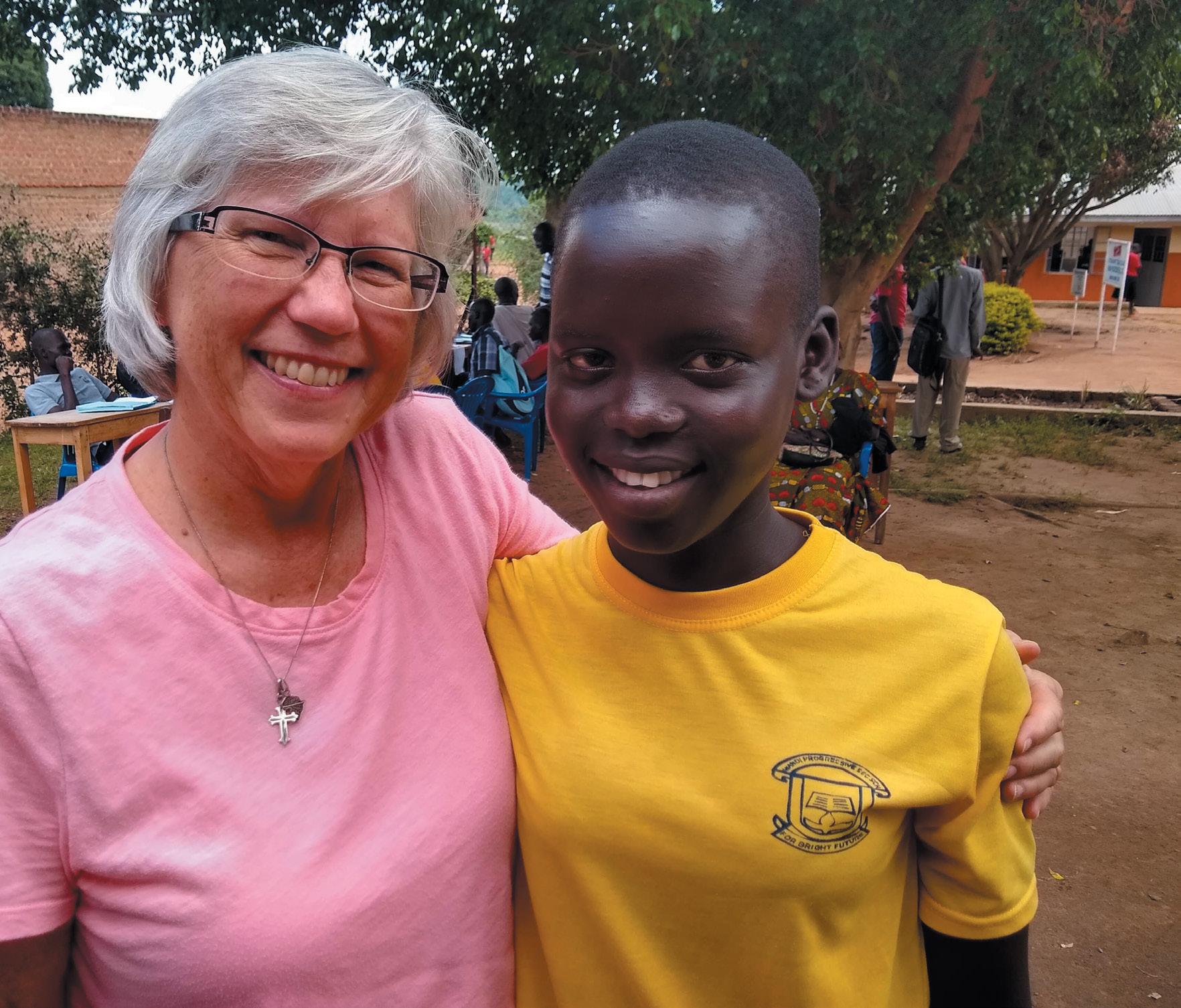
“Taking advantage of volunteering or working with organizations that serve refugees and immigrants can be a great way to see if a career internationally feels right.”
KENYA
Sharon Goodwin Fogleman ’75
Hometown: I grew up in many small towns in southeast Iowa but lived in Ainsworth, Iowa, in junior high and high school.
Current location: Coralville, Iowa, with intermittent medical missions, mostly in Africa.
Career: I worked for three years prior to attending med school at the University of Iowa and a family medicine residency in Waterloo, Iowa. In 1985 I married Lynn Fogleman (also a family physician), moving soon thereafter to Kenya, where we served for 10 years at Maua Methodist Hospital, followed by 14 years in southeast Kentucky at a rural health clinic. After our three kids grew up, we returned to Africa and worked in South Sudan, with a focus on disease prevention and health education. We were there from 2012 until the outbreak of war in 2016, after which we served in northern Uganda
near the refugee camps for two years. We still serve intermittently, mostly in Africa and the U.S., in health student mentoring and training facilitators in the Bible-based ministry of the Trauma Healing Institute.
Cornell impact: At Cornell I went to Germany for a semester with Experiment in International Living. It was an eye-opening opportunity that helped me feel comfortable with cross-cultural experiences. Then in med school and during my residency, I was able to travel to the Dominican Republic (where I met my husband), Sierra Leone, and Haiti. Each experience assisted in comfort with living longterm overseas.

Benefits of living in a different culture: After settling into life in Kenya, we had three children join our family (two sons I delivered and one daughter we adopted). One of the joys of living in Africa is the focus on family and community. That was my favorite part, which helped to overcome many of the challenges we dealt with daily in working within a hospital in a “low-resource country.” Hospitality is a special part of African culture which I enjoy and has helped me to develop that gift!
What would you tell students: Not everyone is called to live overseas; we can actually experience cross-cultural opportunities right here in Iowa or the U.S. Taking advantage of volunteering or working with organizations that serve refugees and immigrants can be a great way to see if a career internationally feels right.
Sharon Goodwin Fogleman ’75 with one of the South Sudanese students she has mentored, Mary, 18, an orphan who was evacuated to PHOTO COURTESY OF SHARON GOODWIN
20
Justin Clinton-Gohdes ’06
Hometown: Lone Jack, Missouri
Current location: New Plymouth, New Zealand. I have previously lived in Auckland, New Zealand; Beijing, People’s Republic of China; Würzburg, Germany; and Neubrücke, Germany.
Career: I worked as the strategy and commissioning lead for mental health and addictions for our region’s public health service. The role was disestablished in December 2023 as part of national health reforms, and I will take contract work for social service nongovernmental organizations and provide mental health counseling.
Why New Zealand: I was a resident assistant at Cornell and, coupled with the versatility of a Cornell degree, I ended up working in student affairs supporting university students and their transition into and through higher education. This work took me to Germany, China, back to Cornell, and finally New Zealand. I came to New Zealand to work at The University of Auckland in student accommodation. I fell in love with New Zealand and then a New Zealander. I’m now a citizen and have lived here for 10 years.
Cornell impact: My first time living away from home was to attend Cornell and, while there, my perspec tive of the world and its accessibility was completely opened. From a Plant Morphology course in the Boundary Waters to a singing tour of Italy with the Chamber Singers, Cornell allowed me the opportunities to expand my curiosity to a global scale.
Benefits of living in a different culture: Something that Cornell instilled in me was a love for being a lifelong learner. I find that being immersed in new places and spaces means learning opportunities are more frequent. I have been blessed and privileged to study Te Reo Māori, the language of Aotearoa New Zealand’s indigenous people, and to connect with local Māori Iwi. Learning about culture and customs while developing deep connections has enriched my life, and it’s not something to which you can be a spectator.
What would you tell students: I would tell them to learn of and be aware of your own culture and the cultural lens through which you view the world.
“Something that Cornell instilled in me was a love for being a lifelong learner. I find that being immersed in new places and spaces means learning opportunities are more frequent.”
NEW ZEALAND
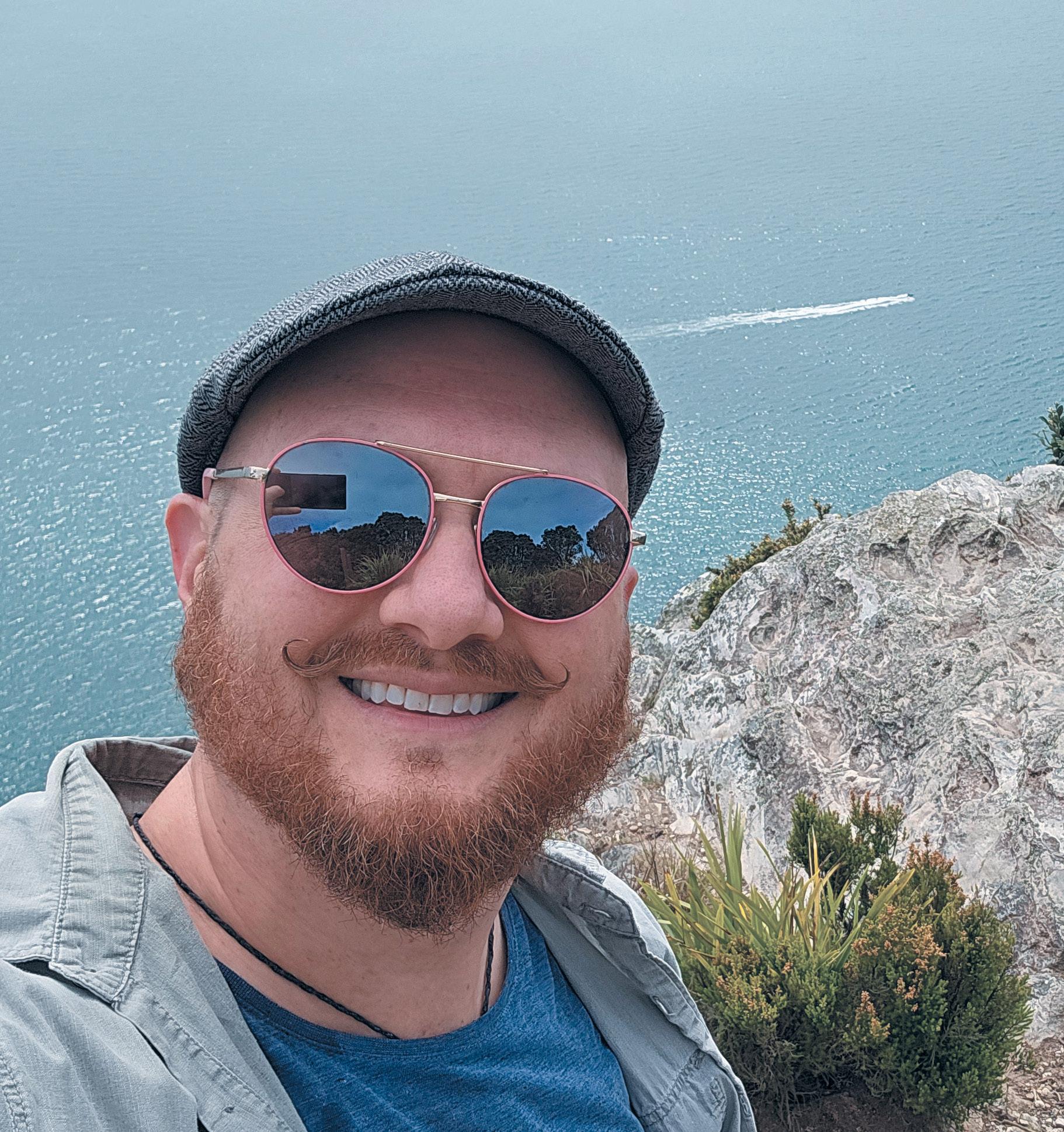

CORNELL REPORT | SPRING 2024
COURTESY OF JUSTIN CLINTON-GOHDES ’06
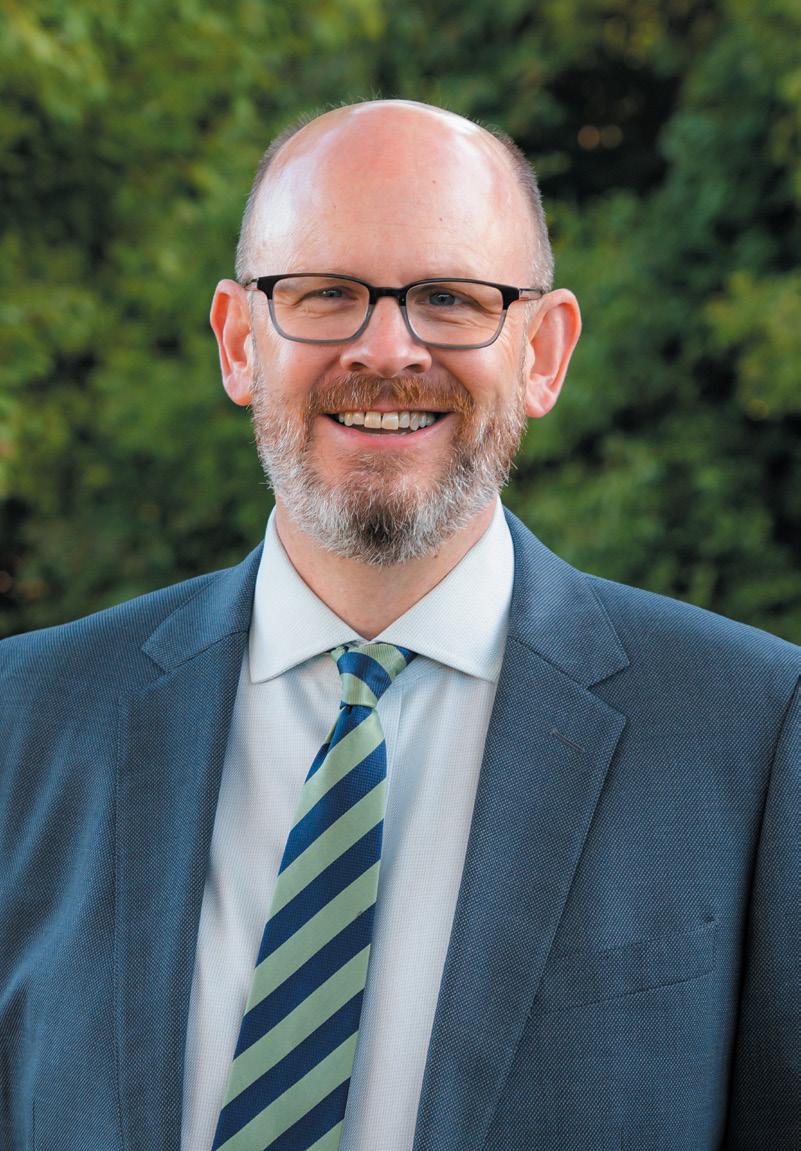
“I’ve been fortunate to work in environments that are dedicated to finding better ways to serve kids who otherwise fall through the cracks.”
KIRK SMOTHERS ’91
Leadership in learning differently
Kirk Smothers ’91 is head of school at Delaware Valley Friends School, where all the students have learning challenges. Since Smothers took over in 2015, enrollment has grown 55% to more than 200 students in grades 1–12. Located in the Philadelphia suburbs, DVFriends was founded in 1987 as the first Quaker high school dedicated to students who learn differently.
“The kids don’t like the word disability, so we don’t use it,” Smothers said.
Very few schools in the country specifically teach children who learn differently, and five are Quaker, he said. Some students at DVFriends have learning difficulties in reading, writing, or math. Some have ADHD or other disorders. But they are all intelligent and capable. They are taught in small classes by specially trained teachers, and 98% go on to college. Less than 5% are Quakers.
Smothers himself has followed a path of learning differently. He attended Cornell, studying One Course At A Time. He received a master’s degree from St. John’s College in Santa Fe and Annapolis, famed for its liberal arts Great Books Program. He received a master’s degree in education from Columbia University in the only program at the time that focused on private school leadership.
Entering Cornell, he says he was “a risky admit” with a C+ GPA, though he had good ACT scores and was active on the debate team.
“Looking back, I was probably a kid with undiagnosed executive function deficits,” Smothers said. “Being a student didn’t click for me until I got to Cornell. Focusing on one thing at a time was such a gift. I remember the terrific economics courses taught by A’amer Farooqi. He was brilliant and engaging, yet he knew exactly who I was.”
After graduating from St. John’s, Smothers worked for the college in admissions, moving from there to guidance counseling and then teaching and leadership roles at progressive schools in Maryland and New York City. Eventually he established a high school at a Quaker school in Brooklyn for students with learning challenges. This led to his present position.
“A career in independent schools was never by design,” he said. “As Quakers say, ‘a way opens.’ The profession chose me.”
Smothers started exploring Quakerism in the late ’90s, drawn by the religion’s spirituality, lack of dogma, and dedication to social justice. His wife, Sarah Clarke, is director of the Quaker United Nations Office in New York, which represents the Society’s concerns for peace and justice at the UN. They have a teenager, Casey.
“I’ve been fortunate to work in environments that are dedicated to finding better ways to serve kids who otherwise fall through the cracks,” Smothers said. “They are smart, capable kids for whom traditional education just doesn’t work. In most schools they feel they aren’t smart. They’re ostracized. But in schools like ours, they feel respected, trusted, supported. They feel loved. They come to believe in themselves and others— and hopefully make a better world for all of us.”
—DAN KELLAMS ’58
22 LIFE AFTER CORNELL
JODY ROBINSON
The Posse impact at Cornell
From urban areas to campus leaders
By Dee Ann Rexroat ’82
“There’s a real potential benefit to Cornell. These are students who have proven that they’re leaders and that they can get things done.”
—DeeAnn Grove, mentor for Posse 2
23 CORNELL REPORT | SPRING 2024
“Having Posse students in class has completely changed the dynamics of my classrooms.”
—Ajit Chavan, Assistant Professor of Computer Science
SHIRLEY ROMERO CARREON ’25 missed speaking in Spanish after she arrived at Cornell College, so she signed up for a second-semester adjunct Spanish class. The instructor mentioned to her that Gente, the campus Latine group, needed executive board members.
“I thought it was too much responsibility,” says Romero Carreon, who came from Dallas, Texas, in Cornell’s first Posse—a highly selective leadership scholarship program through the Posse Foundation that partners with Cornell.
She didn’t seek the nomination, but the word was out that she would be a good Gente leader and the group appointed her as their public relations chair for the following year.
While others might have declined the appointment, Romero Carreon tapped into her leadership potential when she returned as a sophomore. By then Gente’s president was no longer involved in the club, so she and a small exec board kept the club going. Over the next 12 months Gente’s budget grew from $3,000 to $16,000, and their Taco Night went from 20 attendees to 80 students in a line reaching out the door.
“People said they were grateful that the club existed. I also think it’s really cool that there are so many people coming to our meetings who aren’t Latino and want to learn more,” says Romero Carreon, now Gente’s president. “There is no way I could let go of this club now.”
Cornell becomes a Posse school
Three years ago Cornell College joined other top liberal arts colleges as a Posse Foundation partner. Since then the college has welcomed four supportive, multicultural teams—Posses—each up to 10 students from urban areas. The scholars complete extensive pre-collegiate training together, arriving on campus with a support system that allows them to thrive and become campus leaders who make a difference, like Romero Carreon.
The Posse Foundation has no requirements on race, gender, or household income. Its goal is to diversify viewpoints in leadership positions—on the campuses they populate, later in their careers, and in service to their communities.
Cornell Director of Admission Drew Shradel is closely involved in Cornell’s selection process for the Posse students.
“One of the most challenging things is to pick 10 students out of the finalists. Everything about them is so exciting,” he says. “It is a great opportunity to partner with a group to bring in high-quality students who are also hyper-involved in the campus. They come to campus and really change a community. They are excited and they have a support system, including a Posse mentor.”
After nearly three years and with four Posses on campus, Shradel says he has seen Posse Scholars become campus leaders and get involved in all aspects of campus.
24
“The fact that I was able to build a community here for other people makes me very happy.”
Community builder
Shirley Romero Carreon ’25 POSSE 1
FROM: Dallas, Texas
MAJOR: Biochemistry and molecular biology
ACTIVITIES: President of Gente, selected for Cornell LEADS (Leadership, Entrepreneurship, And Distinctive Service), career assistant in the Berry Career Institute, Cornell Summer Research Institute
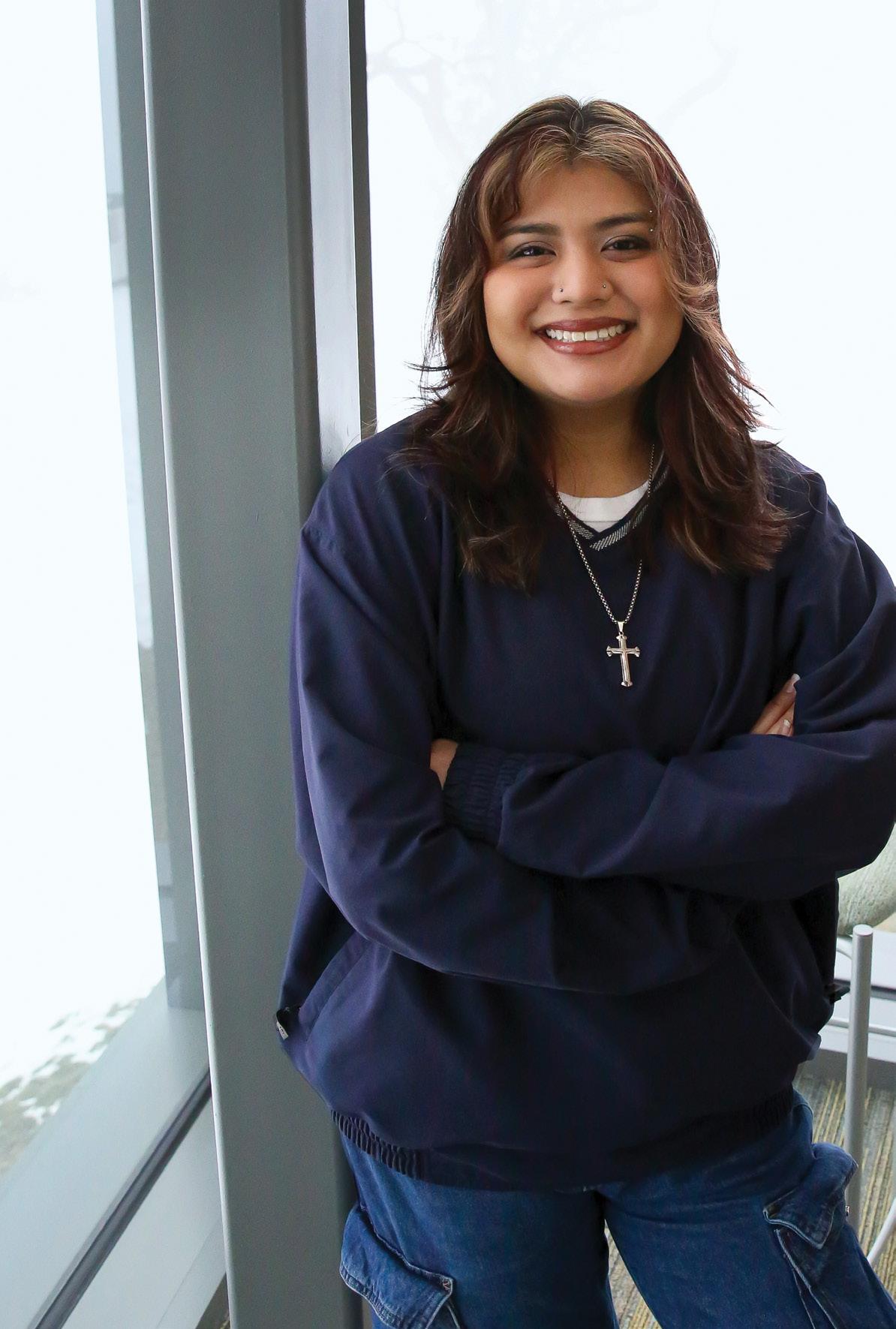
AS A POSSE SCHOLAR Shirley Romero Carreon ’25 completed a rigorous selection process to be chosen, first by the Posse Foundation and then by Cornell. Four hours after her final interview, she received a message that there was a question they forgot to ask.
The question (and answer): “What’s your favorite color? I hope it’s purple because you’re going to Cornell!”
Although she was at first hesitant about coming to Cornell and Iowa, she says she quickly realized she could not have chosen a better place.
“When I got here I found out it was a good match for me,” she says. “I cannot imagine myself anywhere else. I feel really connected to my professors. I like the relationships you can build with the staff here.”
She was expecting a culture shock coming from Dallas, Texas. And though she says it took a while to get used to strangers saying hi and talking to her, she’s now quite a fan of Mount Vernon.
“I love it here. It’s quiet and peaceful and I really love the way the sky looks at night,” she says. “I don’t have that in Dallas.”
Romero Carreon also says it was difficult coming to a predominantly white institution as a person growing up around people who look like her. Her response has been to use her leadership skills—something the Posse Foundation looks for in its applicants—to build community.
“I made a space for others and now I’m president of Gente [the campus Latine group]. The fact that I was able to build a community here for other people makes me very happy,” she says.
Romero Carreon arrived on campus in the fall of 2021 as part of the college’s first Posse Scholar group. Now in her third year she’s deeply involved in campus life and leadership, and she spent a summer working with Associate Professor of Chemistry Jai Shanata ’05 in the Cornell Summer Research Institute.
Next year she’s looking forward to welcoming a special Posse scholar to campus—her sister has been selected for the college’s Posse 4.
MEGAN AMR
25 CORNELL REPORT | SPRING 2024
Shirley Romero Carreon ’25
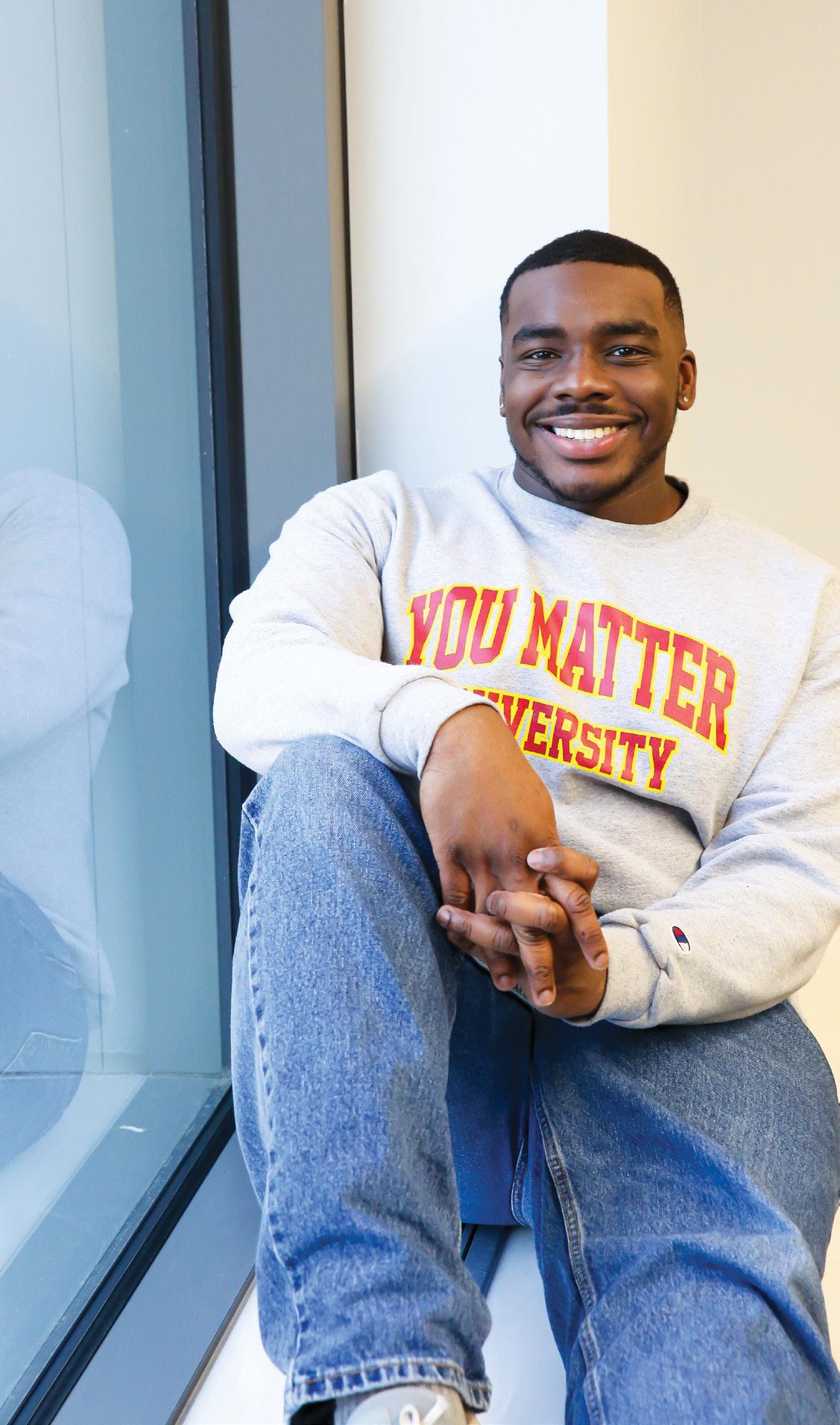
Team player
“We’re not here for ourselves. We’re a Posse, we help each other.”
Bryce Stevens ’26 POSSE 2
From: Philadelphia, Pennsylvania
Major: Engineering
Activities: Football, Info Desk student worker
ONCE BRYCE STEVENS ’26 WAS SELECTED for Cornell’s Posse 2 (the college’s second Posse, which arrived on campus in fall 2022), he and his 10-person posse began seven months of pre-collegiate training together. They learned how to navigate college, met virtually with a range of Cornell staff, and importantly, he says, they learned how to rely on each other, care about Posse, and care about their college.
“We’re not here for ourselves. We’re a Posse,” he says. “We help each other.”
After taking a few classes, Stevens says he discovered most everyone is helpful, not just Posse members.
“In a lot of the classes everyone helps everyone,” he notes. “Not everyone knows everything. We’re all here to learn. We can help each other. People are kind here. I’m from Philadelphia where people aren’t always as kind as that.”
When Stevens selected Cornell, he thought it was Cornell University (both Cornells are Posse colleges). After some research, though, he discovered the differences and was intrigued by One Course At A Time. Now he can’t imagine learning any other way, saying it allows him to focus.
“Once you get used to it you feel like you can accomplish anything,” he says. “You have to push yourself. The professors help you. When I was in computer science, I had trouble understanding and the professor said, ‘Come sit down with me.’ The professors care. They know the block plan is moving fast and they are there to help.”
When choosing scholars the Posse program looks for leaders. Stevens found leadership in an unusual venue—a sport he never played before. In high school he was highly athletic but had never played football. At Cornell he decided to see if he could join the Rams football team with no experience. He has played in almost every game as a defensive lineman.
The best leaders, like Stevens, put the team first.
“I’m always just trying to help and to get better to help the team win,” he says. “Last year we had the Navy SEALs come work with us. At that time I had injured my knee and I literally was a water boy. While it’s nice to be in charge and lead the way, I’m also just there to help however I’m needed.”
His favorite thing about Mount Vernon is the stars, which he sees at night coming back to his room after working at the Info Desk. “Iowa’s really beautiful,” he says.
MEGAN AMR
Bryce Stevens ’26
“Posse Scholars continue to push what ‘normal’ can look like on a college campus by challenging, creating, and giving to the new communities they’ve chosen to be a part of on campus.”
—Assistant Director of Residence Life Nicole Casal ’18
Academic impact
The Posse selection process is so rigorous that fewer than 4–5% of applicants are chosen. Not surprisingly, Posse Scholars make an impact academically, as well as throughout the broader community.
“Having Posse students in class has completely changed the dynamics of my classrooms,” says Assistant Professor of Computer Science Ajit Chavan. “They lead the classroom by setting examples of active participation and helping their classmates while working on group activities. Their presentations are well-polished, and they connect well with their peers while presenting.”
Lecturer in the Department of Education DeeAnn Grove, the mentor for Posse 2, notes that the scholars are excellent students, made even better during their months of pre-collegiate training as a posse. They are skilled in classroom engagement, in giving presentations, and in their ability to facilitate group work.
“There’s a real potential benefit to Cornell. These are students who have proven that they’re leaders and that they can get things done,” Grove says. “What is unique about Posse is the way they define leadership. They expand the understanding of what it means to be a leader in family and community. What Posse is really interested in is leaders who lead by modeling or who lead from behind. They are leaders who bring out the best in others versus somebody who takes command and tells everybody else what to do.
“For Cornell to say they are a Posse school is a perk that puts us in line with elite institutions.”
Mentoring and thriving
Each Posse is assigned a Posse Foundation-trained campus mentor who meets weekly to support them during their first two years.
Admission Representative
Kristin Vogel is Cornell’s newest Posse mentor, and she’s excited to work with Posse Puerto Rico in its first year. Last summer she joined other Posse mentors for five days of training in New York City. A few weeks later she flew to Puerto Rico for a retreat, where she met Cornell’s Puerto Rico Posse Scholars.
In addition to the weekly meeting or outing, Vogel meets individually with each scholar every two weeks.
She hosted her Posse in her home, where she had ingredients for them to cook Puerto Rican food. Five scholars who stayed over fall break joined her family for Thanksgiving. She regularly connects her scholars with campus resources and encourages them to take on “innovative roles of leadership—not what we would consider traditional leadership. To lead by example. For example, leadership through culture exchange is something unique with Posse Puerto Rico specifically,” she says.
Grove, Posse 2’s mentor, focuses their sessions largely on academics, such as how expectations differ from high school and negotiating how to reach out to faculty for support.
“We talk about how to become more effective and efficient learners, managing calendars, majors versus minors, how to identify internships, managing application packets, or going to the Writing Center to polish applications,” she says.
With leadership scholarships and ongoing mentoring and support from partner colleges, Posse Scholars graduate at a rate of 90%.
Leaving campus a better place
Assistant Director of Residence Life Nicole Casal ’18 is the Posse 1 and Posse 3 mentor. As a student development professional, she has noted their campus impact over the past three years. For example, she says, Posse Scholars have met with leadership to discuss changes to the First-Year Seminar, they have rebuilt student organization programs on diversity, and they have excelled in leadership positions such as resident assistants and student managers.
“Posse Scholars continue to push what ‘normal’ can look like on a college campus by challenging, creating, and giving to the new communities they’ve chosen to be a part of on campus,” she says.
Cornell brings in two Posses a year. Students like Romero Carreon, who rebuilt Gente and the community for Latine students, will continue to arrive and create positive change. As Cornell and Posse alumni, there’s no limit to what these students will achieve.
27 CORNELL REPORT | SPRING 2024
Writing coach
BECAUSE OF HER PRE-COLLEGIATE TRAINING with her Cornell Posse, Ren Solis-Roman ’27 felt exceptionally prepared to come to Cornell. She is part of Cornell’s Posse 3 group, and like all the Posses they participated in weekly training sessions for months before setting foot on campus.
“We learned about the Writing Studio and the Quantitative Reasoning Studio from people at Cornell,” she says as examples. “We were getting experiences that others only get once they’re here. That’s helpful because I know where to go and I have people to go to.”
As part of the Posse Scholar process, Solis-Roman ranked the Posse colleges to indicate her top choices. In her second interview to establish whether she would be accepted to the program, she was asked why she was interested in Cornell. Her answer: She was attracted to a smaller school in a small town with a creative writing program. One Course was a plus, but not a deciding factor, she says.
Now in her second year at Cornell, she is a fan of Cornell’s distinctive learning style: “One Course At A Time is truly helpful and beyond what I would ever have expected.”
She has immersed herself in writing and literature—in classes, as a writer and podcaster for The Cornellian, and as a student worker in Cole Library, where she often assists the public library patrons, especially children.
“I have a lot of good professors and ones who know how to bend to students’ needs. I really liked Rebecca Entel’s Novel Writing course. I’ve never had so much time to sit with my writing. I’ve grown a lot.”
Solis-Roman shares her writing talents with her Posse too.
“I’m the token English major and help others with their writing and emails,” she says. “My Posse group has a diverse set of interests, so I know somebody who is good in math and one in physics. I’ve been able to rely on them to prepare mentally for the courses I’ve been in.”
And she’s embraced Mount Vernon, one of the reasons she chose Cornell. Solis-Roman, who is from Denver, Colorado, says she’s building relationships with locals, like the owners of Silver Spider, a gift shop, and Fuel, a coffee shop.
“I’m not used to a small town and it’s nice to experience that closeness,” she says.
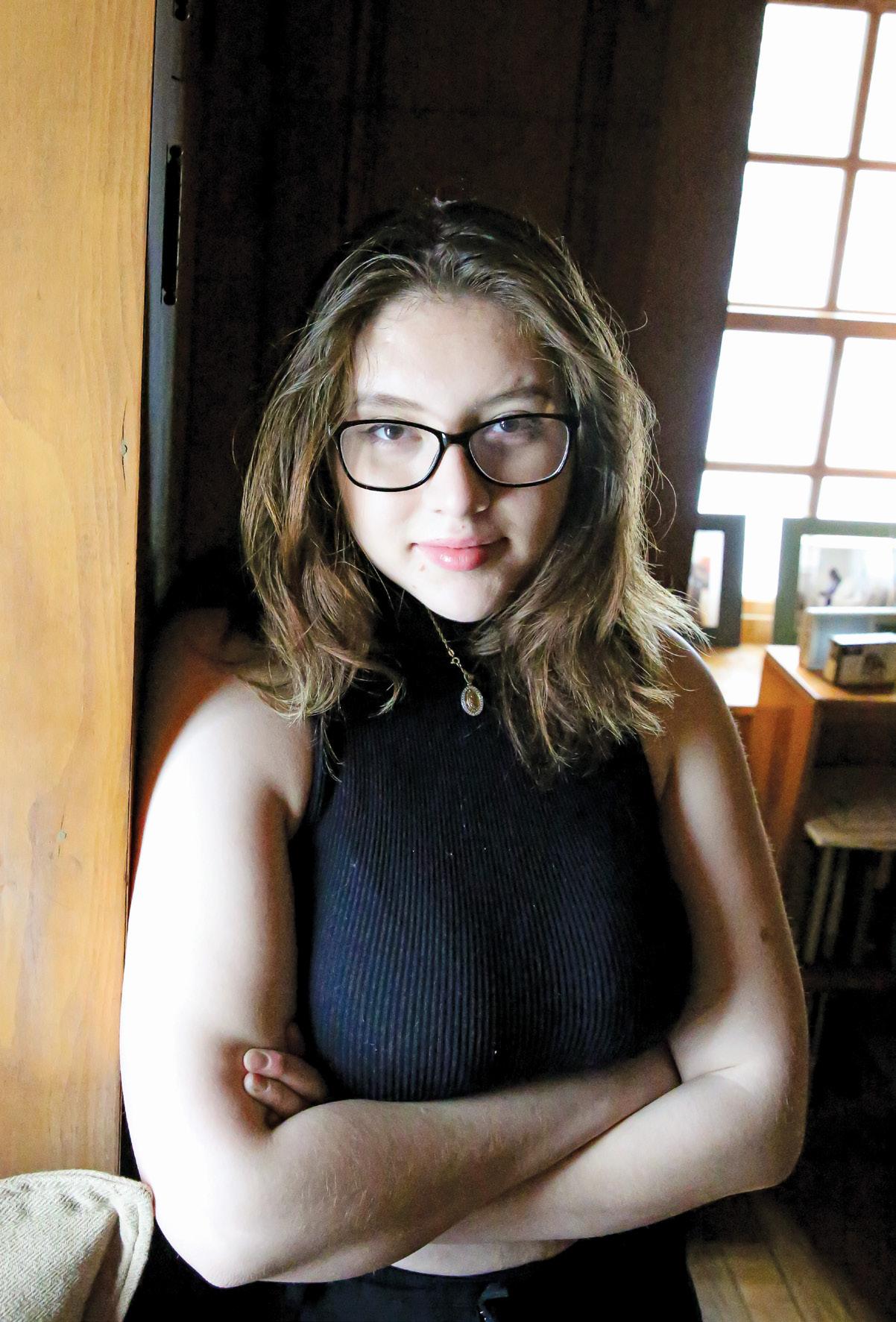
Ren Solis-Roman ’27
POSSE 3
From: Denver, Colorado
Major: English—creative writing
Activities: The Cornellian, Cole Library student worker
“We were getting experiences that others only get once they’re here. That’s helpful because I know where to go and I have people to go to.”
Ren Solis-Roman ’27
MEGAN AMR
Posse
founder:
Cornell is a ‘warm community’
“We’re sending incredible students to Iowa, and they’re coming from unlikely places like Puerto Rico, so you want that community to be warm and welcoming and it is at Cornell. With Jonathan Brand and his team at Cornell, we’ve felt very good about the partnership.”
—Deborah Bial, Posse Foundation President
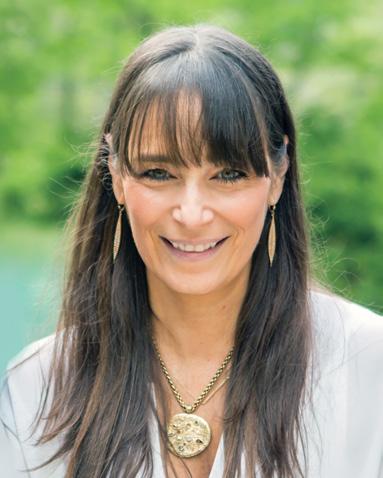
THE IDEA for the Posse program came to founder and Posse Foundation President Deborah Bial in 1989 while she was a youth counselor in New York City. When she asked one of the students why he had dropped out of college, he told her he would have stayed in school if only he had his posse to support him.
Bial started her foundation to create posse support groups for students, with a selection process focused on urban students who might otherwise be overlooked by traditional admissions processes.
Together with the nation’s top liberal arts institutions, Posse is building a leadership network that better represents the voices of all Americans. In 2007 Bial was awarded a MacArthur “Genius” Fellowship for her work.
The Cornell Report spoke with Bial to find out how Cornell was chosen as a partner and how the program benefits not only the scholars but also the Posse colleges.
What did you see in Cornell College that made it a good fit for Posse?
We partner with the top-ranked institutions of higher education in the U.S., looking at the top 150 liberal arts and research universities. We care that you care, as an institution, about equity and inclusion and diversity and leadership, and that you understand how important it is to connect that to merit. Maybe the most important thing is that the president of the institution not just buys into it but really invests in it. And [Cornell College President] Jonathan Brand did that from day one. Honestly, he’s a wonderful person. He’s warm, he’s caring, he invests in the students, and you can see that manifested in how he interacts with them—having dinner with them, hanging out with them on campus, just being optimistic and believing in them so much, and I think that affects a community. The leadership of the president is very important, and Jonathan has demonstrated that and then some and is a really good partner.
29 CORNELL REPORT | SPRING 2024
Deborah Bial
Bringing the fun
“A lot of the Cornell Posse students bring leadership and diversity, and I feel like we make Cornell more fun, especially the Puerto Rican Posse. We are very fun to be around.”
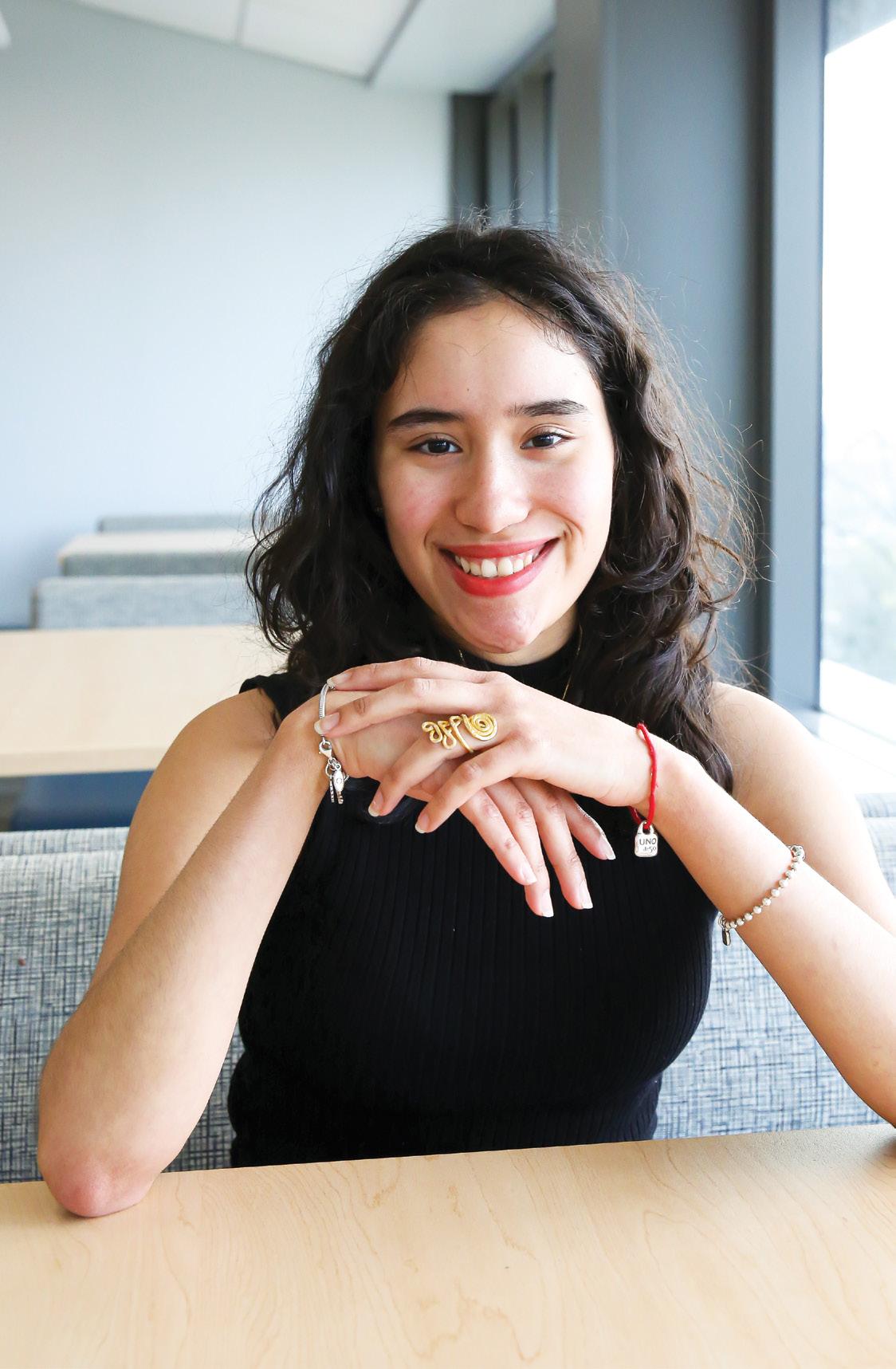
Claudia Collazo-Ramos ’27 POSSE PUERTO RICO
FROM: Gurabo, Puerto Rico
MAJOR: English—creative writing
ACTIVITIES: Mock Trial, Bon Appétit student worker
THIS IS THE FIRST YEAR for Posse Puerto Rico, and when Claudia Collazo-Ramos ’27 was accepted as a Posse Scholar, she had three choices of colleges. She chose Cornell College.
“I feel that Cornell has been a good place for us to start our journey into adulthood. If the 10 of us had been thrown into New York City, without One Course At A Time, the feeling would be very different,” she says. “We’d have to be more careful when we go out into the streets. It definitely was a relief for my family when they found out I was going to Cornell. Mount Vernon is a way more relaxed place to live.”
Half of Posse Puerto Rico weren’t able to go home for Thanksgiving, and their mentor, Admission Representative Kristin Vogel, drove them to her family’s gathering in Fort Dodge, Iowa. The most surprising thing to Collazo-Ramos was that the event finished by 4 p.m. instead of midnight like a typical Puerto Rican party, she says.
“I think, in general, we bring fresh minds that are not from the area. A lot of the Cornell Posse students bring leadership and diversity, and I feel like we make Cornell more fun, especially the Puerto Rican Posse. We are very fun to be around. When you see us in different activities when we go out we bring this energy that’s very us.”
The Posse meets weekly with Vogel to reflect, talk about college life, or do an activity. On Halloween weekend they went to her house to cook Puerto Rican food. The Posse Scholars bonded well before arriving on campus and often help each other with classes or talk about things that are bothering them or that they are excited about, she says.
Collazo-Ramos plans to major in creative writing and enjoyed her first English class: “The professor was very good. You could notice that he really enjoys teaching, and he gave good feedback on what I presented in class,” she says.
Claudia Collazo-Ramos ’27
MEGAN AMR
And really your whole team is great. It’s a warm community at Cornell. We’re sending incredible students to Iowa, and they’re coming from unlikely places like Puerto Rico, so you want that community to be warm and welcoming and it is at Cornell. With Jonathan Brand and his team at Cornell, we’ve felt very good about the partnership.
What do you mean by merit?
We just had a Supreme Court decision that effectively banned the use of race in college admission, and there’s no more affirmative action in that respect. Posse stands apart because it’s a merit program. For so long people have associated diversity with deficit. It should be the exact opposite. It’s not the young people we’re trying to fix, it’s our systems and our infrastructure and our policies and those things that have kept people out because we’ve been too narrow in the way we’ve defined merit. With Cornell and Posse together, we’re really investing in leadership and an idea of merit that looks beyond test scores and instead considers the many different qualities that make a student a good fit for a top school.
There’s one thing that people sometimes get wrong–they think of Posse as a program for racially or ethnically marginalized students, or those at risk of not reaching their full potential. It’s not that. Each year we interview 17,000 students from different backgrounds, and this year our schools picked 900. It’s very selective. While it’s nontraditional and we care about getting diverse groups—more than 50% are first-generation, 80% of them identify as students of color, and most are from the lowest economic quartile—we don’t screen for these qualities, and we ask our institutions not to screen for them either. It truly is a merit leadership program, which makes a big difference and is so important in this day and age.
What kinds of benefits have you seen over the years for Posse partner campuses?
A number of years ago we interviewed Posse mentors and published a mentor report. Many of these mentors say this might be the single most important thing they did in their career. And these are incredible professors, very serious people who are doing research. But they’re taking time to not just work with Posse Scholars and support them but to become part of a community of mentors across the country and deepen the way they think about diversity and equity
and inclusion. We have a training program for mentors. They come to New York with faculty mentors from all of our other schools. We talk about leadership and merit, diversity and equity, and how to support students and support them in their leadership pursuits. And imagine every year you’re getting a different faculty member and you’re beginning to build a community on your campus who are not just trained in understanding DEI but who are participating in the program and in community building—what we call integrated diversity.
For many years we thought about racial and ethnic diversity as a siloed thing where people would be in their groups defined by race. A lot of schools would put all the programs for students of color under one person. What you do when you begin to partner with Posse is you begin to build a community of faculty, administrators, and staff who all invest in building a community of integrated diversity, a community that embraces relationships across similarities and differences. And so I think that’s a huge benefit that a college gets when they partner with Posse.
There are now more than 13,000 Posse Scholars and alumni who have more than $2 billion in support. They graduate at a rate of 90%, and they’re getting the Cornell alumni network, and they’re getting the Posse alumni network.
What is the larger impact?
When you join this network of Posse institutions, you are contributing to the fabric of American society in a powerful way. I think about these really, really complex times we’re living in—very connected to race and gender and religion and class and how it intersects with politics—and we need leaders who come from different backgrounds, who can take on positions of influence and power and be sensitive and caring and understand that there are many voices that need to be part of the process. So when Cornell College becomes part of the Posse community, it’s part of the solution to that very big challenge that we have. Because, right now, we don’t have leaders who represent the diversity of the American population. The United States Senate is almost 90% white, and a quarter of our senators are women. And you look at industry Fortune 500 CEOS or partners in law firms, it’s still a very homogeneous group of leaders. And you need everybody! When you have diversity in the room you make better decisions.
31 CORNELL REPORT | SPRING 2024
ALUCAS HALDEMAN ’99 AND SARAH ROUDYBUSH ’99
Pioneers in smart technology for rental housing
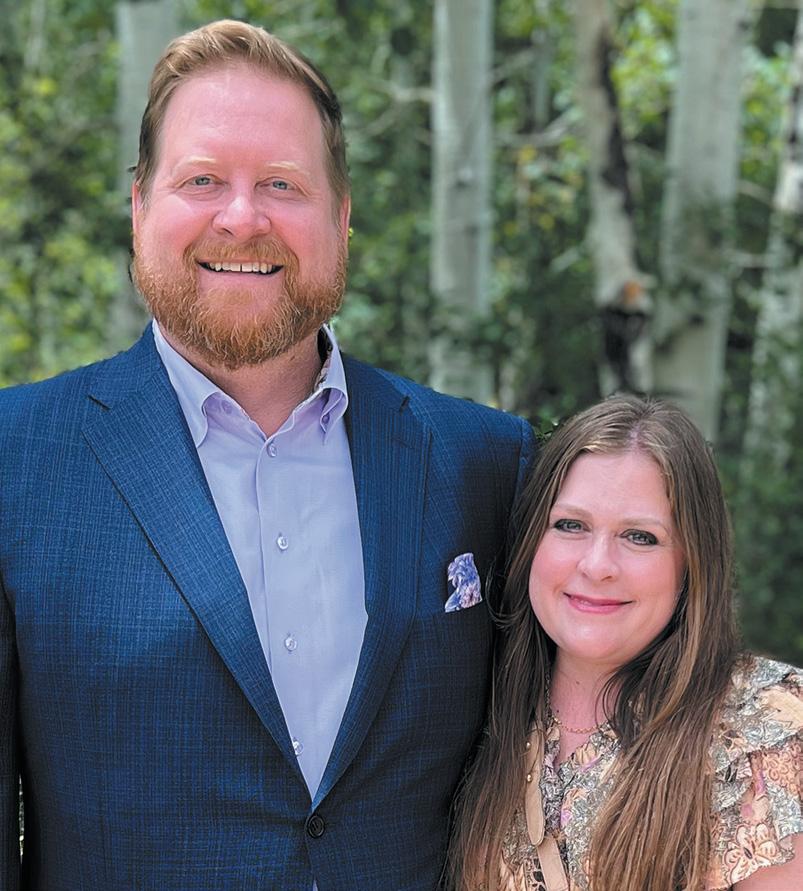
Afew years ago Lucas Haldeman ’99 was chief technology and marketing officer for a real estate management company that specialized in rental homes—and he was frustrated. He wanted to use smart technologies—such as programmable keyless entry, remote thermostat and lighting controls, and leak detection—to increase efficiency and reduce expenses, but no company offered all those services in a coordinated package.
So in 2016 Haldeman and his wife, Sarah Roudybush ’99, decided to create that company.
Today, SmartRent, based in Scottsdale, Arizona, is publicly traded, has more than 500 employees, and annual sales exceeding $200 million. It’s the market leader in rental housing, and its solutions are in more than 680,000 homes and businesses across the country. SmartRent not only has grown rapidly and attracted major investors, but also has dramatically expanded its services, which now include access control, self-guided tours, parking management, and community-based Wi-Fi.
s an entrepreneur with multiple businesses, Lauren Buckner ’99 is often asked how she juggles it all. Her solution is to block plan her life.
d my happiness. I felt really safe there. The best of the best people from everywhere came there.”
—DEE ANN REXROAT ’82
or college residence halls, offer promise. International expansion is “on the radar,” Haldeman said.
“We try to maintain a scrappy, start-up mentality,” he said, “But we are also stewards. We must measure the opportunity cost of new initiatives. Our resources aren’t infinite. We are intentional, focusing on where we can make the greatest impact now while planning for how we can scale and grow this effort in other ways in the future.”
Haldeman is chief executive officer and the voice of the company to potential customers and investors. Roudybush, chief of staff, plays a critical role in guiding day-to-day operations, ensuring everyone understands the company’s priorities and areas of focus.
Both are engaged in strategic planning and here they see a multitude of opportunities. For starters, there is ample room for growth with SmartRent’s primary market, multifamily rental housing, with more than 44 million institutionally managed apartments in the U.S. Other group living arrangements, such as senior-focused
“Some books I read as a first-year Cornellian still impact the way I view the world.”
“There are no answers in the back of the book.”
—Sarah Roudybush —Lucas Haldeman MIKE MUELLER
While management companies are SmartRent’s primary customers, Roudybush said, “We are also deeply concerned with making life better for renters, who are finally beginning to experience the benefits from smart technologies that homeowners have enjoyed for years.”
Roudybush and Haldeman have founded several successful businesses over the years. They also remain connected to the eastern Iowa farming community Roudybush grew up in, by overseeing her family farm operations near Letts, Iowa.
The couple met at Cornell early in their first year. Haldeman was so impressed with Roudybush that he switched courses to join her class in Block 3. They began dating and have been together ever since. They married in 2003 and have three children.
Haldeman credits Cornell with sharpening his ability to think critically.
“It’s the most valuable skill you can give anyone,” he said, “and that is especially so for an entrepreneur. There are no answers in the back of the book.”
For Roudybush, the opportunity to study in Chicago and Mexico “was transformative. I still think about those experiences today. Some books I read as a first-year Cornellian still impact the way I view the world.”
—DAN KELLAMS ’58
32 LIFE AFTER CORNELL
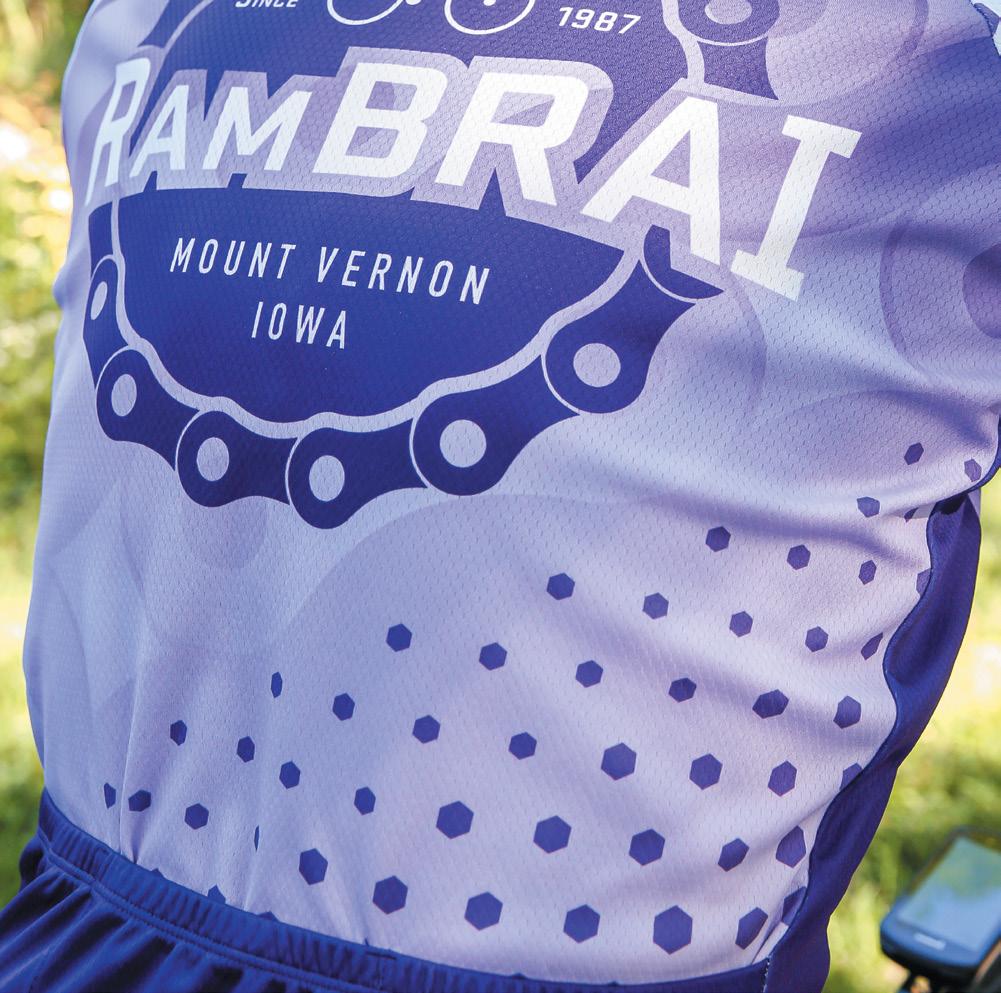

Life After Cornell Emeritus Style
 By Dee Ann Rexroat ’82 Photography by Megan Amr
By Dee Ann Rexroat ’82 Photography by Megan Amr
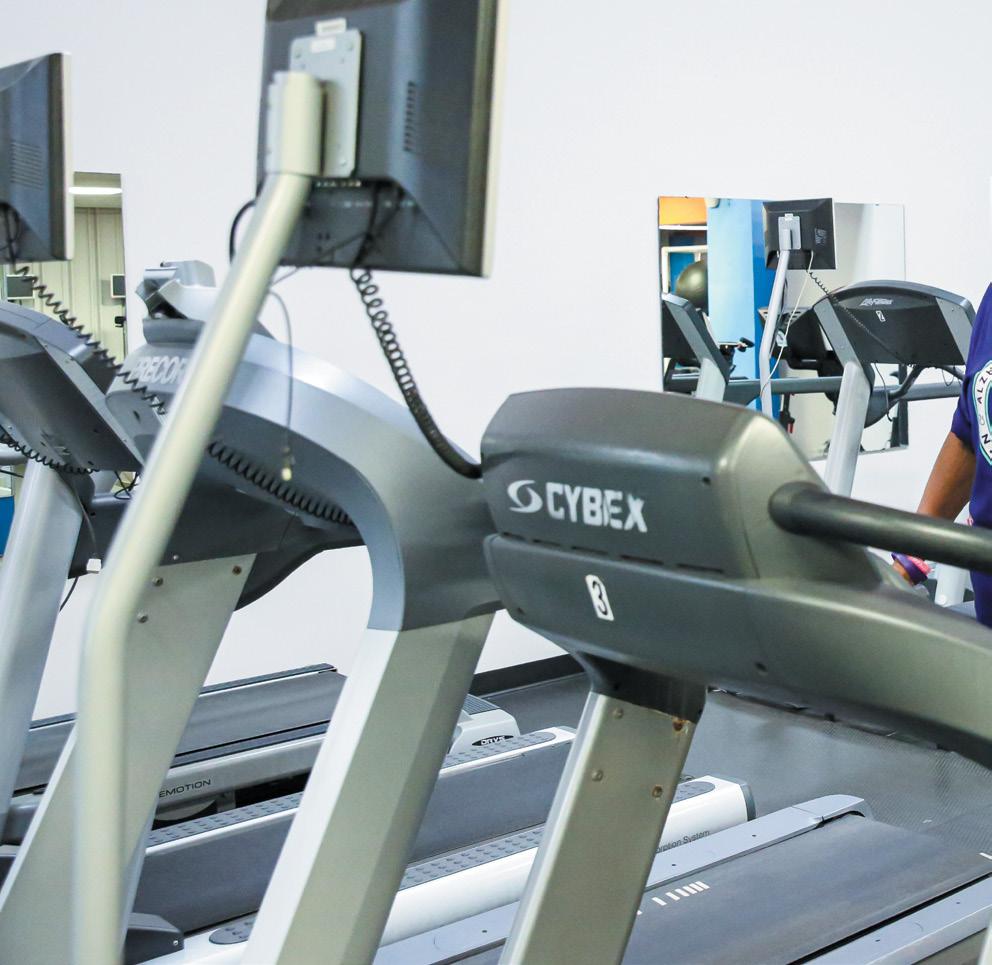
Life after Cornell isn’t just an alumni phenomenon. Cornell has 44 emeriti professors who left the Hilltop seeking fulfillment in retirement. In this installment of a recurring series, we caught up with five of them. After careers devoted to the college and its students, they are now master gardeners, cyclists, Big Brothers, volunteers, fundraisers, weavers, and writers.

See two previous emeriti life after Cornell features from spring 2018 (crnl.co/emeritifaculty) and fall 2018 (crnl.co/emeritifaculty2).

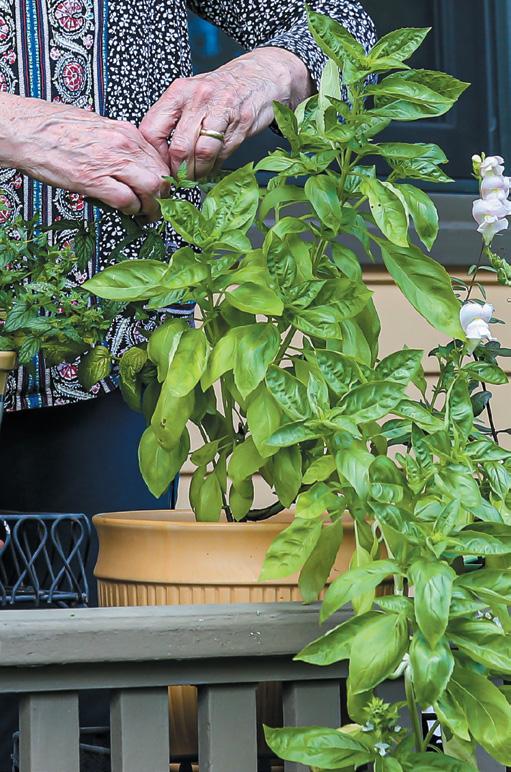
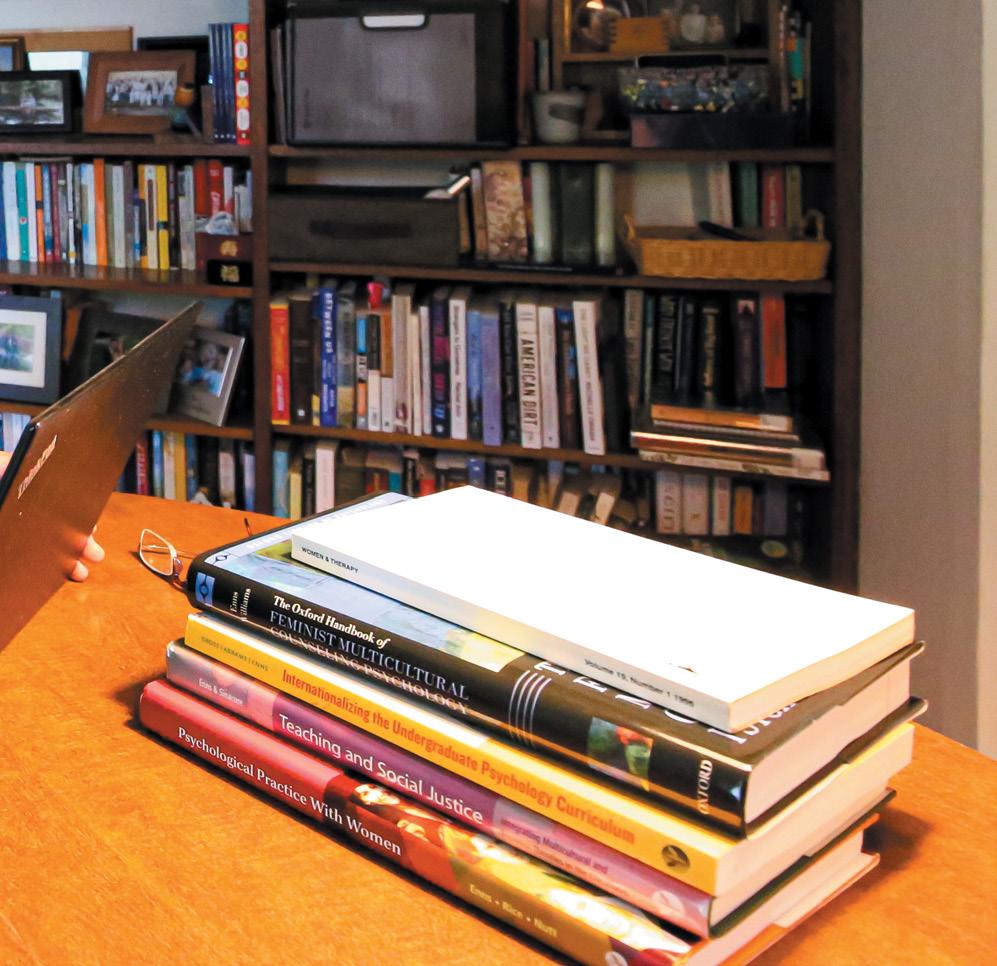
33 CORNELL REPORT | SPRING 2024

Alfrieta Monagan Anthropology, 1990-2015
Alfrieta Monagan still resides in the Iowa City home where she raised her identical twin daughters (who now live in Seattle and Boston with her four grandchildren). She’s a founding member of her neighborhood association and, since retirement, works out three days a week at the North Dodge Athletic Club. “Going to the club is an opportunity to see people and feel better. We bond with one another and care about each other,” she says. Once president of Iowa City’s Districtwide Parents Organization, now her time is given to a nonprofit called TRAIL (Iowa’s first aging-in-place organization) and the Alzheimer’s Association, for which she fundraises each year to help find a cure.
34
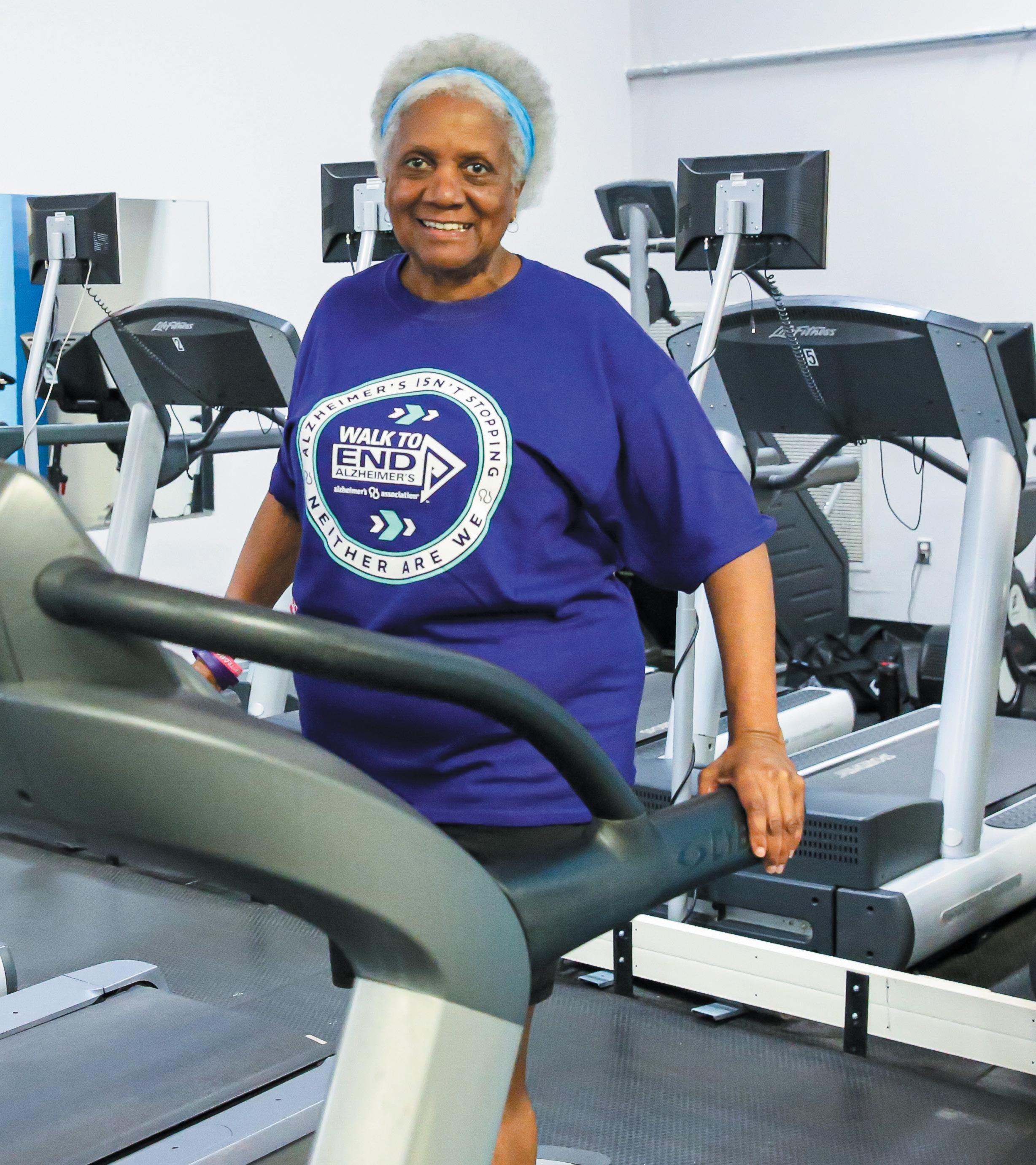
35 CORNELL REPORT | SPRING 2024
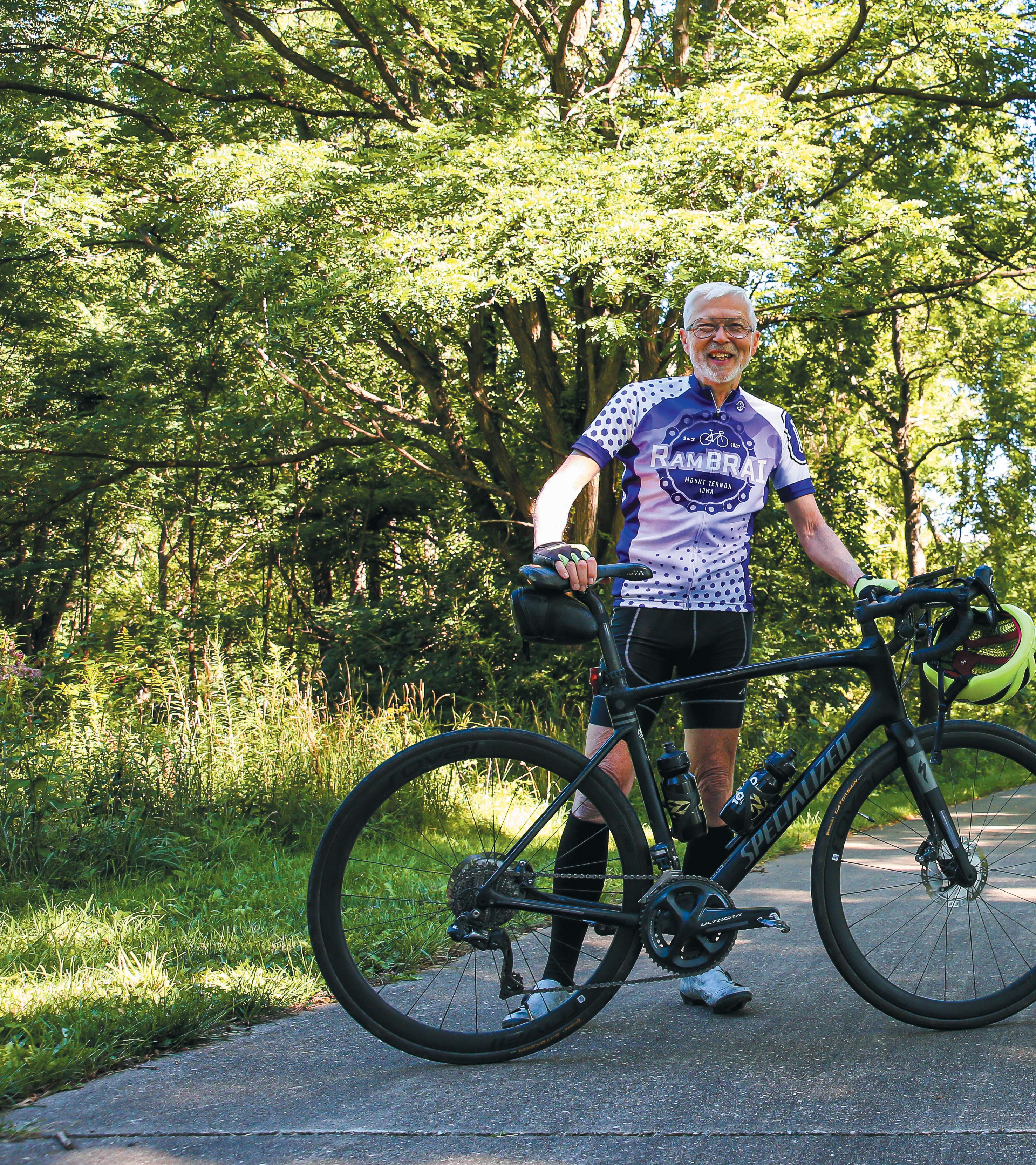
36

Craig Allin Politics, 1972–2017
There’s no question that Craig Allin’s major retirement activity is cycling. He and his wife, Liz Sparks ’75, chose both of their residences (in Coralville, Iowa, and Tucson, Arizona) based on proximity to biking trails. In 2023 he logged 7,896 miles. “It’s a perfect speed with which to move through the world,” he notes. He says teaching at Cornell “was always first and foremost about the students,” so rather than spend too much time working on the half-written book he knows he’ll never finish, he still teaches courses in his head, where he mentally revises his Constitutional Law syllabi based on developments in U.S. Supreme Court cases.
37 CORNELL REPORT | SPRING 2024
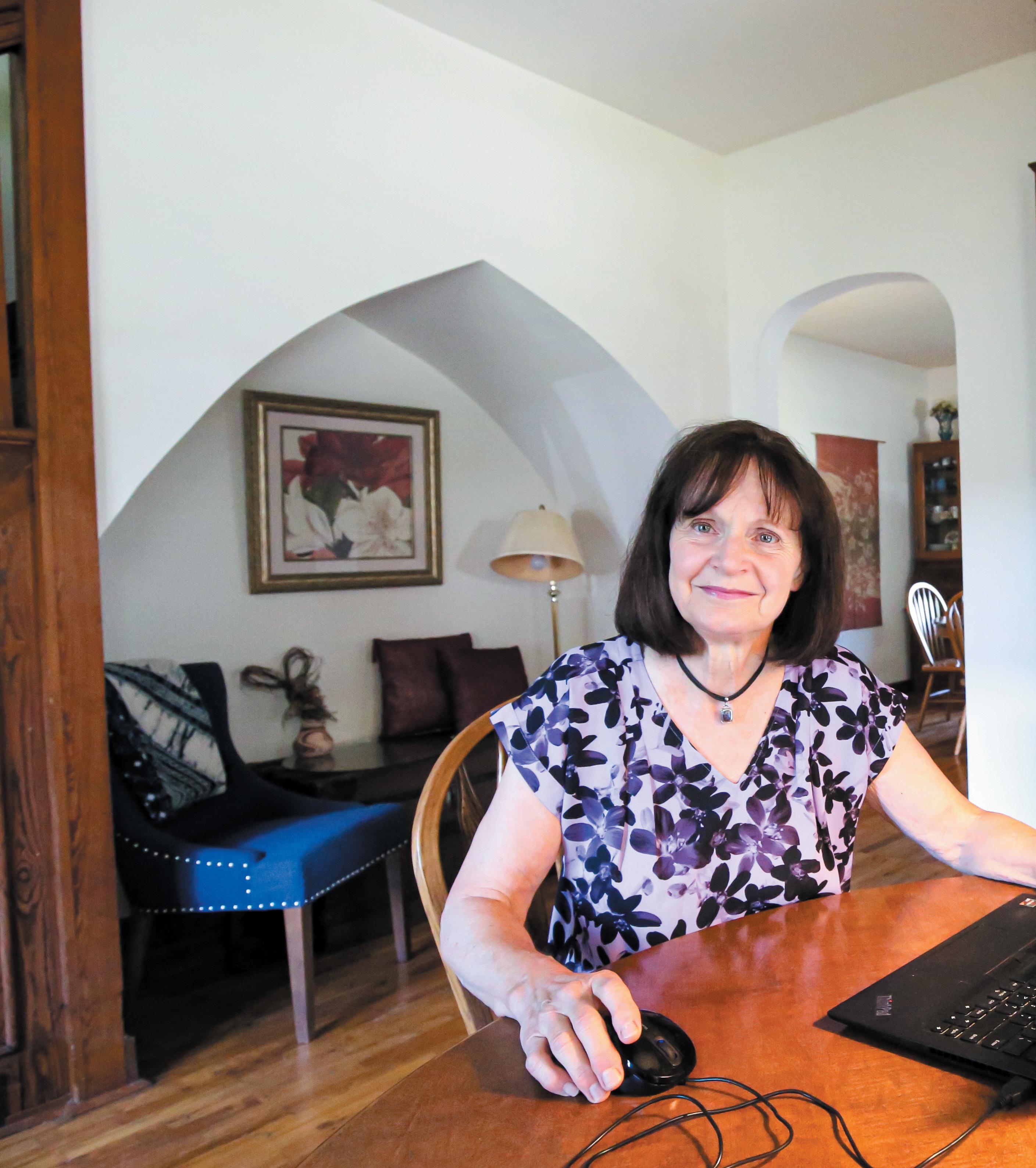
Carolyn Zerbe Enns Psychology, 1987–2018
Carol Enns taught on campus and for Semester at Sea the year after retiring. A year later she began working as a volunteer counselor/psychologist at Cornell’s Counseling Center, continuing for three years during the pandemic. She’s active in her profession, often working from her kitchen table in Mount Vernon on projects such as co-editing a special issue of Women and Therapy, serving on a task force for the American Psychological Association, participating in peer review activities and committees, and writing. She and her husband spent the first three months of the COVID-19 lockdown as full-time caregivers for a grandchild in Pittsburgh, and throughout the pandemic found ways to make numerous short international trips.
38

39 CORNELL REPORT | SPRING 2024
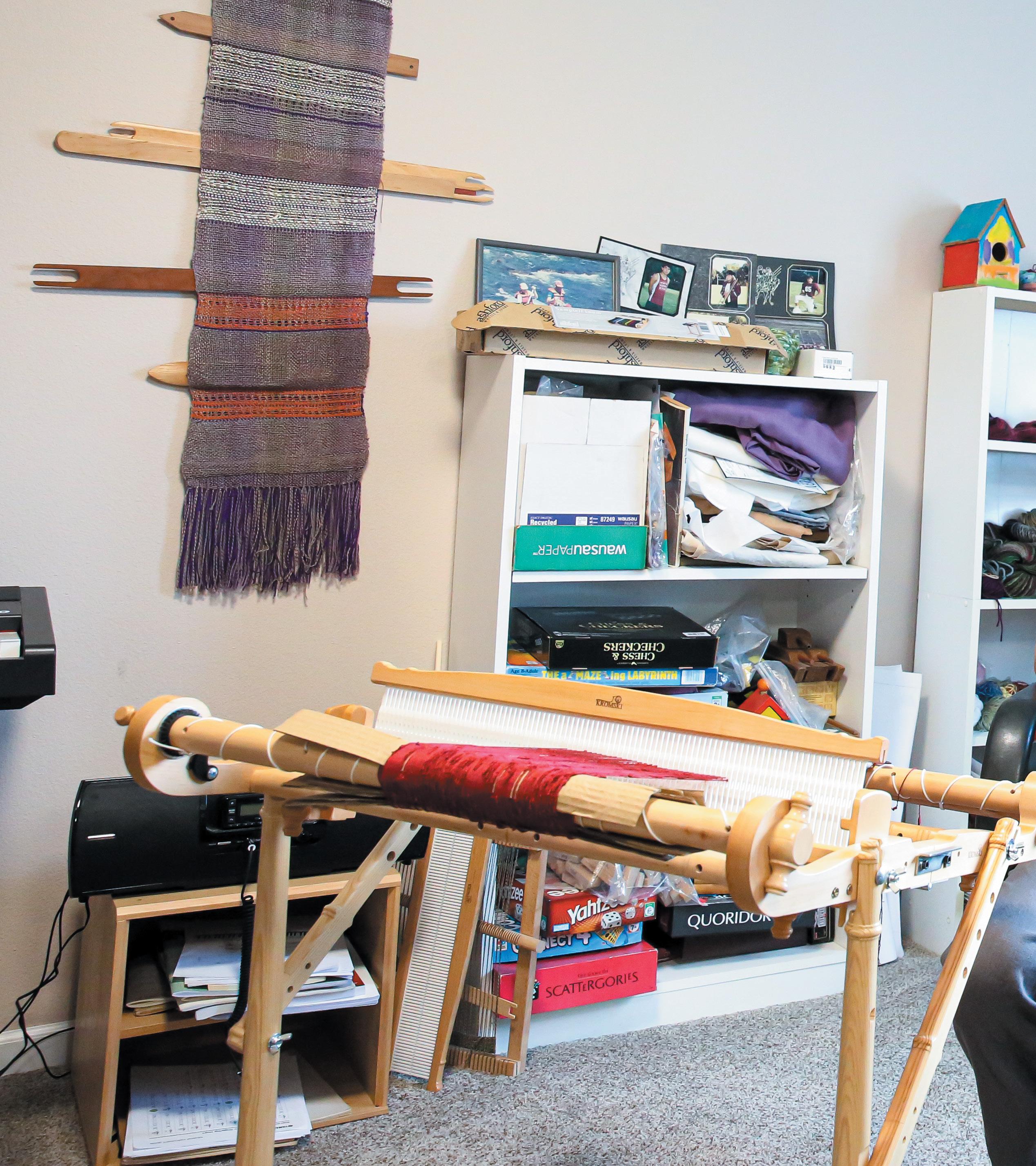
Chris Carlson Sociology, 1980–2007
Soon after retirement Chris Carlson’s wife taught him to knit, but after making dozens of hats and sweaters, he wanted something new. So during the pandemic he learned tapestry and fabric weaving. “I like doing close work and love the color and texture of different yarns, combined with the structure and design involved in weaving,” he says. He has worked for 10 years as a simulated patient and physical exam teaching associate at the University of Iowa College of Medicine, keeping him in contact with students. He’s served on the board of the Housing Fund for Linn County and on Mount Vernon’s Housing Commission, and he’s been a Big Brother for six years. As if that wasn’t enough, this grandfather of three golfs regularly, travels, and works part-time at Mount Vernon’s wellness center.
40
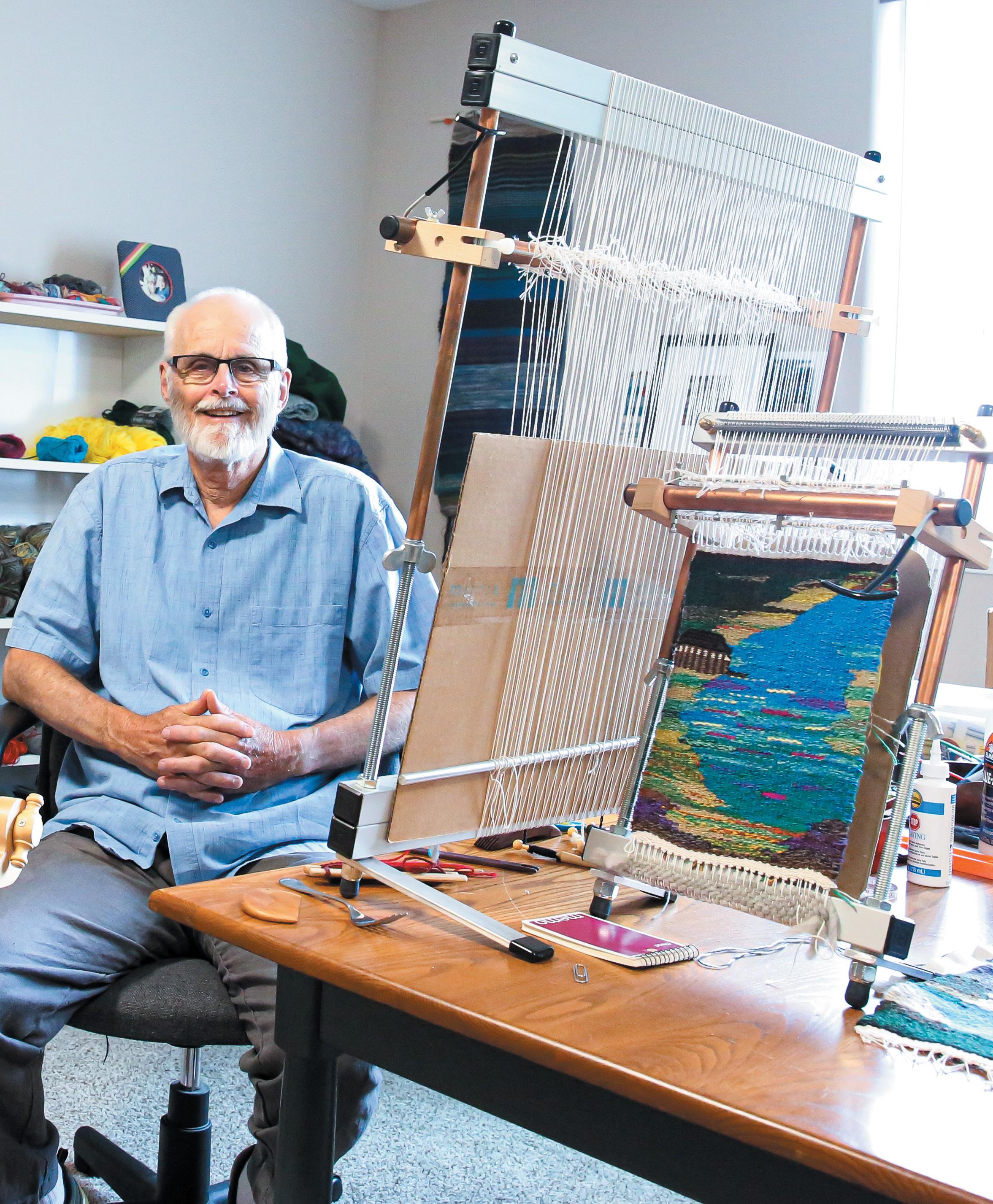
41 CORNELL REPORT | SPRING 2024

Suzette Astley Psychology, 1982–2018
After retirement Suzette Astley joined the Mount Vernon Historic Preservation Commission (she lives in one of the town’s historic homes), recently completing a term as chair. She also joined Mount Vernon’s oldest book club and became a Master Gardener. “I’m gradually converting my flower gardens to native plants to help monarchs and other pollinators—and the birds that eat them,” she says. She volunteers for the Master Gardeners and at the vegetable garden that serves the Southeast Linn Community Center pantry. Between those activities and becoming a more adventurous cook, she and her husband have made four international trips, including to one of the areas of Mexico where monarchs overwinter.
42
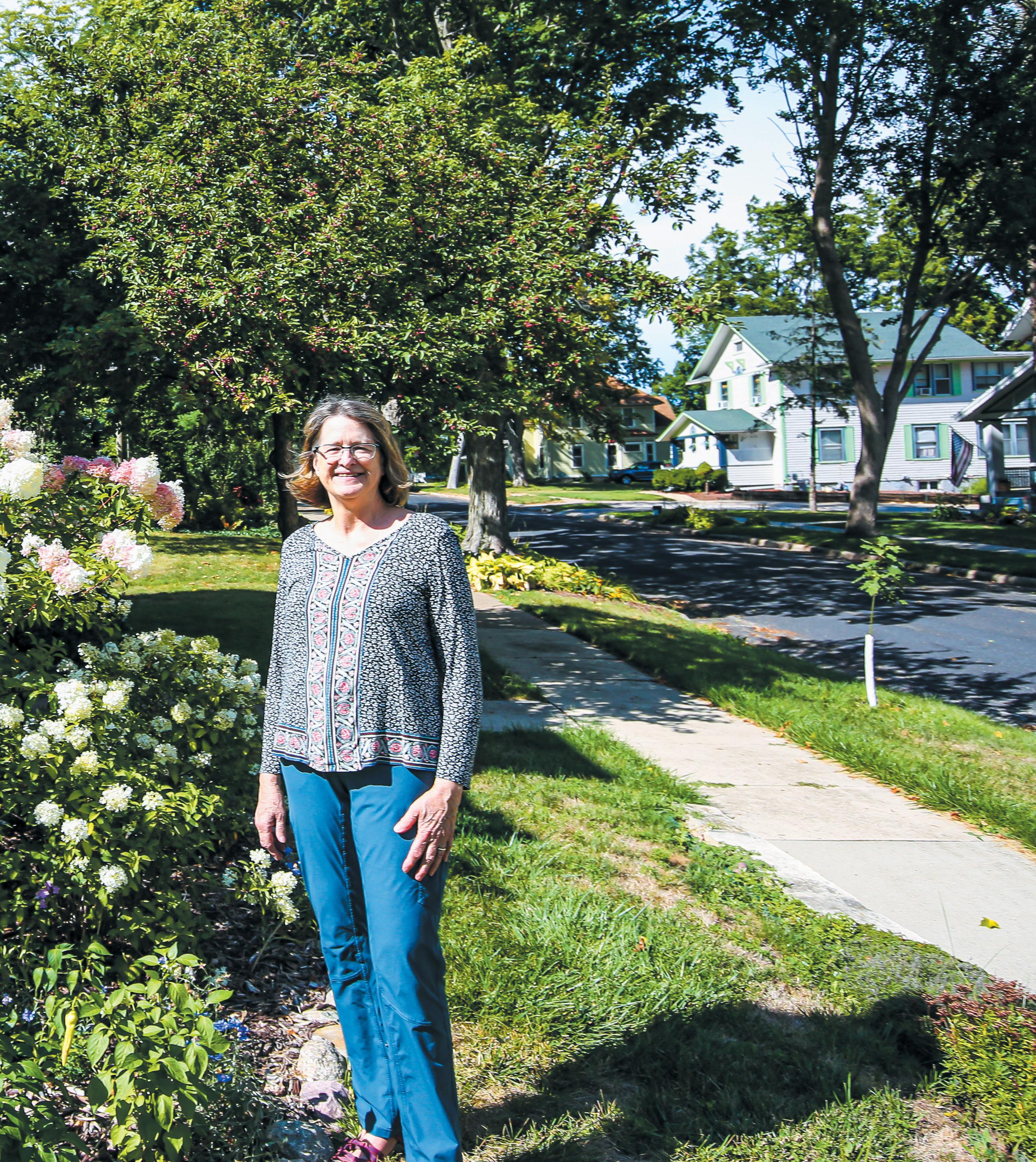
43 CORNELL REPORT | SPRING 2024
JAYDEN EPPS ’16
Theatre provided people skills
What can you do with a theatre degree? Ask Jayden Epps ’16. Since graduating, Epps has discovered that their academic theatre work and stage managing provided them with strong people management skills.
“The skills I learned and honed at Cornell in the theatre realm very specifically are a one-to-one match with what I’m doing,” said Epps, who serves as executive assistant to the director of the Illinois Department of Human Rights. “I learned how to work together toward a goal and get everyone on the same page.”
Epps’ primary work supports the Illinois Commission on Discrimination and Hate Crimes, including the launch of a hate and bias incident resource reporting helpline.
As a student Epps created an individualized major, theatre for community engagement, based largely on a devised theatre project they participated in, “Those That Fall.” Devised theatre supports a community in telling their story and fostering an opportunity for people to come together to create an original work. Epps’ major combined coursework in theatre, education, psychology, and sociology.
“Cornell and One Course At A Time are structured to be multidisciplinary, which is how I think now and how I teach other people to think,” they said. “I automatically really think broadly about who needs to be at the table, and I’m finding that not everyone thinks like that. I also find that I distill lots of information really quickly as a practice. That serves me well every time.”
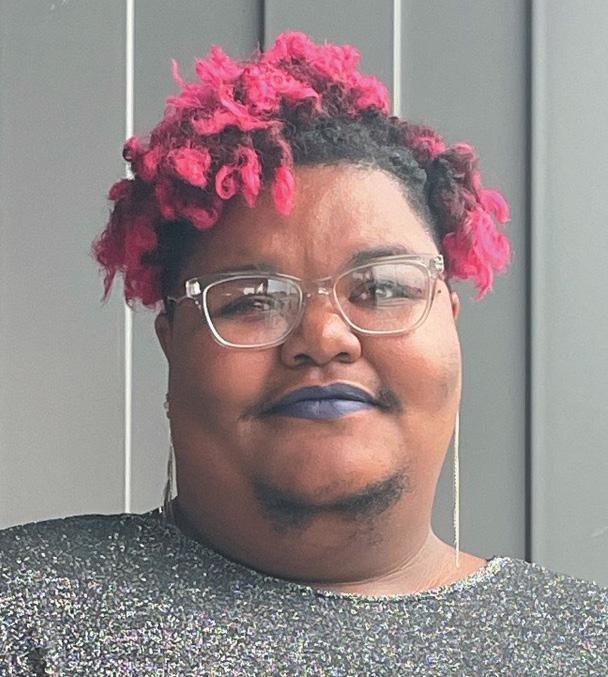
“Cornell and One Course At A Time are structured to be multidisciplinary, which is how I think now and how I teach other people to think. I automatically really think broadly about who needs to be at the table, and I’m finding that not everyone thinks like that.”
Epps was managing director, then general director, of Cornell’s Student Theatre Council (STC). In those years the STC worked hard to shift to a full season of four student-directed shows. One of Epps’ favorite Cornell memories was a dressy, end-of-year STC event on the Kimmel stage. “It was a celebration of all of the massive amount of work that we had done the year prior and the path we made to move forward,” they said.
Epps, who came to the Hilltop as a first-generation student from St. Louis, Missouri, moved to Chicago after graduation. There, Heather ‘Byrd’ Roberts ’09 connected Epps with the people who gave them their first theatre job and with whom they continue to collaborate. Epps’ stage management credits include the devised piece “Cicada Summer,” with Rough House Theatre, and “Octagon,” with Jackalope Theatre.
Their freelance stage managing meant working nine-to-five followed by rehearsal, home to bed, and getting up to do it all again the next day.
“It was unsustainable. I wanted to use my theatre skills to move forward in a social justice vein. I’m looking for a sustainable way to do all the work I want to do and am called to do,” Epps said.
They live with their fiance, Sarah Feldman ’17, a dog, and a leopard gecko. At age 30, Epps said they are most proud to be “independently self-sufficient while also having worked to surround myself with nothing but love. My best friends are Cornellians. I’ve spent so much time building a community of care around me and I’m so proud that I have found it.”
— DEE ANN REXROAT ’82
44 LIFE AFTER CORNELL
COURTESY OF JAYDEN EPPS ’16
Alumni News
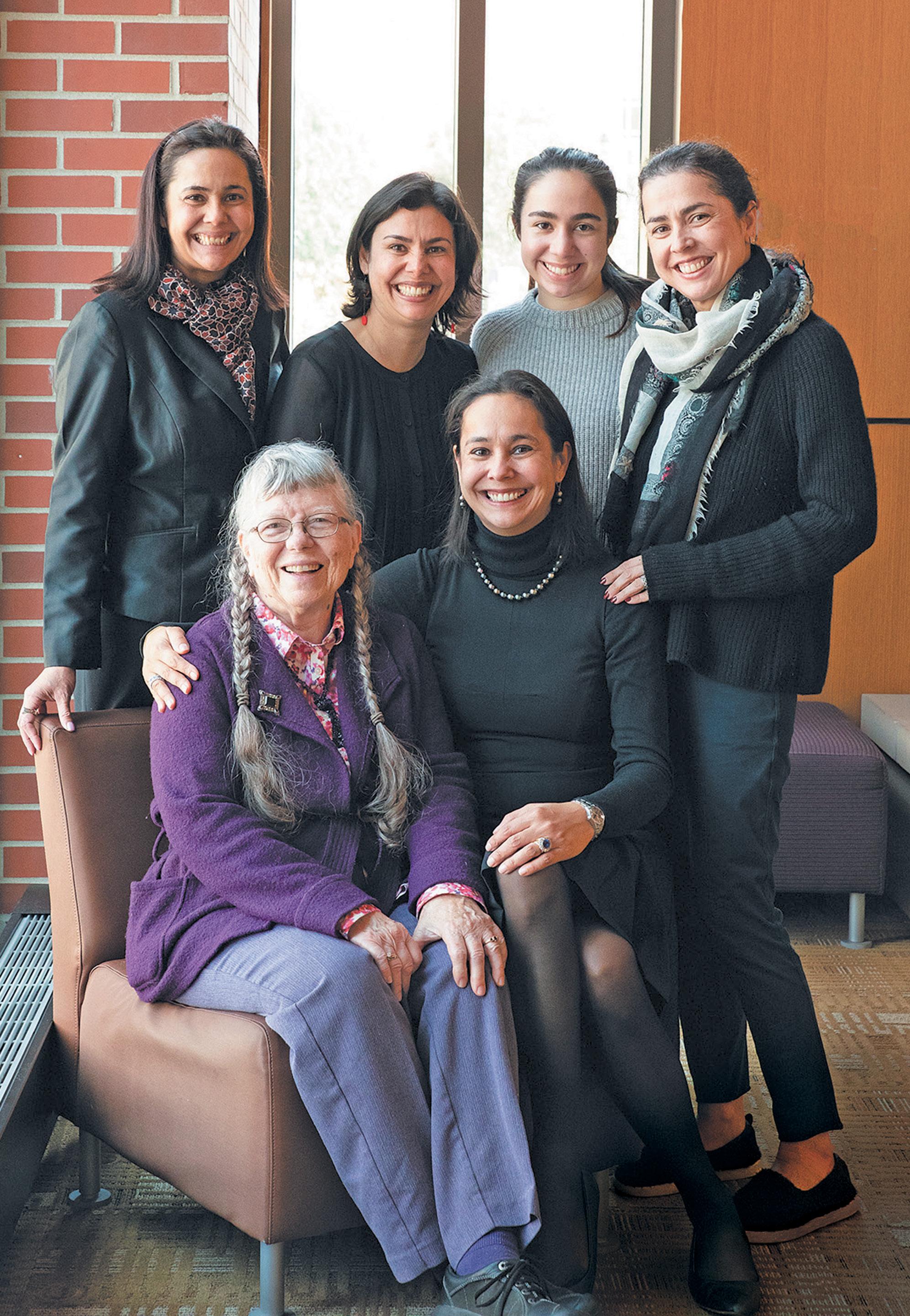
The four Iqbal sisters were among the many alumni who came to campus for Professor Emeritus of Chemistry Addison Ault’s memorial in November 2023. Ault and his wife, Janet Ault ’78, embraced and generously supported the Pakistani sisters.
ENVISAGE STUDIOS 45
CLOCKWISE FROM TOP LEFT: Rukhsana Iqbal, Roshan Iqbal ’00, Sonia Mei Hussian (daughter of Roohi Iqbal), Roohi Iqbal ’00, Ronak Iqbal, and Janet Ault. Rukhsana and Ronak attended Cornell briefly.
CONTRIBUTE
We love receiving updates. Submissions may be edited for style, length, and clarity. Submit your news to crnl.co/classnews
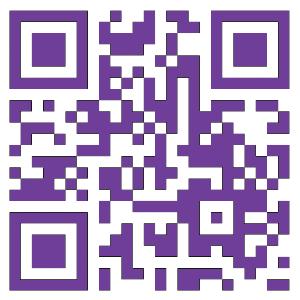
1940s
Harriet Frye Heath ’49, Winter Harbor, Maine: “I am developing a consulting practice through BetterHelp [an online mental health platform] working with clients from around the world. I feel very fortunate to be able to branch out professionally at this stage of life.”
1960s
Allan Nicholson ’60 and Marilyn Driml Nicholson ’61 , Loveland, Ohio, enjoy watching their grandson, Graham Nicholson, play football. He’s a placekicker for Miami University (Ohio) and is one of three nominees for the Lou Groza Award.
Tom Adams ’63 and Nancy Kleihauer Adams ’64 , Pequot Lakes, Minnesota, continue to be in good health. They write: “This year we built a home across the road from our lake place. Scott and Laura (son and spouse) bought the lake properties, so we still enjoy East Twin. In addition, we also now have a ‘city fix.’ We bought a condo in downtown Minneapolis overlooking the Mississippi and the Stone Arch Bridge. So we are within easy walking distance of the Guthrie Theater, many restaurants, and great trails along the river. It has been great to again feel the energy of a large city. Finally, starting in January, we will again enjoy the Kona coast in Hawaii for most of the winter.”
Tim Frazer ’63 , Concord, New Hampshire: “I’m still on earth. Learning New Testament Greek and hope to get back to Hebrew. I can still drive a nine-hour day, ride a bike, and swim twice a week. I worry about the planet that we are leaving for our grandkids. I still do Alcoholics Anonymous email outreach to prisoners. I can learn a lot from guys doing life sentences.”
John Bickel ’66 , Cedar Rapids, Iowa: “Blessed to celebrate 57 married years in October. Spent most of the warm weather months at our historic building in McGregor, Iowa, on the upper Mississippi River. Enjoy third-generation Cornellians, grandsons Jack Bickel ’24 and Will Bickel ’25 . Back in Summit County, Colorado, for the ski season where I teach skiing for Vail Resorts at Keystone.
Jack Carbee ’68 returned to his home in Marseillan, France, after several months in the U.S. During that time he joined other members of the “Seven Dwarfs” basketball team of 1968 for golf and lunch. Included were Chuck Nelson ’67, Dick Hodges ’68 , Jim Brousard ’69, Joe Campanelli ’69, and Tim DeLong ’69. Jack’s fourth novel, “The Dark Side of the Dune,” will be available at outlets and on Amazon.
Eastern Kentucky University’s College of Science, Technology, Engineering, and Mathematics recognized Professor Emeritus Barbara Ramey ’68 , Richmond, Kentucky, as part of the college’s Iconic Professor initiative. A prominent space in its science building is named for each Iconic Professor, ensuring that professor’s impact in the field of science and the teaching profession continues for generations to come.
Aleta Grillos Trauger ’68 , Nashville, Tennessee, continues to work full-time as a U.S. District Court judge in Nashville and periodically speaks remotely to President Brand’s pre-law class. She is still a member of a book group and a gourmet cooking group, both of which started in the early 1980s. She and her husband, Byron (still a full-time lawyer), enjoy having their five grandchildren, all under age 12, nearby.
Darryl Varda ’68 and Jane Bishop Varda ’69, Ada, Michigan: “Jane and I are spending the fall and winter on Anna Maria Island [in Florida] enjoying the beach, saltwater fishing, and golf.”
Tim DeLong ’69, Des Moines, Iowa: “I met Jack Carbee ’68 in Marseillan, France, in April. Jack is retired and living in Marseillan, where he is writing and publishing a variety of books from novels to children’s books. My wife and I spent five days with Jack as our guide. It was wonderful to see Jack and his beautiful small town located on the Mediterranean. Great seafood.”
Jeffrey Hicken ’69, Naples, Florida, practiced law in Minneapolis-St. Paul for 42 years. In Florida he took a creative writing course and mined his rich trove of memories for subject matter. “See You In Court” is the result, an unvarnished look at the unforgettable situations and people he encountered.
Kevin McPherrin ’69, Boca Raton, Florida, took second place in the 200-meter individual medley (75-79 age group) at the U.S. Masters Swimming Summer National Championships in July. He is also a member of the 75-79 200 freestyle relay that held the second-fastest time in the nation for 2022-2023.
John Scott Wren ’69, Denver, Colorado, got married in 1967 and transferred to the University of Denver, “where I graduated, B.A. ’69; MBA ’80; was elected president of the Graduate Student Association; and the Friday after Sept. 11, 2001, I started facilitating small dialogue groups, meeting weekly ever since, now online.” See his blog at JohnWren.com
46 ALUMNI NEWS
1970s
WEDDING
Douglas Smith ’73 to Michelle Jenkins, Nov. 17, 2023
Fred Burke ’70, Mount Vernon, Iowa, received a 2023 Mount Vernon-Lisbon Community Development Group Uptown Theater Honors award for his impact on local arts and culture. During a November gala it was noted that he provides philanthropy and behind-the-scenes support for numerous community projects, including the new performing arts complex and the new activities complex at Mount Vernon High School. He also had recently supported a high school drama trip.
Susan Morrow Petrosky ’70, Edina, Minnesota: “What do you think when you hear the word Spam? Barb Martin
MacGregor ’70, Mary Ann Mead ’70, and I decided to find out by meeting in Austin, Minnesota, at the Spam Museum. Spam was the first canned meat and saved thousands of people in the world from starvation. There are many interesting facts about Spam including why unknown calls and emails are called spam. It was a fun, one-day outing in November, and we hope to go on another adventure in the spring.”
Douglas Smith ’73 , Salt Lake City, Utah, and Tucson, Arizona: “I am happy to announce that Michelle Jenkins and I were married on the beach in Kauai, Hawaii, on Nov. 17, 2023. The tropical setting was beautiful, as was the bride. We will continue our pattern of spending summers in Salt Lake City and winters in Tucson, and we will continue to travel to exotic destinations as much as possible.
Lawrence Kuo ’74 , Breckenridge, Colorado, continues his pursuit of novel mechanisms for the treatment of pain
and prevention of opioid use disorder. In 2023 he and his partners launched an investigational new drug candidate into phase one human clinical studies.
Gordon Lind ’74 , Appleton, Wisconsin: “‘Cornell, Greater Be Thy Name’ may not be the title of my memoir, published in 2023, but I include Cornell stories that sing clearly of life-changing experiences on and off campus. From my role in Professor William Carroll’s Civilization Committee/panel discussions in the spring semester of 1972 to his questions in a medieval history class about life and death/mythology, I launched a lifelong quest for the truth of the life we all share. ‘Falling Into Light—A Lifetime of Waking Up’ is available at HenschelHAUSbooks.com and on Amazon.”
Dave Brezina ’75 , Chicago, Illinois, got a new gig job in the summer of 2023 teaching safe boating operations to members of Freedom Boat Club. He uses his experience and Merchant Mariner credentials to give members on-the-water knowledge and practice operating motorboats. Dave still practices intellectual property law and recently had an article published in the September 2023 newsletter of the Illinois State Bar Association Section on Intellectual Property Law, titled “Jack Daniels v. Bad Spaniels: Trademarks Are Not Abstract and Free Speech Doesn’t Mean You Can Say Anything You Want.”
Sharon Goodwin Fogleman ’75 , Coralville, Iowa: “My husband, Lynn, and I are thankful for good health and special times with seven healthy grandchildren, in person and virtually (one in Coralville, three in Colorado, and three in Albania). We are still able to travel internationally to train others in facilitating healing groups among traumatized people. In June 2023 we led a group of three university health students to Maua Methodist Hospital in Kenya, introducing them to medical
Tim Frazer ’63: “I can still drive a ninehour day, ride a bike, and I swim twice a week. I worry about the planet that we are leaving for our grandkids. I still do Alcoholics Anonymous email outreach to prisoners. I can learn a lot from guys doing life sentences.”
missions. Life is good! Looking ahead to our 50th Cornell reunion in 2025!”
Bob Nellis ’75 , Lake City, Minnesota: “I traveled to Belgium in October to do research for a history on immigration. More than 15,000 Belgians sailed between 1853 and 1860 and settled in one area in Wisconsin. Why they left and what they overcame is a heck of a story. I’m finally putting to use what I learned from Drs. Kollman, Heywood, and Brooks at Cornell.”
Bill Ebinger ’76 , Mequon, Wisconsin: “One of the several activities that fill my time in retirement is bicycling. This past summer I spent my 69th birthday riding RAGBRAI, the world-renowned cycling trek across Iowa, with Cornell’s Team RamBRAI, along with fellow Cornell alums Mike Lawler ’77, Tom Durham ’77, Cindy Krupa Nacco ’79, Todd White ’91 , his wife, honorary alumna Lisa White , Cornell Associate Director of Development, and Professor Emeritus Craig Allin. We all earned our 4-H badges (battled through the heat, humidity, hills, and headwinds) on the extended 50th-anniversary edition (500 miles) of this annual event.”
David Korslund ’76 , Amsterdam, Netherlands: “As I approach one year from when Rob passed away in September 2022, my life is slowly getting back to a new normal. I have enjoyed time at my home in France including a lunch with Craig Kuehl ’66 when he was in France in the spring.
I had two weeks there in the summer followed by a nice long road trip home via Barcelona, Bilbao, Bordeaux, Brittany, and Bruges. It was more than 3,000 miles driving on my own, but very enjoyable. I continue to be the treasurer for the Dutch Fulbright Commission board, as well as for the ZuiderMrkt where I am also a board member. I was asked to join the board of BRAC International BV, which is a holding company for microfinance activities in a variety of locations. I was also asked to be the chair of the advisory council for establishing equitable banking standards, a project of the Beneficial State Foundation based in Oakland, California.”
Tom Durham ’77, Scottsdale, Arizona, served as vice mayor of Scottsdale for eight months in 2022-2023. He is running for reelection to the city council in 2024 and continues to serve on Cornell’s Board of Trustees. He also teaches mock trial at Sandra Day O’Connor High School. To make up for time lost during COVID, Tom went on bicycle tours of Ireland and Portugal, and, of course, RAGBRAI. He also made trips to New York and Iceland with Martha Hemenway Durham ’78
Grant Price ’77, Warren, New Jersey: “I am retiring at the end of the year, after 33 years as an interventional radiologist in a large New Jersey practice. My wife is also retiring from her equally long medical career as a faculty member in a primary care residency. We are constantly being asked what
47
Rupert Kinnard ’79: “I have been invited to be included in the very first Black Artists of Oregon exhibit at the Portland Art Museum! I also designed the children’s activity guide for the exhibit, and created a presentation for 2nd–12th graders called ‘Creating the Superhero Within.’”
we will do without work. The answer is best represented by my brother’s answer to the same question: We will do the things we want to do and will not do the things we don’t want to do. But honestly, it is a big wide world out there. We have seen much of it, but there is always a lot more to see.”
Since retiring from serving as a deacon in the Episcopal Church, Martha Hemenway Durham ’78 , Scottsdale, Arizona, has kept busy quilting and taking care of a new dog, Ozzie, in addition to Bentley. She made trips to New York with Tom Durham ’77 and their son, Matt, to see the 4th of July fireworks from a cruise on the East River. In November she made a trip to Iceland with Tom. Shortly after they returned, the threat of volcanoes and earthquakes shut down many places they had visited.
Rupert Kinnard ’79, Portland, Oregon: “I have been invited to be included in the very first Black Artists of Oregon exhibit at the Portland Art Museum! The show opened in September and will be running until March. I have six pieces on display. I also designed the children’s activity guide for the exhibit and created a presentation for 2nd–12th graders called ‘Creating the Superhero Within.’” Rupert also shared that the Kinnard Awards were established in 2022 within the indie comics community in his honor.
1980s
Bart Seebach ’81 and Pam Nelson Seebach ’81 , Canton, Minnesota: “We spent two weeks in England and Scotland seeing as many of John Wesley’s preaching sites as possible. Our son, Peter, and I [Pam] are United Methodist pastors, so this was a pilgrimage of sorts, as well as the fulfillment of a dream. To prepare, I read John Wesley’s Journal, marking every place he preached or founded a church, then enlisted a travel agent’s help to plan the trip. It was fantastic and overwhelming in equal measure. We’re just glad we had a rental car instead of a horse!”
Heather Heusinkueld
Anderson ’83 and Andrew Lee Anderson ’87, San Antonio, Texas, returned from their 11-year missionary tour in Port Elizabeth, South Africa. After a total of 20+ years serving in The Potter’s House Christian Fellowship Church, they have returned to San Antonio, where Andy will take an evangelist position and Heather will return to teaching. They are empty nesters.
Shellie Knipfer-McClellan
’84 , Waukee, Iowa, was awarded the John Adams Award by the Iowa Association of Criminal Defense Attorneys for her commitment to excellence in the representation of criminal defendants.
Michelle Krezek ’85 , Boulder, Colorado: “Retirement is amazing! Tommy and I have time for lots of travel adventures, including spending five months traveling to, from, and around Alaska in our campervan. This included a visit with Steve Anderson ’85 at his house in Ninilchik. It was great to catch up with Steve, do a little fishing, and take in the view of the three volcanoes across Cook Inlet from Steve’s house. We were also able to connect with Diana Daskalos Corcoran ’87 and Mitch Corcoran ’87 in Canada for some hiking and brewery touring. As we headed from Boulder to South Carolina for the winter, we stopped in Iowa City and met with Carol Bear Warren ’85 , Scott Warren ’83 , and Lisa Schwien ’85 Then onto Douglas, Michigan, for a Friendsgiving hosted by Liana Overley Allison ’89 and her husband Tom. It was a great get-together with the Corcorans, Elizabeth Heffernan ’88 , and Mo Johnson ’87, including yummy food, amazing bluegrass music, cribbage lessons, and a rousing game of Around the World ping pong!”
David Syring ’89, Duluth, Minnesota: “I co-edited (with Lauren Miller) ‘The Routledge Companion to the Anthropology of Performance.’ The book was published in November of 2023. The publisher’s description: “The book provides a cuttingedge, comprehensive overview of the foundations, epistemologies, methodologies, key topics and current debates, and future directions in the field. It brings together work from the disciplines of anthropology and performance studies, as well as adjacent fields.’”
1990s
WEDDING
Danielle Nelson ’96 to Kennedy Omonuwa, Aug. 5, 2023
Annie Gregory Reneau ’97, Pullman, Washington: “I work as associate editor at Upworthy. This summer I launched the Upworthy Book Club to explore books that bring out the best in humanity. On the same day I interviewed actor and author Rainn Wilson for the book club, I joined Vice President Kamala Harris and Joy Reid in a roundtable discussion about the Dobbs decision and reproductive rights on MSNBC’s ‘The ReidOut’ show—a wild but exciting day! My husband and I celebrated our 25th wedding anniversary in August, and this fall, we enjoyed traveling to London, Athens, and Vienna with our three kids, one of whom graduated from college this past spring and another who graduated from high school and community college.”
Jen Klein O’Keefe ’98 , Morehead, Kentucky, was named Distinguished Researcher for 2023 at Morehead State University. The award recognizes faculty and staff for their service to the campus community and their fields of study. She is also the 2023 Distinguished Service Award recipient from AASP-The Palynological Society and among the geoscientists elected Fellows of the Geological Society of America in 2023.
2000s BIRTHS
Frederick “Freddy” Charles Wagoner, July 9, 2023, to John Wagoner ’05 and Lydia Wagoner
Brooks Franklin Hess-Roberts, Jan. 6, 2024, to Gabrielle Reed-Hess ’07 and Matt Roberts ’09
Ada Vivian Thompson, Sept. 20, 2023, to Amber Gerth Thompson ’07 and Andrew Thompson
48 ALUMNI NEWS
Lori Parks ’00, Cedar Rapids, Iowa: “Well, it’s happened. After 20+ years of loving and trusting a Chevy Blazer, I have had to trade it in for a minivan lifestyle. No, not due to hauling around a bunch of athletic or social kids—but due to my priorities of loving and helping rescue dogs that need large crates and lower points of entry! My ’08 Blazer told me it did not want to live through another Iowa winter, and the new models are too small to hold the large crates I already have. That, along with the greatness that is a sliding side door for those with low mobility, made me bite the bullet. It’s been about a month now, and it still feels like a rental car to me, but it has served its purpose more times than I thought it would in this short span, taking my own 13-year-old lab to the ER vet, and my foster dog to a meet-and-greet and vet 40+ miles away. The things we do for those we love, huh?!”
Heather Carmichael
Scoville ’00, Ladora, Iowa: “I met Delia Lamore ’00 and Bronwyn Raben ’00 (went to Cornell our freshman and sophomore years) to travel around Ireland and the U.K. We spent two weeks traveling and taking tours of Ireland, England, Wales, and Scotland. When we got back, I found out I was elected to the Cornell Alumni Association Board of Directors starting in the spring of 2024. I am looking forward to representing the class of 2000 on the board as we plan alumni events.
Chris Meuleners ’02 , Brooklyn Park, Minnesota: “I started running again after 25 years when my wife was diagnosed with leukemia in 2017. This last year or two, I have made huge progress in both races and fundraising for cancer research and caregiver support. With the Twin Cities Marathon canceled, I headed up to Ashland, Wisconsin, for
the Whistlestop Marathon. Not a PR, but a solid Boston qualifying time and third-place Masters! COVID regrettably prevented me from joining in the Jack’s Caregiver Coalition Big Give event, but our story was still told. My wife gave a heartfelt speech and my in-laws were there to receive the Jean Accius II Caregiver Award on my behalf. In all, the event raised over $125,000, and I have joined the committee to lead the new Storm Chasers program for caregivers in crisis. We ended the summer with a trip to San Diego. In a last-minute decision, I joined the Temecula Half Marathon and was able to pick up my first overall race win!”
Anna Norstedt ’02 , St. Paul, Minnesota: “I am worried about the current state of the world but personally things are getting better. I started therapy and resumed going to the gym. I found that community ed ballet helps with lumbar pain. I will celebrate

my nephew’s birthday at a cabin where I will meet their family’s new puppy. We would typically celebrate the holidays in January, but we will be in Bermuda at that time.”
Jacob Smith ’03 , Monrovia, California: “An action movie I wrote called ‘Prepare To Die’ is in post-production and will be on Tubi at the beginning of the new year. Also just finished up two commissioned scripts to be released by The Asylum in 2024. One is currently filming, and the other will be filmed in February.”
Andrea Bachelier ’05 , Waterloo, Illinois: “I graduated with a master of arts degree in human resources in May 2023, and received my SHRM-CP certification in July 2023. Currently I am working as an HR business partner for Allsup Employment Services, Allsup Veterans Disability Services, and all shared services (marketing, IT, sales, account management).”
& REUNION WEEKEND OCTOBER 4-6, 2024 Learn more at crnl.co/homecoming HOME OMING
49
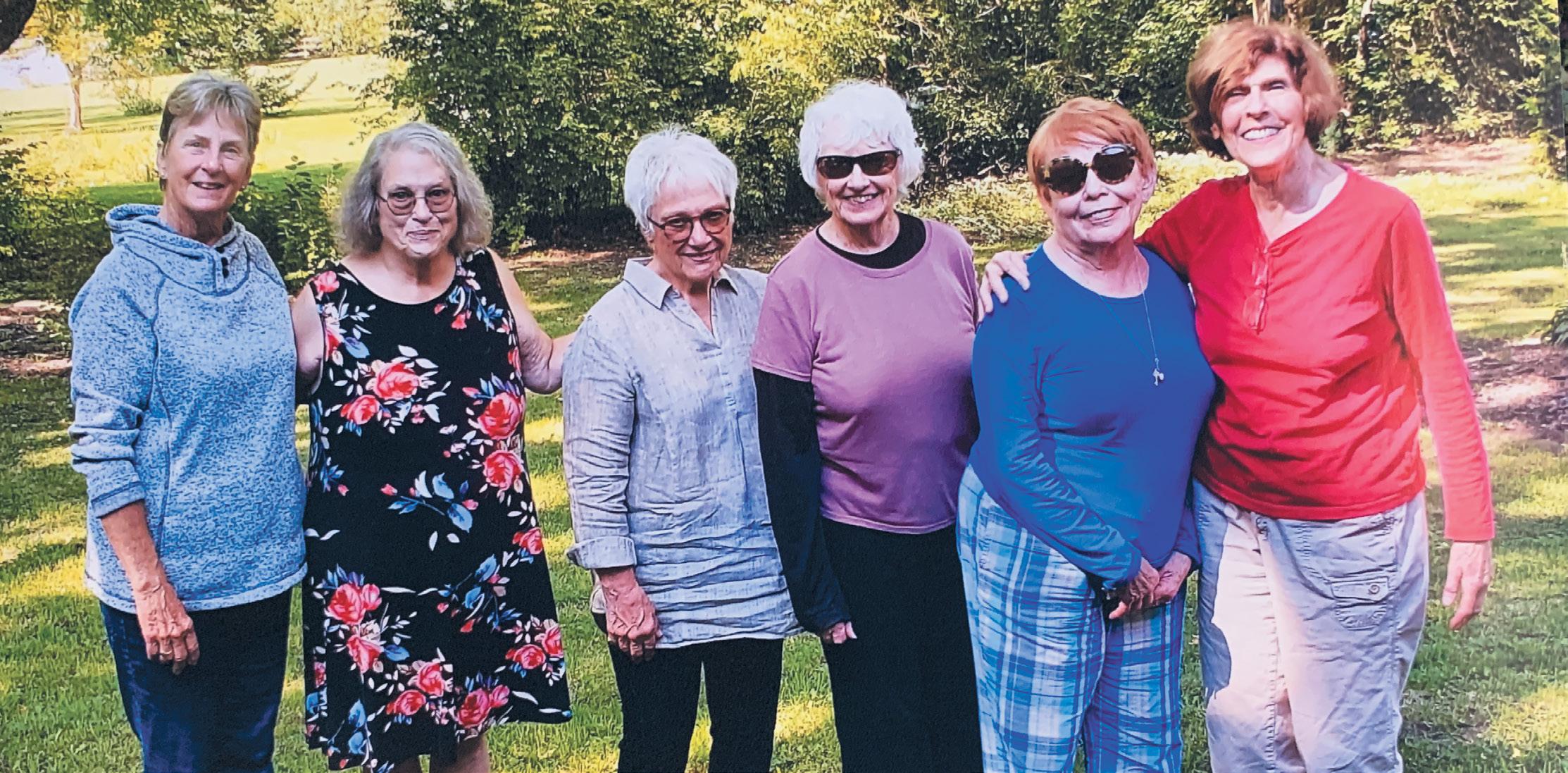
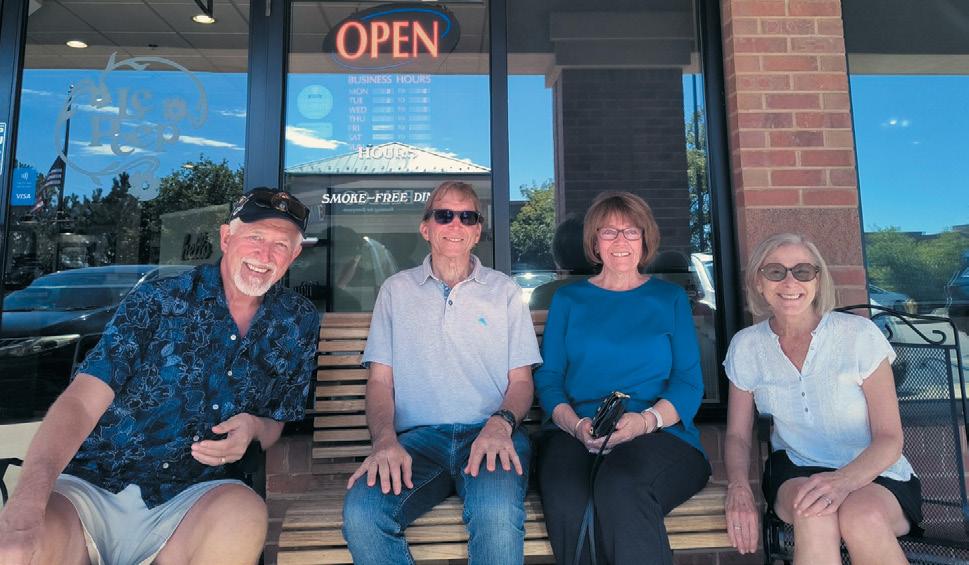
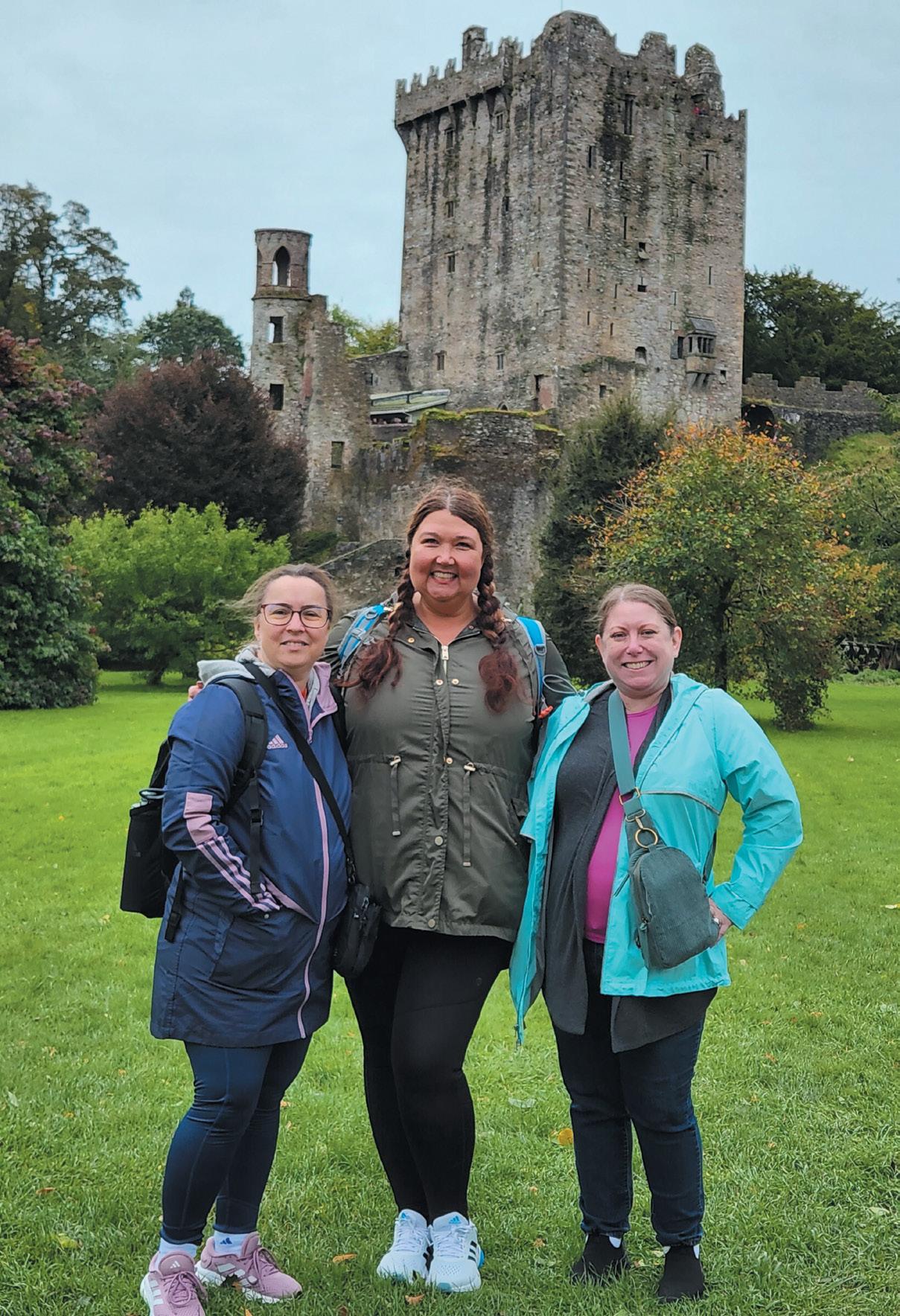 Delia Lamore ’00, Bronwyn Raben ’00, and Heather Carmichael Scoville ’00 (from left) traveled for two weeks in Ireland, England, Wales, and Scotland.
Cornellian friends for more than 50 years met in September. FROM LEFT: Marcus Pohlmann ’72, Dave Balster ’69, Barb May Balster ’72, and Barb Heimann Pohlmann ’72.
COURTESY OF HEATHER CARMICHAEL SCOVILLE ’00
COURTESY OF MARCUS POHLMANN ’72
These Alpha Sigma Pi Arrow sisters recently celebrated their 80th birthdays and 62 years of friendship. Since 1985 they’ve gathered in each others’ homes about every other year. From left: Marilynn Slater Hrouda ’65, Hilary Goslin Blake ’65, Judy Orr Flanagan ’65, Nancy Redenbaugh Maples ’65, Mary Geisinger Nakayama ’65, and Chris Vestermark Bruun ’65.
Delia Lamore ’00, Bronwyn Raben ’00, and Heather Carmichael Scoville ’00 (from left) traveled for two weeks in Ireland, England, Wales, and Scotland.
Cornellian friends for more than 50 years met in September. FROM LEFT: Marcus Pohlmann ’72, Dave Balster ’69, Barb May Balster ’72, and Barb Heimann Pohlmann ’72.
COURTESY OF HEATHER CARMICHAEL SCOVILLE ’00
COURTESY OF MARCUS POHLMANN ’72
These Alpha Sigma Pi Arrow sisters recently celebrated their 80th birthdays and 62 years of friendship. Since 1985 they’ve gathered in each others’ homes about every other year. From left: Marilynn Slater Hrouda ’65, Hilary Goslin Blake ’65, Judy Orr Flanagan ’65, Nancy Redenbaugh Maples ’65, Mary Geisinger Nakayama ’65, and Chris Vestermark Bruun ’65.
50 ALUMNI NEWS
COURTESY OF NANCY REDENBAUGH MAPLES ‘65
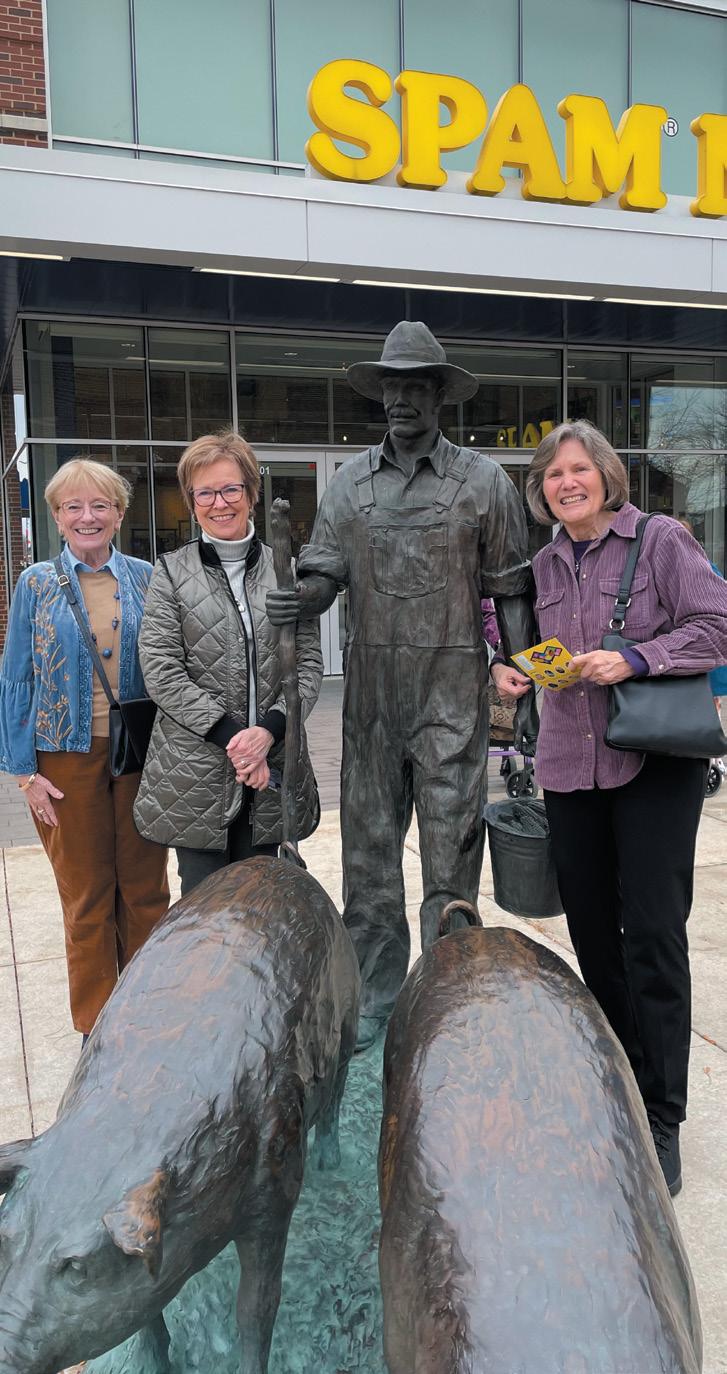
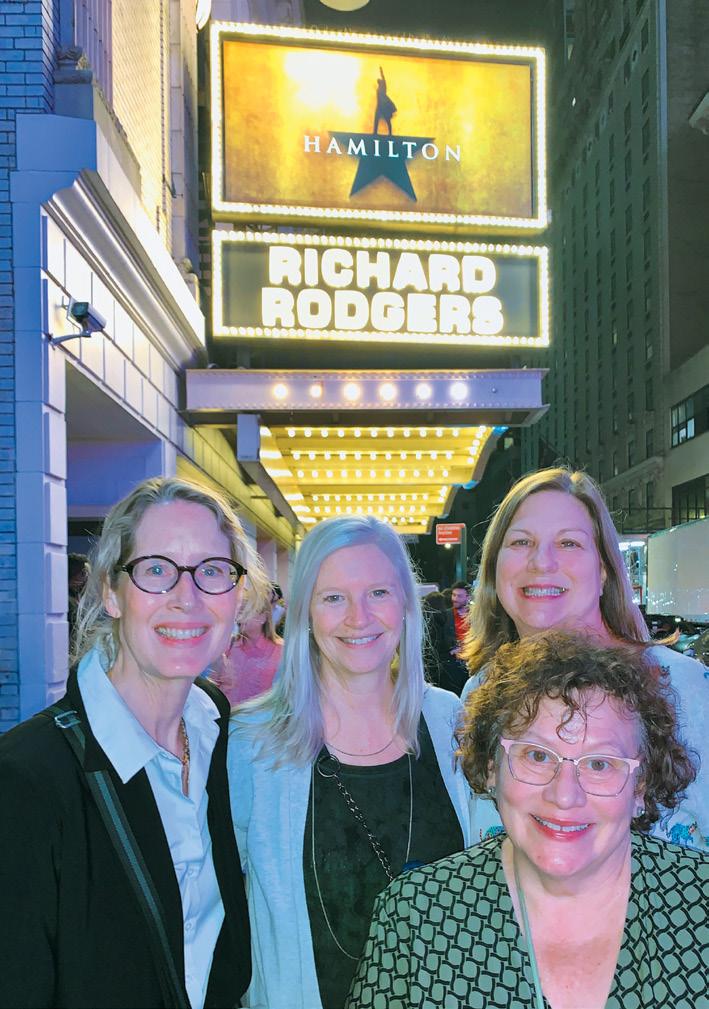
Dee Ann Rexroat ’82, Bambi Hull Riesen ’82, Rae Lynn Jenkins Jirsa ’82 (from left), and Britt LaBissoniere ’82 (front) converged on Times Square— and later, upstate New York—for fun that included seeing “Hamilton” on Broadway. At the National September 11 Memorial & Museum they were greeted by collections cataloguer Stephanie Schmeling Johnson ’09. Missing at the last minute from the trip was Karin Kadlec Barthel ’82.
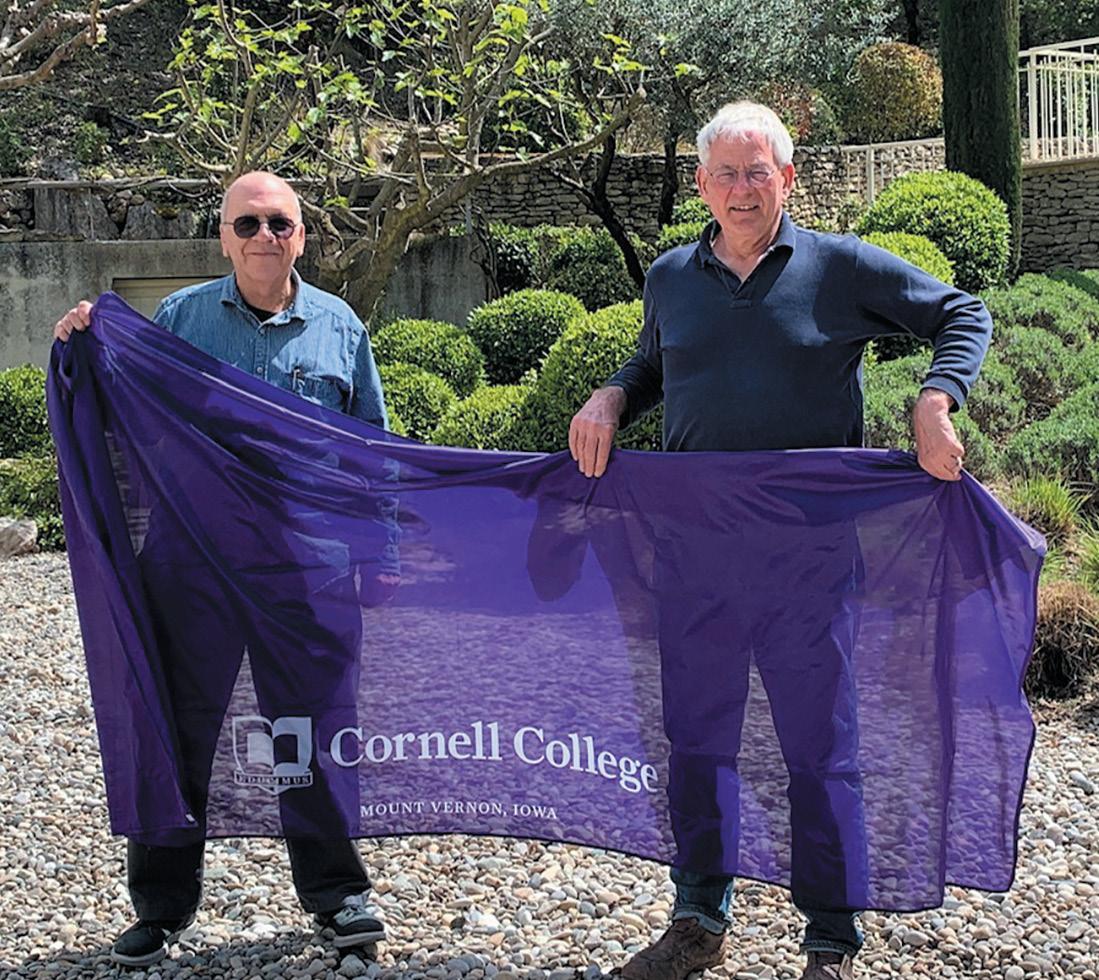
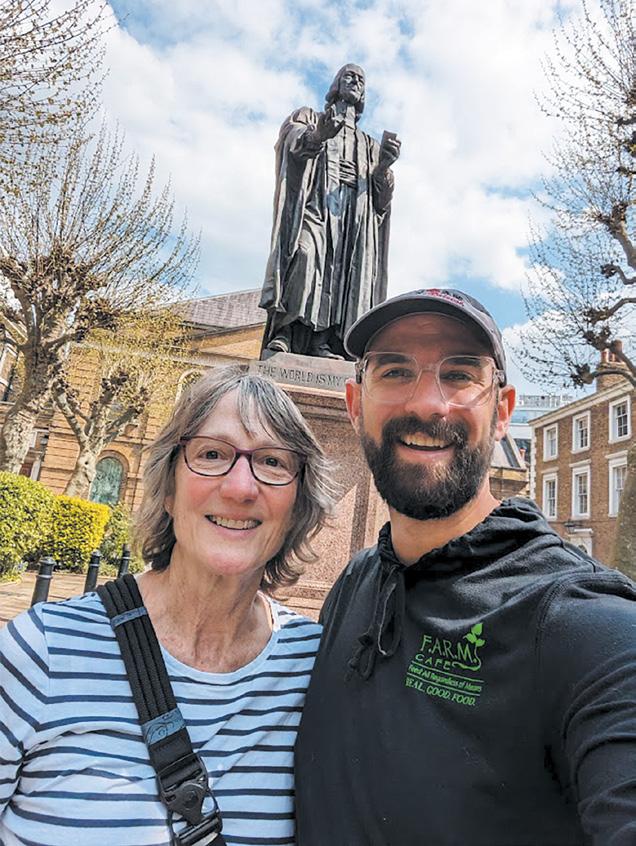
Pam Nelson Seebach ’81, Bart Seebach ’81 (not pictured), and their son Peter spent two weeks in England and Scotland seeing as many of John Wesley’s preaching sites as possible. Pam and Peter are United Methodist pastors, and Pam created this pilgrimage marking every place he preached or founded a church. Here Pam and Peter are with the statue of John Wesley at Wesley’s chapel and home in London.
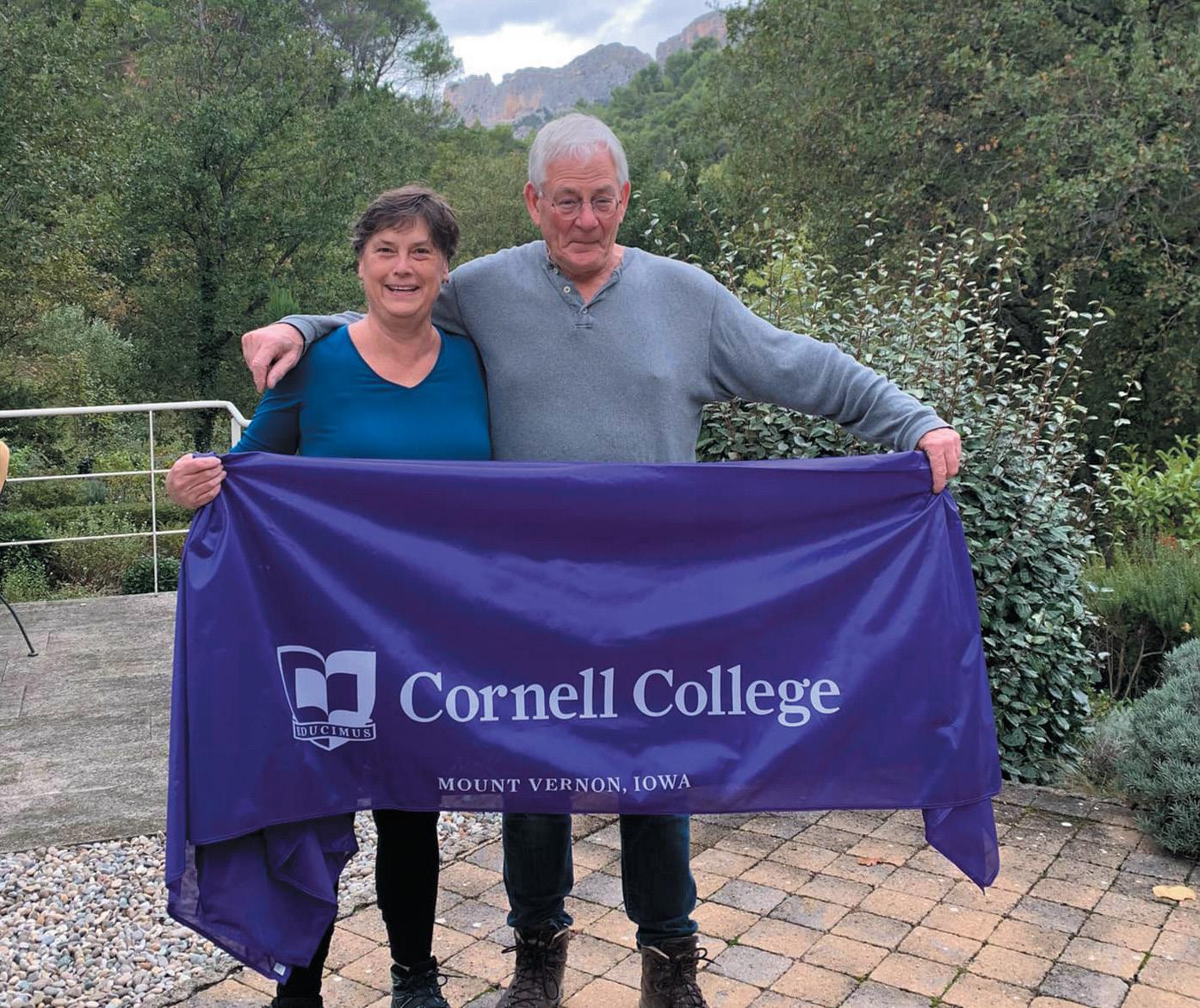 FROM LEFT: Susan Morrow Petrosky ’70, Barb Martin MacGregor ’70, and Mary Ann Mead ’70 toured the Spam Museum in Austin, Minnesota. Among the many things they learned: Spam was the first canned meat and saved thousands of people worldwide from starvation.
LEFT: In May Craig Kuehl ’66 (left) visited David Korslund ’76 in France during a trip to the south of France, where they flew the Cornell colors. RIGHT: While touring France in a camper last November, Barbara Phifer ’77 (left) and her husband (not pictured) stopped by and stayed with David Korslund ’76 for a few days for a wonderful time catching up.
COURTESY OF SUSAN MORROW PETROSKY ’70
COURTESY OF DEE ANN REXROAT ’82
BART SEEBACH ’81
FROM LEFT: Susan Morrow Petrosky ’70, Barb Martin MacGregor ’70, and Mary Ann Mead ’70 toured the Spam Museum in Austin, Minnesota. Among the many things they learned: Spam was the first canned meat and saved thousands of people worldwide from starvation.
LEFT: In May Craig Kuehl ’66 (left) visited David Korslund ’76 in France during a trip to the south of France, where they flew the Cornell colors. RIGHT: While touring France in a camper last November, Barbara Phifer ’77 (left) and her husband (not pictured) stopped by and stayed with David Korslund ’76 for a few days for a wonderful time catching up.
COURTESY OF SUSAN MORROW PETROSKY ’70
COURTESY OF DEE ANN REXROAT ’82
BART SEEBACH ’81
51 CORNELL REPORT | SPRING 2024
COURTESY OF DAVID KORSLUND ’76
UNRESTRICTED IMPACT
EVERY DAY Cornellians make a lasting impact on the world in classrooms, boardrooms, and research labs. Cornell students learn to become world-changers because of your unrestricted support to the Cornell Fund.
Like the block plan, the Cornell Fund provides the college with the flexibility to meet students where they are and ensures they excel on campus and beyond. The impact you have through your unrestricted gift to the Cornell Fund makes all this possible.
Please consider making a gift before June 30 at crnl.co/give

Unrestricted thinking supported by unrestricted giving:
Support the Cornell Fund
Alexandra Myers ’05 , San Diego, California: “We bought a new house and moved to the suburbs! We live within 10 minutes of the cousins and grandparents and are loving it! We see Marc Myers ’05 almost every week.”
Marc Myers ’05 , Los Alamitos, California: “I am happy to report that being an uncle to Alexandra Myers ’05 ’s new baby son, Reed, has been the highlight of my year. My wife Kristin and I have been fortunate enough to travel to several countries this year, including Denmark in the fall and Mexico in the spring. I truly love my work as a senior VP financial consultant at Charles Schwab and love spending time with my dog Bode. Life has treated me well.”
John Wagoner ’05 , Williamsburg, Virginia: “Our second son, Frederick Charles Wagoner, was born July 9, 2023. I started a new job as the museum mount maker for the Art Museums of Colonial Williamsburg Foundation.”
Dustin Waite ’06 , Sacramento, California: “In 2002 I lived three doors down from Marja Sainio ’06 in garden level Pfeiffer. She went on to get her master’s degree in international policy and live in Venezuela. I’ve bounced back and forth from the environmental and education fields while living in multiple places. When the pandemic hit we both found ourselves in California and decided to meet for coffee in Pismo Beach. Welp, now we live together in Sacramento. Marja works for the California Department of Social Services as a contracts supervisor, and I’m back in the environmental field with the California Department of Toxic Substances Control. We both enjoy getting up to Tahoe for the winter season. Marja recently started volunteering for an organization called Lasagna Love where she makes lasagna for people in need and absolutely loves perfecting her recipe while also giving back. I just published my second travel memoir, ‘Falling in
Love with The Process.’ We have a white boxer named Tuula.”
Gabrielle Reed-Hess ’07, Cedar Rapids, Iowa: “2023 was a year of big changes for Matt Roberts ’09 and me! We welcomed our first child, Brooks Franklin Hess-Roberts, on Jan. 6, 2024. And in August, I said a very bittersweet goodbye to the Hilltop for the second time, leaving my position of nearly 10 years in Alumni and College Advancement for a similar role at Coe (hold the boos, please!) as advancement data systems manager. While I miss many things at Cornell, Coe has welcomed me with open arms and I’m settling in very well and looking forward to continued change in 2024!”
Amber Gerth Thompson ’07, Overland Park, Kansas, gave birth to Ada Vivian on Sept. 20, 2023. She writes: “Ada joins her big brothers, Emmett (6) and Avery (1), and big sister, Evelyn (4). She is never without a willing participant to hold her.”
Halley Yates Repasch ’09, Goose Creek, South Carolina, graduated with a master’s degree in library and information science from the University of South Carolina in August. She is now working as a children’s librarian for Charleston County Library’s newly opened Keith Summey North Charleston Library.
2010s
WEDDINGS
Andrew Decker ’10 to Grace Feinberg, July 23, 2023
Shire Feingold ’11 to Justin Ferrari, July 2, 2023
Carlie Ruffalo ’14 to Ian Paja, Oct. 7, 2023
Jackie Sernek ’14 to Ethan Yoder, Aug. 19, 2023
Sylvia Donahoo ’16 to Kenneth Horowitz, Oct. 1, 2022
52
BIRTHS
Sage Nowak, March 18, 2023, to Allie Jagielo Nowak ’11 and Chase Nowak ’12
Kodi Gratz, July 7, 2023, to Dan Gratz ’12 and Kerbee Koehler Gratz ’13
Theodore Peter Stumo-Langer, May 26, 2023, to Katlyn Arndt ’15 and Nick Stumo-Langer
Elizabeth Erickson ’11 , Colorado Springs, Colorado: “Started a new job at Colorado College. Finished my Ph.D. in earth science at the University of California-Santa Barbara. Adopted a Maine Coon mix kitten who is a joy. Otherwise just enjoying being back in Colorado, ski season, and being closer to family.”
Allie Jagielo Nowak ’11 and Chase Nowak ’12 , Plover, Wisconsin, welcomed the birth of their daughter Sage on March 18, 2023, and also moved to Plover from Minneapolis, Minnesota, to be closer to Allie’s family.
Diego Verdugo ’12 , Phoenix, Arizona, received national recognition from InvestmentNews, a national industry magazine. In 2023 he was named to their inaugural Hot List of wealth professionals who support underserved groups and the next generation of wealth professionals and who make a tangible difference within their communities and farther afield.
Charlie Egan ’13 , Hinesville, Georgia, and his wife, Holly, finalized the adoption of their four children on June 8, 2023.
Kerbee Koehler Gratz ’13 and Dan Gratz ’12 , Austin, Texas, welcomed their second daughter, Kodi, to the family on July 7, 2023.
Jackie Havens ’14 : “Started a new job as a content strategist at Propeller Aero, a drone software company located in Denver, Colorado, and will be moving to the Denver area in early 2024.”
Lucee Rakowitz-Leyja ’14 , San Antonio, Texas, accepted a position as a licensed clinician with San Antonio’s local mental health authority, The Center for Healthcare Services. In January of 2024 Lucee will be starting her journey to becoming a certified sex therapist. On a personal note, Lucee and her husband, Arthur, joyfully celebrated the seventh anniversary of their first date and the second anniversary of their wedding on Oct. 14, 2023. In celebration, the couple hosted a small party with their polycule, closest friends, and family members.
Carlie Ruffalo ’14 , Portland, Oregon: “I got married to Ian Paja on Oct. 7, 2023, in Portland, Oregon. Many Cornellians were in attendance.”
Justin Futrell ’16 , Denver, Colorado: “Hey gang, I’m doing my 6th annual fundraiser for clean water! If you want to donate, Venmo TanzaniaWaterFund. Every $6 brings water to one more person. Over the last five years, Pull-ups for Tanzania has brought clean water to 50,000 people! And so many Cornellians have been a part of it! Join me! Text 740-525-5259 with questions.”
Carly Pierson ’17, Tucson, Arizona, began her master’s degree in environmental science and policy at Northern Arizona University in fall 2023.
Marshall Hobson-Ritz ’18 , Bellevue, Washington, successfully completed a post-baccalaureate bachelor of science program in astronomy at the University of Washington in 2023.
Alina Moore ’22 works at the Albuquerque BioPark Zoo and Aquarium as a life support specialist dealing with the water quality around the park to keep the animals alive. “I am learning about the importance of life support at a zoo and who truly makes a difference behind the scenes.”
Hannah Robertson ’18 , Cardiff, Wales: “I finished my master’s degree in international journalism from Cardiff University in 2019 and have recently returned to Cardiff, Wales, to live with my fiance. I currently work remotely for a news organization in Colorado called the Local NEWS Network.”
First Lieutenant Matt Stone ’19, USAF Pilot (MQ-9 Reaper), is stationed at Cannon Air Force Base in Clovis, New Mexico.
Jocelyn Torres ’19, Chula Vista, California, graduated with a master’s degree in neuroscience and developmental disabilities.
2020s
Lukas Meyer ’21 , St. Paul, Minnesota, started a new job at Community Action Partnership of Ramsey and Washington Counties in September.
Robert Petrie ’21 , Minneapolis, Minnesota: “I am pursuing a master of science in oncology from the University of Florida College of St. Simeon Salos. I will graduate in December of 2025.”
Amelia Ayers ’22 , Sacramento, California: “I started a new job as a physical scientist with the U.S. Geological Survey and moved to Sacramento, California. I also have two new pet rats.”
Alina Moore ’22 , Taos, New Mexico: “I started a job at the Albuquerque BioPark Zoo and Aquarium as a life support specialist dealing with the water quality around the park to keep the animals alive. The animals I mainly work around include polar bears, penguins, elephants, tigers, and Steller’s sea eagles. I am enjoying learning more about the importance of life support at a zoo and who truly makes a difference behind the scenes at zoos and aquariums. A lot of people (including the keepers) don’t realize the impact our job has on keeping these animals alive. I can’t wait to find out where it takes me in life.”
Greta Henderson ’23 : “I’m currently living in Germany as a Fulbright recipient teaching English at a Grundschule (elementary school). On my days off I take advantage of the 49 euro per month train ticket that lets me travel anywhere in Germany, traveling both alone and with new friends!”
Avelene Schesser ’23 , Littleton, Colorado: “Headed to James Cook University in Australia this spring to get a master’s degree in marine biology.”
53 CORNELL REPORT | SPRING 2024

Losses
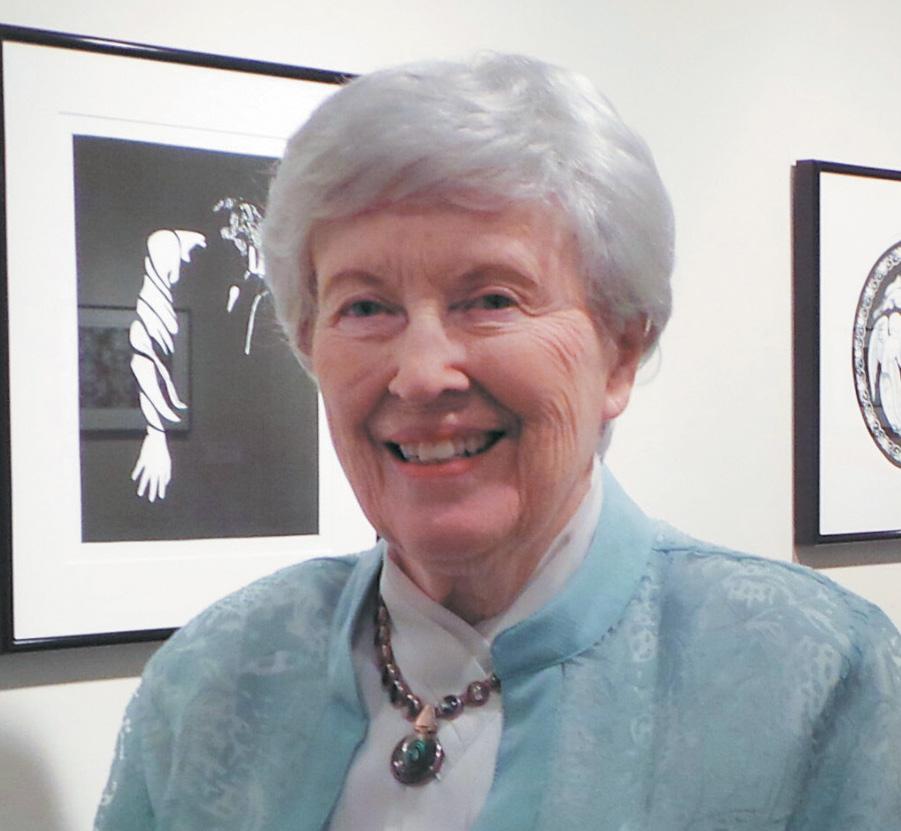
Nancy Jane Price ’46
Poet and novelist Nancy Jane Price ’46, author of the 1987 suspense novel “Sleeping With the Enemy,” died Nov. 20, 2023, at age 98.
When she was a teenager her family settled in Cedar Falls, Iowa, where her father, Malcolm Price, became president of Iowa State Teachers College, later known as the University of Northern Iowa (UNI). Following Cornell she married and began teaching at UNI. She studied with poets John Holmes and Philip Booth, attended the University of Iowa Writers’ Workshop, and received a master’s degree from UNI.
The Poetry Society of America gave her their annual award in 1967. In 1968 she took a leave from teaching to pursue fiction, writing in a small upstairs room before her three children woke each morning.
Price published more than a dozen novels, with translations in 18 languages. She also published more than 100 poems and stories and received a National Endowment for the Arts fellowship and residencies in Italy, France, and Ireland. Her third novel, “Sleeping with the Enemy,” was made into a 1991 movie starring Julia Roberts.
John, her eldest son, died in 2005. She remained in Cedar Falls, close to her two remaining children, and continued writing. She finished her final novel, set in Cedar Falls, in the last year of her life.
Price is survived by her two children, Catherine Thompson ’74 and David.
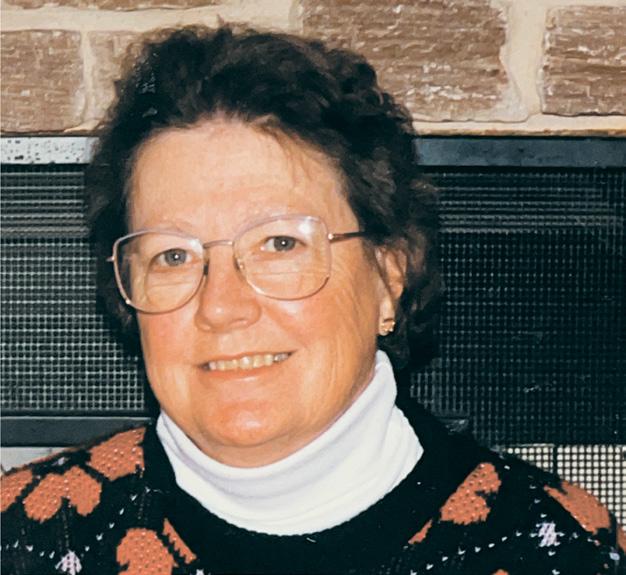
Marion Lorraine Hill Collins ’53
Marion Lorraine Hill Collins ’53, whose Time Magazine job out of college launched a lifelong writing career, died at age 91 on Sept. 15, 2023, in Billings, Montana. She was still writing timely commentaries for the Daily Montanan at age 90.
Collins majored in English and French and wrote for The Cornellian. She moved to New York City after graduation, where she became an editorial researcher for Time Magazine, later recalling, “I had a glamorous job, but I didn’t like it. Women weren’t allowed to write for the magazine so I left.” She returned to her home state of South Dakota to teach high school English and journalism and served as her Cornell Class Agent for the next 20 years.
Collins became a humor columnist for Marriage and Family Living, authored the book “What’s A Place Like This Doing to a Nice Girl Like Me?”, and chaired the South Dakota Commission on the Status of Women in the 1970s. When her family moved abroad due to her husband’s work, she became assistant editor of the Singapore American Newspaper and, from London, published in British newspapers and magazines. Back in the U.S. she published mystery short stories in magazines, became a South Dakota Public Radio commentator, and in 2018 published a mystery novel, “Safe House.”
She is survived by her two daughters, a son, four grandchildren, and three great-grandchildren.
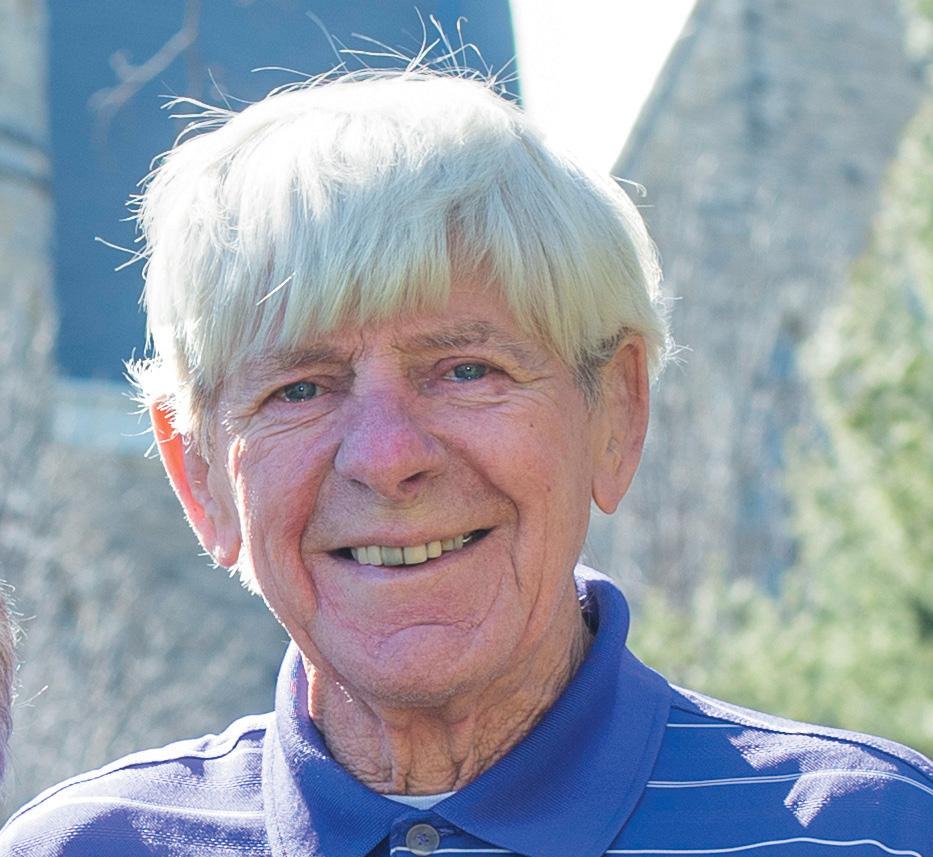
Robert Majors ’57
Robert “Bob” “Maj” Majors ’57, longtime Cornell fundraiser and alumni director, died at age 88 on Oct. 25, 2023, in Mount Vernon, Iowa.
At Cornell he was a Delt, president of the Letterman’s Club, and a championship wrestler—winning three Midwest Conference Championships and the 1954 Nebraska AAU Championship.
He began his career as a teacher and coach in Sweet Home, Oregon, serving as head wrestling coach and assistant football and baseball coach. His wrestling team won the state championship in 1958, and he developed a wrestling program at the elementary school level that rapidly spread throughout the state. He and his team earned another state title after he moved to Portland, Oregon, as head wrestling coach.
Majors left his coaching career and returned to Iowa in 1962. His love of wrestling never wavered, though, and he started the youth wrestling program in Mount Vernon, serving more than 30 consecutive years as a volunteer coach.
He was a Cornell staff member for 32 years, from 1966 to 1998, serving as director of the Annual Fund, director of development, director of alumni affairs, and director of planned giving and major gift solicitations. He was elected to the Cornell Athletics Hall of Fame and honored in 2002 with a Leadership & Service Award.
He and his wife, Jan, were both widowed when they married in 1978. He is survived by his wife, two sons and two stepsons, six grandchildren, and four great-grandchildren.
54 ALUMNI NEWS
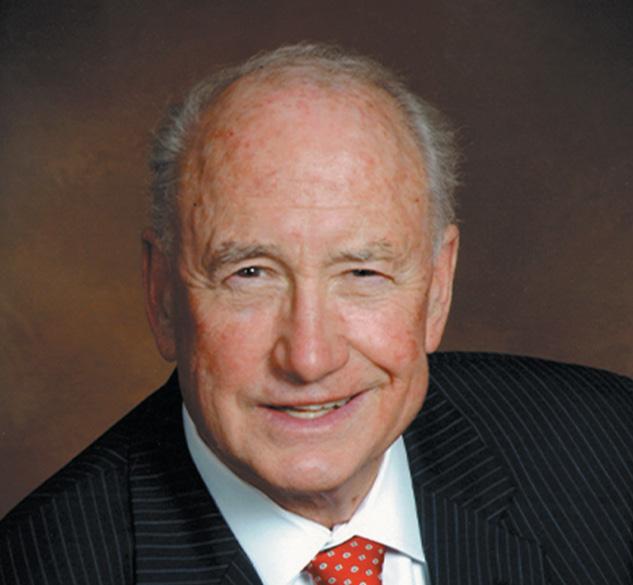
John Beamer ’61
Marathon runner and former Assistant U.S. Attorney in the Southern District of Iowa John Evans Beamer ’61 died Nov. 19, 2023, in Des Moines. He was 84.
Beamer studied sociology and economics at Cornell and was captain of the swim team. He earned a degree from the University of Iowa College of Law, then was sworn in as a special agent with the FBI, assigned first in Seattle, Washington, then Los Angeles and Santa Monica, California, where he conducted investigations for White House appointments and the National Security Council.
In 1970 he became the Assistant Attorney General for Iowa, heading the civil division for seven years. In 1972, he was appointed Special Iowa Assistant Attorney General in charge of the Iowa Tort Claims Division, defending the state in civil litigation. Subsequently, he was appointed Chairman of the Public Employment Relations Board, serving as chief labor law judge for the state. In 1986 Beamer became an Assistant U.S. Attorney in the Southern District of Iowa assigned to the civil division and later, the general criminal division. He retired in 2018 after 32 years.
Beamer ran 22 marathons, three of them the Boston Marathon, with an achievement of running a 2:54 hour marathon at the age of 45.
He is survived by his wife, Phyllis; a son and daughter; three step-children; five grandchildren; 10 step-grandchildren; and six step-great-grandchildren.

Bettyglenn Jensen Osincup ’41 , Washington, Iowa, Nov. 27, 2023
Jeane Shotwell Cheverton ’44 , Lake Oswego, Oregon, Oct. 28, 2022
Marcia Bacon Conner ’47, Mechanicsburg, Pennsylvania, Dec. 12, 2023
Lois “Loie” Stewart Renner ’47, Geneva, Illinois, Dec. 28, 2023
Judith Russell Salisbury ’47, Winston-Salem, North Carolina, Dec. 2, 2023
Mary Carol Plattenberger Lambertsen ’48 , Martelle, Iowa, Nov. 16, 2023
Margaret Barnes Brinkmeyer ’49, St. Louis, Missouri, Dec. 17, 2023
Dorothy Slater Grafft ’49, Princeton, Illinois, Dec. 30, 2023
Mary Schneider Wine ’49, Des Moines, Iowa, Jan. 29, 2024
Gretchen Zieman Stuhr ’50, Cedar Rapids, Iowa, Jan. 7, 2024
Richard Wardell ’50, Scottsdale, Arizona, Nov. 10, 2023
Darleen Langhoff Weber ’51 , Franklin, Tennessee, Aug. 4, 2023
William Montgomery ’53, Annapolis, Maryland, Dec. 31, 2023
Barbara Baumhoefener Pesch ’53, Chilmark, Massachusetts, May 21, 2023
Mary Jo Mitchell Voss ’53, Grundy Center, Iowa, Nov. 24, 2023
Louise Cobb Kant ’54 , Carmel, Indiana, Sept. 30, 2023
Barbara Klein Johnson ’56, Surprise, Arizona, Nov. 29, 2023
Karen Brand McNeil ’56, Hampton, Virginia, Jan. 10, 2024
Craig Sidles ’56, Flagstaff, Arizona, Nov. 27, 2023
Larry Hawes ’58, Dixon, Illinois, Jan. 28, 2024
Elwood Hart ’59, Ames, Iowa, Feb. 2, 2024
Gary Thompson ’60, Lakewood, Colorado, Dec. 12, 2023
Cigdem Turkes Akkurt ’61 , Romeoville, Illinois, June 21, 2023
Addendum
William Hackett ’61 , Wheaton, Illinois, Jan. 22, 2024
Almeda Garn Maynard ’61 , Chicago, Illinois, Jan. 3, 2024
James Page ’61 , Spring, Texas, Oct. 12, 2023
Robert Challis ’62 , Corvallis, Oregon, Jan. 18, 2024
Carol Smith ’62 , Ankeny, Iowa, Dec. 4, 2023
Eric Sund ’63, Frankfort, Indiana, Jan. 12, 2024
Ann Hatch Raymond ’64 , Brunswick, Maine, Nov. 14, 2023
Lois Renter ’65 , Cedar Rapids, Iowa, Dec. 9, 2023
Carol Erlandson Hock ’66, Phoenix, Arizona, Aug. 10, 2023
Eugene “Rick” Schmidt ’66, Algonquin, Illinois, July 22, 2023
Mary Paulson Beimborn ’69, Minnetonka, Minnesota, Nov. 18, 2023
Stephen Koser ’69, North Liberty, Iowa, Nov. 20, 2023
Elizabeth Kelly Winger ’69, Edina, Minnesota, Dec. 4, 2023
Deanne Bishop ’71 , Newport, Oregon, Jan. 8, 2024
Victoria Brownlee Wittgraf ’71 , Cherokee, Iowa, Jan. 26, 2024
John Mewaldt ’72 , Racine, Wisconsin, Oct. 8, 2023
Jeffrey Torricelli ’77, Port Huron, Michigan, Jan. 23, 2024
Glenda Wooten Evans ’78, West Point, Mississippi, Sept. 12, 2023
David Corsini ’81 , Alexandria, Virginia, Sept. 6, 2023
Joyce Strand ’84 , Waukee, Iowa, Feb. 2, 2024
Katherine “Katie” Buswell ’03 , Coralville, Iowa, Dec. 27, 2023
David Barsotti , Honorary Alumnus, Englewood, Colorado, March 9, 2023
Carey Downs Gibson , Honorary Alumna, Denver, Colorado, Jan. 28, 2024
Richard J. Watkins , assistant professor of chemistry, 1970–1977, Waukesha, Wisconsin, Jan. 22, 2024
Former Associate Dean of Students Robin Reid, whose obituary appeared in the fall 2023 issue, was an honorary alumnus of Cornell.
55 CORNELL REPORT | SPRING 2024
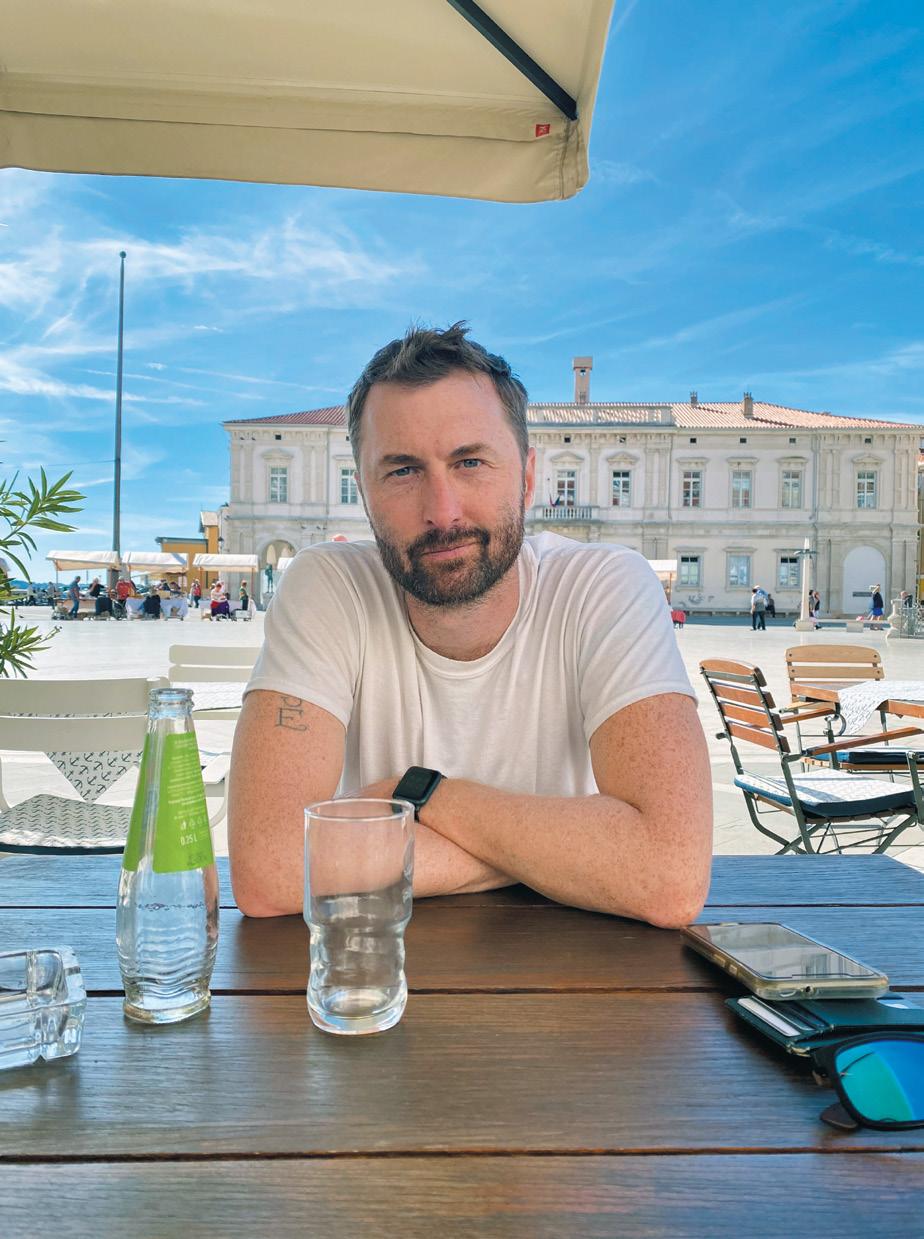
MARJASAINIO ’06
How did we get here?
By Dustin Waite ’06
While brainstorming a topic for this essay, I was also waiting for a chicken sandwich at a restaurant in Sacramento while watching a white boxer dog through my phone’s camera app. How did I end up here?
I could attribute my path to several decisions I’ve made, but the most likely culprit for my current situation is my liberal arts education from Cornell. Bear with me.
I was born at Mercy Medical Center, a mere 13 miles from Pfeiffer Hall, where, 18 years later, I would inhabit the coed garden level and quickly switch my proposed majors of religion and philosophy to geology and environmental studies (under the tutelage of Garvin, Denniston, Greenstein, and Walsh)—fields that catapulted my wanderlust to far-off exotic lands like New Zealand and Australia. A considerable change of scenery from the rolling cornfields of Iowa.
I lived in the woods, in my car, in an RV, and, for a time, out of a storage locker. I traveled and lived abroad in Peru, India, Mongolia, Honduras, Nicaragua, and El Salvador. I bought every airline ticket I could afford to just keep moving. I attempted to shed my connection to this high-energy, capitalistic world because it never felt right to me. Despite all my efforts, even while I was sitting on a tropical beach with no other responsibilities, my cup, yet again, felt empty.
The most likely culprit for my current situation is my liberal arts education from Cornell. Bear with me.
After graduation my initial pursuits were drawn to the science fields. Though, not surprisingly, I had no clue what I wanted to do with the rest of my life in my early 20s. For that reason I packed my bags, uncorked my liberal arts potential, and tried my hands at other vocations. From teaching to restaurants and even to curating museum displays. My attempts to find happiness in life took me across the United States while connecting with old friends and making new ones. Yet, even as I would fill my emotional cup to the brim with exciting new experiences, some days it still felt empty. As a result, I packed my bags again. And again. And again.
At the height of the pandemic, once more I began packing my bags to figure out what I wanted to do for the rest of my life. I was back in California and reconnected with another Cornell alum for a cup of coffee. The butterfly effect of her path from Mount Vernon to that coffee shop included graduate school and even living in Venezuela. Mutually curious, we continued to build a relationship. You see, I wasn’t alone while I was waiting for my chicken sandwich.
Marja Sainio ’06 was next to me, waiting for her pizza, and we have been living together for over two years in Sacramento with a white boxer dog named Tuula. A blossoming relationship, the seeds of which would have never bloomed if we both hadn’t been assigned to live in garden-level Pfeiffer in 2002. My cup is full.
Dustin Waite ’06 lives in Sacramento, California. He’s an environmental scientist with the California Department of Toxic Substances Control. He’s published two travel memoirs, “External” and “Falling in Love with The Process,” that detail his adventures while trying to figure out what to do with the rest of his life.
56 LAST WORD
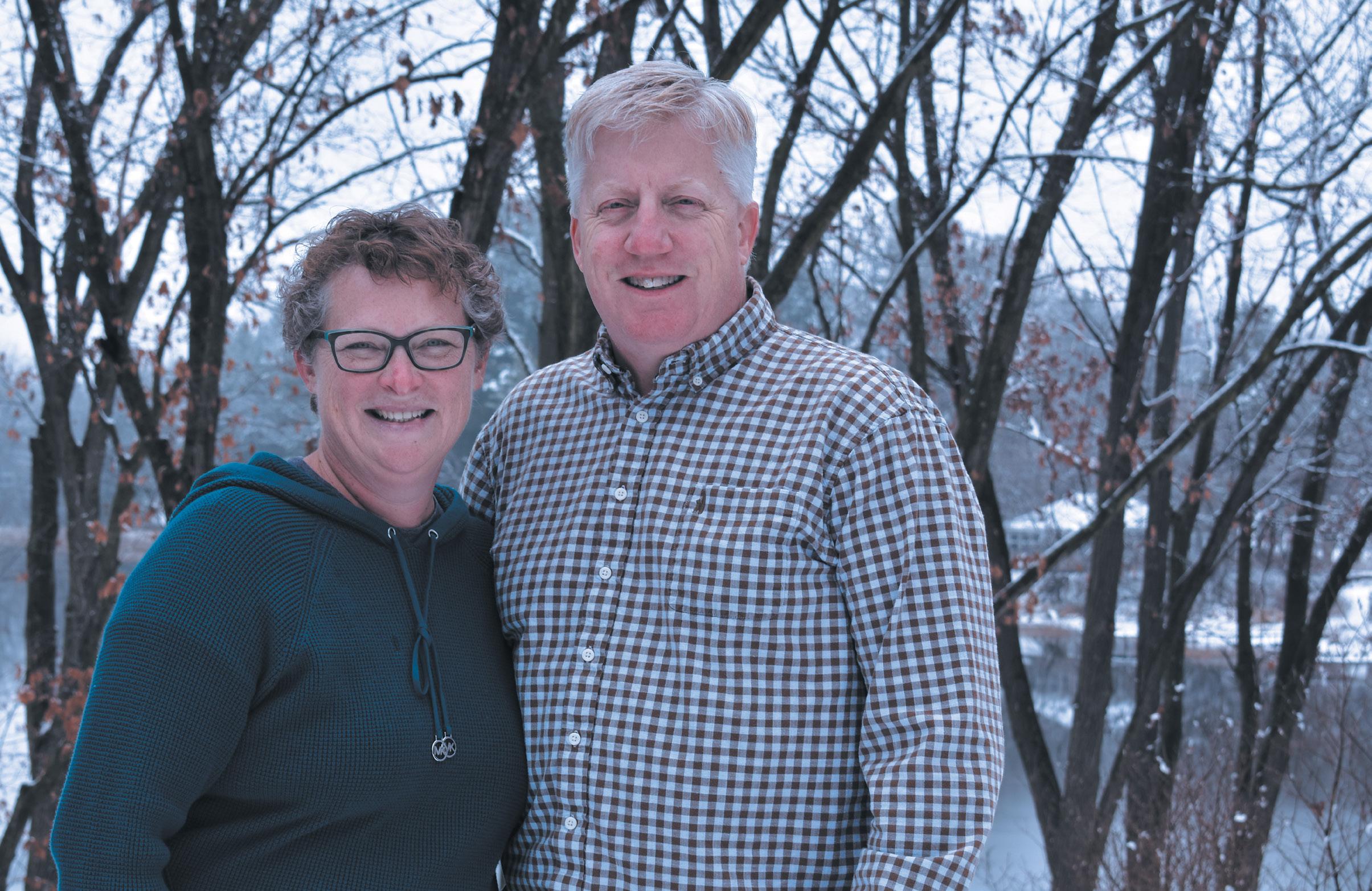
As a Cornell student Dave Edwards ’87 studied in Cole Library, often until closing time. Val Stahl Edwards ’87 worked at the circulation desk. When Val had closing duties, Dave began walking back to the residence halls with Val and her roommate, Robin Dye Wall ’87. Those walks ultimately led to Dave and Val’s marriage in 1988. Recently their lives came full circle when they chose Cole Library for an estate gift.
“Cornell was important to us. It’s where we met, and libraries are a huge part of Val’s life. We’re lucky to have the opportunity to name Cornell in our estate planning, knowing it’s someplace we can have an impact. This gift will allow future generations of students to advance their education.”
—Dave Edwards ’87
For more information about giving through your estate, visit crnl.co/giftplan (or use the QR code), or contact Director of Planned Giving Tom Hanschman ’88, 319.895.4335 or thanschman@cornellcollege.edu

Your legacy. Cornell’s future.
Val Stahl Edwards ’87 and Dave Edwards ’87
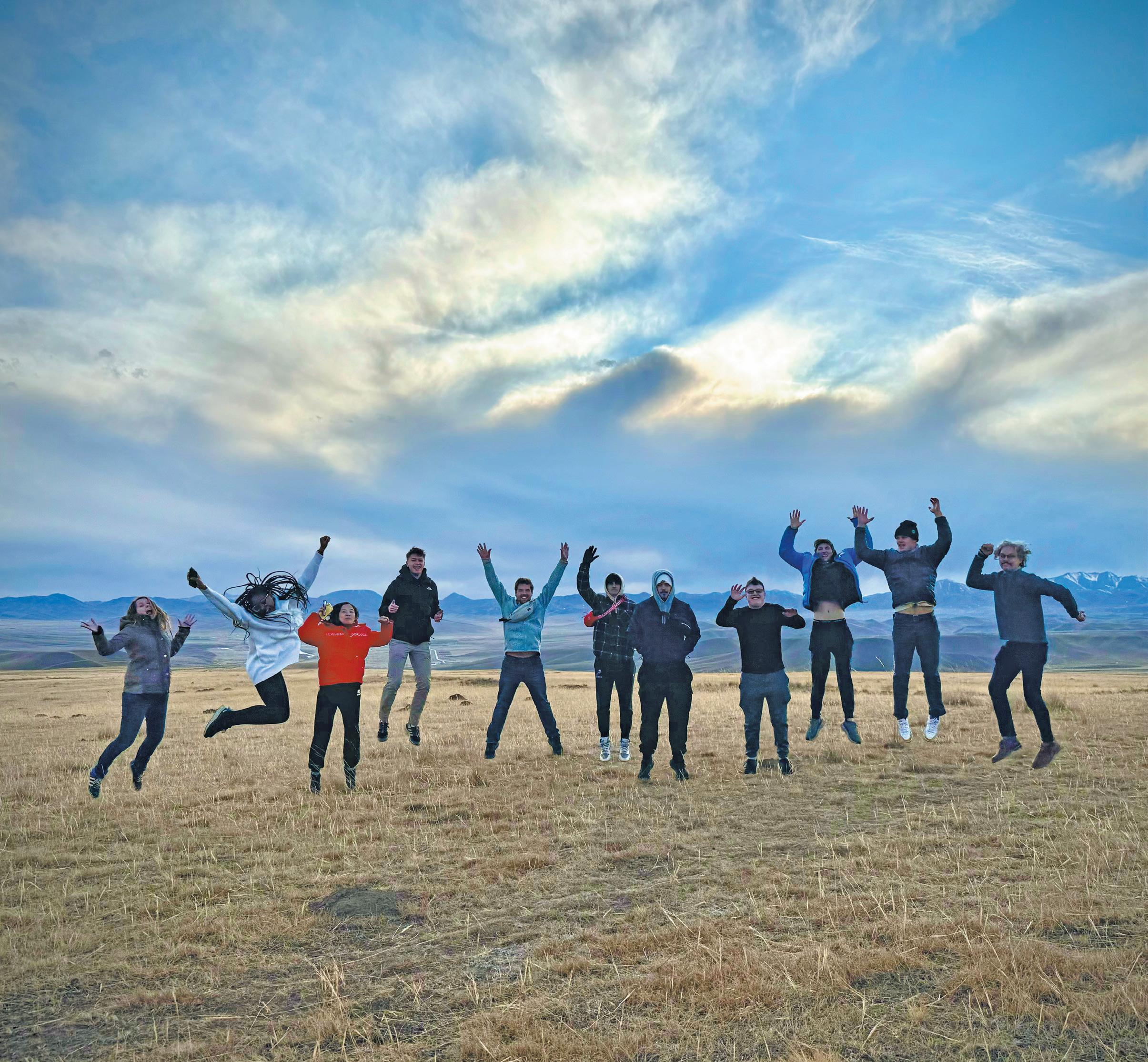
Students in the Block 5 course Traveling Economists jump for joy to be studying abroad once again. David Joyce Professor of Economics Todd Knoop took the class to China, where they were the first American student group ever to visit the Gannan Tibetan Autonomous Prefecture. Their host was a nomad yak farmer who now runs a textile and clothing business that employs other Tibetan nomads.
NON-PROFIT ORG. U.S. POSTAGE PAID CORNELL COLLEGE 600 FIRST STREET SW MOUNT VERNON, IA 52314–1098 YAN LIANG
























 Julia Clark ’06 is the founding director of NOMAD Science Mongolia Inc., leading cultural preservation research projects to Mongolia.
PHOTO COURTESY OF JULIA CLARK ’06
Julia Clark ’06 is the founding director of NOMAD Science Mongolia Inc., leading cultural preservation research projects to Mongolia.
PHOTO COURTESY OF JULIA CLARK ’06





















 By Dee Ann Rexroat ’82 Photography by Megan Amr
By Dee Ann Rexroat ’82 Photography by Megan Amr





















 Delia Lamore ’00, Bronwyn Raben ’00, and Heather Carmichael Scoville ’00 (from left) traveled for two weeks in Ireland, England, Wales, and Scotland.
Cornellian friends for more than 50 years met in September. FROM LEFT: Marcus Pohlmann ’72, Dave Balster ’69, Barb May Balster ’72, and Barb Heimann Pohlmann ’72.
COURTESY OF HEATHER CARMICHAEL SCOVILLE ’00
COURTESY OF MARCUS POHLMANN ’72
These Alpha Sigma Pi Arrow sisters recently celebrated their 80th birthdays and 62 years of friendship. Since 1985 they’ve gathered in each others’ homes about every other year. From left: Marilynn Slater Hrouda ’65, Hilary Goslin Blake ’65, Judy Orr Flanagan ’65, Nancy Redenbaugh Maples ’65, Mary Geisinger Nakayama ’65, and Chris Vestermark Bruun ’65.
Delia Lamore ’00, Bronwyn Raben ’00, and Heather Carmichael Scoville ’00 (from left) traveled for two weeks in Ireland, England, Wales, and Scotland.
Cornellian friends for more than 50 years met in September. FROM LEFT: Marcus Pohlmann ’72, Dave Balster ’69, Barb May Balster ’72, and Barb Heimann Pohlmann ’72.
COURTESY OF HEATHER CARMICHAEL SCOVILLE ’00
COURTESY OF MARCUS POHLMANN ’72
These Alpha Sigma Pi Arrow sisters recently celebrated their 80th birthdays and 62 years of friendship. Since 1985 they’ve gathered in each others’ homes about every other year. From left: Marilynn Slater Hrouda ’65, Hilary Goslin Blake ’65, Judy Orr Flanagan ’65, Nancy Redenbaugh Maples ’65, Mary Geisinger Nakayama ’65, and Chris Vestermark Bruun ’65.




 FROM LEFT: Susan Morrow Petrosky ’70, Barb Martin MacGregor ’70, and Mary Ann Mead ’70 toured the Spam Museum in Austin, Minnesota. Among the many things they learned: Spam was the first canned meat and saved thousands of people worldwide from starvation.
LEFT: In May Craig Kuehl ’66 (left) visited David Korslund ’76 in France during a trip to the south of France, where they flew the Cornell colors. RIGHT: While touring France in a camper last November, Barbara Phifer ’77 (left) and her husband (not pictured) stopped by and stayed with David Korslund ’76 for a few days for a wonderful time catching up.
COURTESY OF SUSAN MORROW PETROSKY ’70
COURTESY OF DEE ANN REXROAT ’82
BART SEEBACH ’81
FROM LEFT: Susan Morrow Petrosky ’70, Barb Martin MacGregor ’70, and Mary Ann Mead ’70 toured the Spam Museum in Austin, Minnesota. Among the many things they learned: Spam was the first canned meat and saved thousands of people worldwide from starvation.
LEFT: In May Craig Kuehl ’66 (left) visited David Korslund ’76 in France during a trip to the south of France, where they flew the Cornell colors. RIGHT: While touring France in a camper last November, Barbara Phifer ’77 (left) and her husband (not pictured) stopped by and stayed with David Korslund ’76 for a few days for a wonderful time catching up.
COURTESY OF SUSAN MORROW PETROSKY ’70
COURTESY OF DEE ANN REXROAT ’82
BART SEEBACH ’81










